Here’s our look at the Trump administration and the rest of Washington:
- Price resigns under pressure, the first Trump cabinet secretary to leave
- Tillerson says U.S. is in direct contact with North Korea about missile talks
- Trump, at his golf club, assails Puerto Rican mayor who criticized him
- Share via
Violence! Sex! Defiance! Trump’s over-the-top presidency has changed the rules for prospective candidates
Roy Moore was twice ousted from the Alabama Supreme Court for flouting the U.S. Constitution. Now he’s on a path to become the state’s next U.S. senator.
Scott Wagner accosted a videographer recording him as he campaigned for Pennsylvania governor. He’s since won the endorsement of Stephen K. Bannon, the president’s political alter ego, and is a strong contender to win the GOP nomination.
Kid Rock, the country-rapper-rock star whose resume includes a sex tape, Waffle House brawl and enough raunchy lyrics to fill a pornographic novel, was treated as a serious prospect for Senate in Michigan until he removed himself from consideration Tuesday in characteristically colorful fashion.
“… no, I’m not running for Senate,” he said in an expletive-laden announcement on Howard Stern’s SiriusXM radio show. “Are you … kidding me?”
- Share via
Trump assails ‘politically motivated ingrates’ as San Juan mayor renews pleas for more help
President Trump on Sunday morning assailed “politically motivated ingrates” for criticizing the speed and scope of the federal recovery effort in the wake of Hurricane Maria, while praising first responders, the military, Puerto Rico’s governor and federal workers.
His remarks were in a series posts on Twitter, just as on Saturday morning when Trump first unleashed attacks on his critics in Puerto Rico from his New Jersey golf resort. While less acidic than those a day earlier that drew a strong backlash, the tweets signaled that Trump is comfortable keeping the furor alive.
Maria, a Category 4 storm, devastated Puerto Rico, whose 3.4 million residents are U.S. citizens. It struck on Sept. 20, hard on the heels of hurricanes Harvey and Irma, which raked Texas and Florida respectively. Puerto Rico, too, was picking up after Irma’s damage even as Maria slammed it.
In the first of two dozen tweets on Saturday, Trump attacked the “poor leadership” of the mayor of ravaged San Juan, who had criticized him in pleading for more aid, suggested that Puerto Ricans officials were “not able to get their workers to help” and said islanders “want everything to be done for them.”
San Juan Mayor Carmen Yulin Cruz, appearing Sunday on ABC’s “This Week,” for a second day declined to respond directly to Trump’s personal criticism of her, saying: “There’s only one goal, and that’s saving lives.”
Cruz also said she appreciated the efforts of responders, including those from the Federal Emergency Management Agency, but felt they had not been given sufficient means to help those in the most dire need. For example, she said, people were being told to register online for aid, but very few have access to the internet.
“I recognize the good heart that the FEMA people have, and they want to help,” she said. “They just don’t have the resources.”
Trump’s defenders have cited enormous logistical obstacles and the heavy strain placed on responders by the two previous hurricanes. William “Brock” Long, the FEMA administrator, pointed Sunday to round-the-clock efforts to repair the electrical grid and get basic supplies like food and water to cut-off areas.
“We’ve pushed everything into that island that we can,” said Long, also interviewed on “This Week.” Asked about Trump’s suggestion that Puerto Ricans were not doing enough to help themselves, Long said, “I believe in the Puerto Ricans. They’re pulling their weight.”
Long pointed to the “Herculean effort” being made to help the island and its people recover, but conceded: “We got a long way to go.”
- Share via
Trump lashes out at Puerto Ricans after mayor’s criticism of administration’s relief effort
From the comfort of his New Jersey golf resort, President Trump lashed out Saturday at the mayor of San Juan, Puerto Rico, and the ravaged island’s residents, defending his administration’s hurricane response by suggesting that Puerto Ricans had not done enough to help themselves.
Trump’s Twitter assault, which began early Saturday and lasted until evening, was set off by criticism from Mayor Carmen Yulin Cruz, who on Friday had criticized the federal response since Hurricane Maria’s Sept. 20 landfall.
“Such poor leadership ability by the Mayor of San Juan, and others in Puerto Rico, who are not able to get their workers to help,” Trump tweeted. He added: “They want everything to be done for them when it should be a community effort. 10,000 federal workers now on island doing a fantastic job.”
The president’s comments were a breathtaking and racially inflected swipe at residents who have labored for more than a week to survive without electricity, running water, food or medical supplies. Media reports have shown residents in the city and villages sweltering in line for hours with gas cans, hoping for enough fuel to run generators. Nearly every hospital in Puerto Rico lost power in the hurricane, though many have crept toward a semblance of operation. Thousands of crates of supplies have arrived in Puerto Rico, but their distribution has been slowed by destroyed roads and trucks and a shortage of drivers to deliver the goods around the island.
- Share via
U.S. in direct contact with North Korea
The United States is in direct contact with North Korea over its missile and nuclear tests.
“We are probing, so stay tuned,” Secretary of State Rex Tillerson told reporters traveling with him during a daylong visit to China.
“We ask: Would you like to talk? We have lines of communications to Pyongyang. We’re not in a dark situation,” he added.
Tillerson called for a calming of the situation on the Korean Peninsula, but said it was incumbent on North Korea to halt its missile launches.
Following his meetings with Chinese President Xi Jinping and other officials in Beijing, Tillerson said he thinks China has become deeply concerned about the North’s missile and nuclear programs and is working hard to convince Pyongyang to reenter talks. Tillerson did not say specifically what form those talks should take.
“I think the most immediate action that we need is to calm things down,” Tillerson told reporters. “They’re a little overheated right now. And I think we need to calm them down first.”
Tillerson is in China in part to prepare for President Trump’s trip there in November. The president also will visit Japan and South Korea, the two allies most directly affected by North Korea’s aggressions, as well as Vietnam and the Philippines.
The Associated Press contributed to this report.
11:25 a.m. This article was updated with staff reporting.
This article was originally published at 7:37 a.m.
- Share via
From his golf resort, Trump aims some sharp tweets at a mayor in Puerto Rico

A day after San Juan Mayor Carmen Yulin Cruz criticized the Trump administration’s upbeat take on hurricane relief efforts in Puerto Rico, President Trump is returning fire on Twitter.
Cruz, who has been on television almost daily since Puerto Rico was slammed by Hurricane Maria on Sept. 20, often criticizing the federal response, on Friday said of Trump’s self-congratulatory praise for those efforts, “We are dying & you are killing us with the inefficiency.”
From his golf resort in Bedminster, N.J., on Saturday morning, Trump counterattacked in several tweets, suggesting Cruz was a poor leader who had been “told by the Democrats that you must be nasty to Trump,” and complaining that Puerto Rican workers “want everything to be done for them”:
- Share via
Trump boasts of doing ‘an incredible job’ in Puerto Rico, even as San Juan mayor pleads ‘save us from dying’
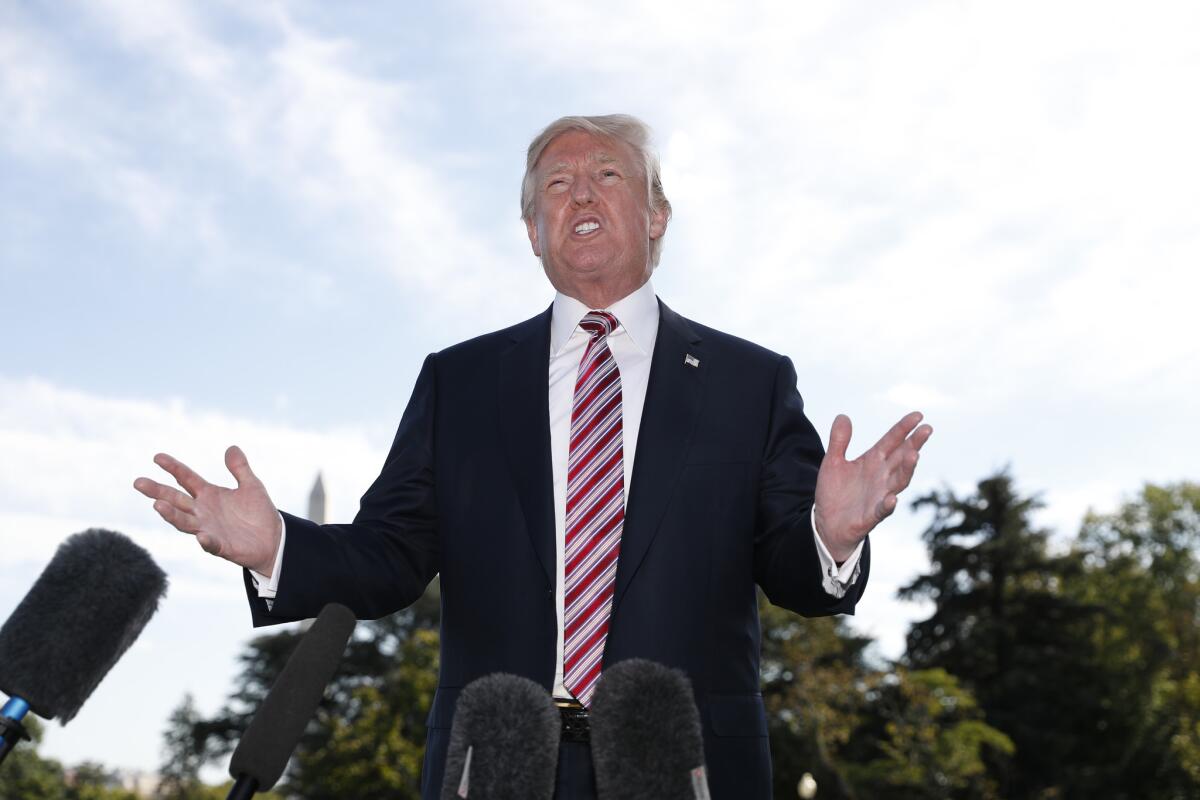
President Trump on Friday continued to praise his administration for doing “an incredible job” responding to Puerto Rico’s devastation, though millions remain without power and clean water nine days after Hurricane Maria.
“We have done an incredible job considering there is absolutely nothing to work with,” Trump told reporters as he left the White House for a weekend at his golf club in Bedminster, N.J.
Only moments after Trump’s self-congratulatory remarks were broadcast, however, the mayor of San Juan was televised with a damning indictment of the U.S. government’s treatment of the 3.5 million Americans on the island.
“I am begging anyone who can hear us to save us from dying,” Carmen Yulin Cruz said into the cameras.
She added: “We are dying and you are killing us with the inefficiency,”
Though Trump earlier this week cited Cruz in a tweet, thanking her for “your kind words” about the federal response, in fact Cruz has been critical almost daily, saying officials are moving too slowly.
The world was witnessing that Puerto Ricans are treated not as “second-class citizens,” Cruz said, “but as animals that can be disposed of.”
The contrast between Trump’s optimistic take and her cries for help, plus heart-rending coverage from Puerto Rico generally, contributed to a spreading perception of a president out of touch.
White House officials have pushed back hard against allegations that the administration’s Puerto Rico response hasn’t measured up to that in Texas and Florida after hurricanes Harvey and Irma.
Trump pushed back as well. In his remarks as he departed for New Jersey, the president cited as he has before the unique difficulties in Puerto Rico, given both the poor condition of its infrastructure before the storm and the intensity of Maria.
“When you look at Texas and when you look at Florida, it’s a whole different level,” Trump said. “Nobody has ever seen when you have a Category 5 wipe out an island like this.”
The island’s power generation plant has been “wiped out,” the president said, adding: “It’s not like, ‘Let’s go back and fix it.’ That’s what I do — I’m a construction guy. You don’t go back and fix it, there is nothing. The power grid is gone.”
He also reiterated his concern about potential costs, saying that the amount of money needed just to replace the power grid “is really tremendous.” Trump said there would have to be talks between Washington and indebted Puerto Rico about how to pay the expenses — a suggestion he did not make about Texas and Florida.
“In the meantime,” Trump said, “we’ve saved a lot of lives. We’ve done a really good job.”
- Share via
Health and Human Services Secretary Tom Price resigns after controversy over more than $400,000 in taxpayer-paid flights
Health and Human Services Secretary Tom Price resigned Friday in the midst of an expanding controversy over spending hundreds of thousands of dollars in taxpayer money for private air flights.
His departure was announced in a terse statement by the White House.
“Secretary of Health and Human Services Thomas Price offered his resignation earlier today and the President accepted,” the statement said.
Price, a former congressman, was one of four Cabinet members facing questions about private and military airplane flights.
Until Friday night, he had been resisting Democratic calls for his firing. Politico had reported, in stories that unfolded over days, that Price had spent more than $400,000 on private domestic travel in recent months. He spent an additional half million dollars on military aircraft for events in Europe and Africa.
President Trump, asked outside the White House earlier Friday if he planned to fire Price, called him a “fine man” and said he would “make a decision sometime tonight.”
“I certainly don’t like the optics,” Trump said. “I’m not happy, I can tell you that. I’m not happy.”
Three other Cabinet members--Interior’s Ryan Zinke, Treasury Secretary Steve Mnuchin and Environmental Protection Agency administrator Scott Pruitt--also have taken multiple taxpayer-paid flights on private or military aircraft.
None of the three had cost taxpayers as much as Price. The secretary said Thursday that he would repay the government $52,000, a fraction of the cost of the flights.
The attention on costly flights for members of the Trump administration came amid other problems. Investigators on Capitol Hill were looking into the use of private emails for government work by officials including the president’s son-in-law Jared Kushner. Puerto Rican officials, meantime, were lashing out at U.S. rescue efforts that were stalled or not reaching the neediest on the storm-ravaged island.
The criticism hit Trump at a difficult time, taking attention away from his newest endeavor, the tax plan he announced Wednesday in Indiana. Trump has been forced on defense at a time he could be building positive momentum that could boost his popularity and give him more power to pressure Congress his way.
That political danger underscored another: Trump’s presidential victory was powered by his contention that an outsider businessman sympathetic to overlooked Americans could conduct the government to their advantage, competently and efficiently. Central to that pitch was his promise to eradicate self-serving and self-dealing behavior—or, as his enthusiastic crowds put it often, to “Drain the Swamp.”
The multiple crises threaten to undercut him on all of those fronts, allowing opponents to redefine him as a president overlooking his own supporters while sanctioning behavior he once criticized.
- Share via
Pence to headline Koch network’s strategy session for the midterm elections
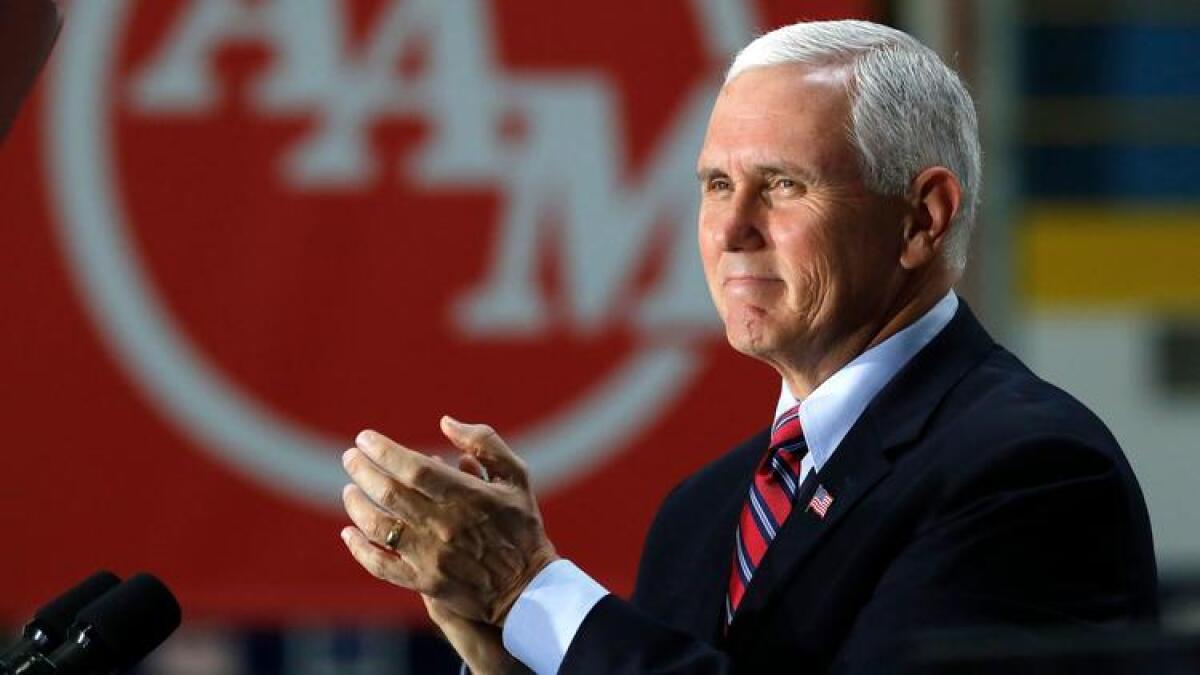
Vice President Mike Pence will deliver the keynote address next month at a retreat in Manhattan of the conservative Koch network, as wealthy donors gather to plan political and policy strategy ahead of the 2018 midterm elections.
The network, founded by billionaire industrialist Koch brothers Charles G. and David H. Koch, has close ties to Pence, which has helped enable it to exert influence in the White House despite not endorsing President Trump in 2016.
Pence held a private conversation in June with Charles Koch ahead of the group’s Colorado Springs seminar with donors who pay $100,000 annual dues to attend network events.
Trump’s legislative director, Marc Short, previously headed the Koch-backed Freedom Partners, a chamber of commerce-style advocacy organization with an aligned political fundraising committee.
The Manhattan meeting on Oct. 12-13 will be the first in New York for the Koch donors network. Over two days, the group will focus on “shaping strategy for the upcoming Senate, House, and gubernatorial races, as well as plans to achieve important policy gains in Washington and state capitals across the country,” according to a statement.
The Koch network has promised to spend up to $400 million on issues and political advocacy in support of its free-market policies during this election cycle, through its sprawling consortium of outside groups, including Americans for Prosperity and others that sometimes outpace the traditional Republican Party infrastructure.
“We are very pleased to host the vice president at our upcoming retreat,” said network spokesman James Davis. “Our members are looking forward to his insight.”
The Koch groups, which have helped shape administrative policy, particularly on tax and regulatory reform, were poised to gain influence at the White House with the departure of top Trump advisor Stephen K. Bannon. His nativist and populist ideas sometimes clashed with the more button-downed, business-oriented group.
But Bannon threatens direct competition for the Koch network now that he has been pushed from the White House — from his perch once again as editor of Breitbart News, the conservative media website. He is trying to tap his own network of wealthy donors to back candidates aligned with Trump’s “America First” agenda.
Bannon is assembling a potential slate of outsider candidates opposed to the Republican establishment, including Roy Moore, the fiery former chief justice in Alabama who defeated appointed Sen. Luther Strange in the Republican primary election this week.
Allies of Bannon’s are looking for other potential candidates to challenge incumbent Republicans, including some senators who have been aligned with the Koch network.
- Share via
Trump will make his first visit as president to Asia in November
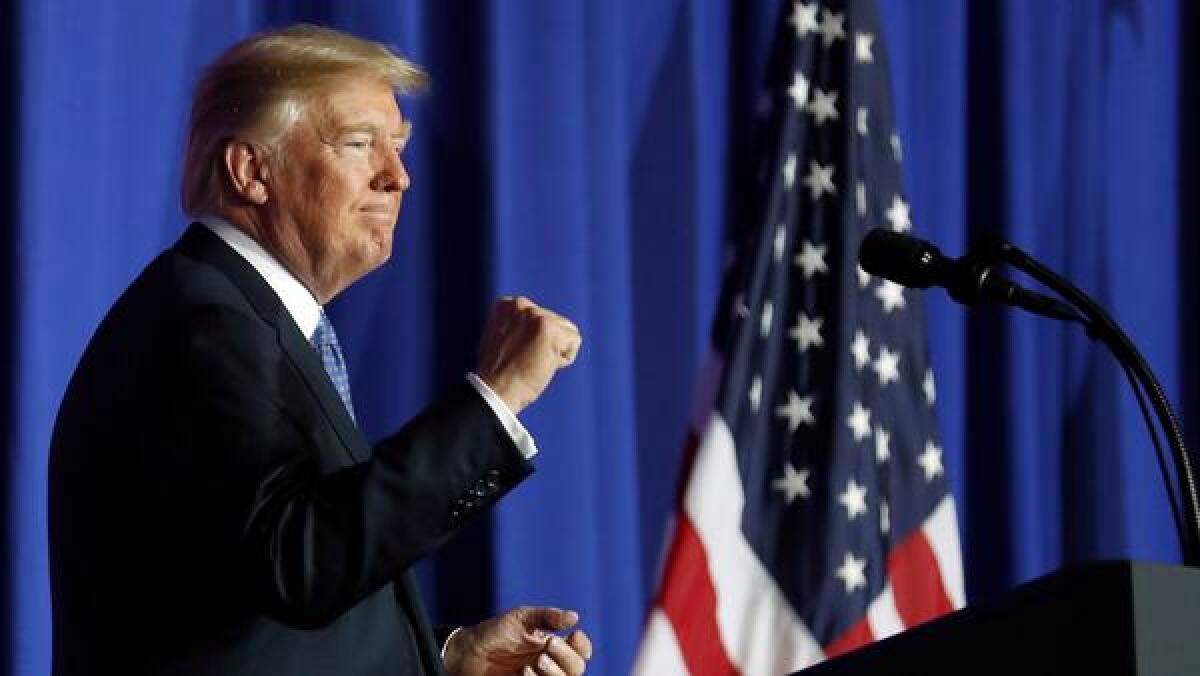
The White House announced Friday that President Trump and First Lady Melania Trump will go on a five-nation Asia tour in early November, with stops in Japan, South Korea, China, Vietnam and the Philippines, as well as a stop in Hawaii.
The trip, scheduled Nov. 3 through 14, will include engagements with the Asia-Pacific Economic Cooperation summit and the Assn. of Southeast Asian Nations summit, demonstrating Trump’s “continued commitment to the alliances and partnerships of the United States in the region,” according to a statement from the White House.
Trump is slated to discuss the importance of a free and open Indo-Pacific region to the United States’ prosperity and security, and the importance of fair and reciprocal economic ties among trade partners, according to the statement.
“The president’s engagements will strengthen the international resolve to confront the North Korean threat and ensure the complete, verifiable, and irreversible denuclearization of the Korean Peninsula,” the statement said.
- Share via
Why the GOP tax plan’s big boost in the standard deduction won’t be a windfall for some average Americans
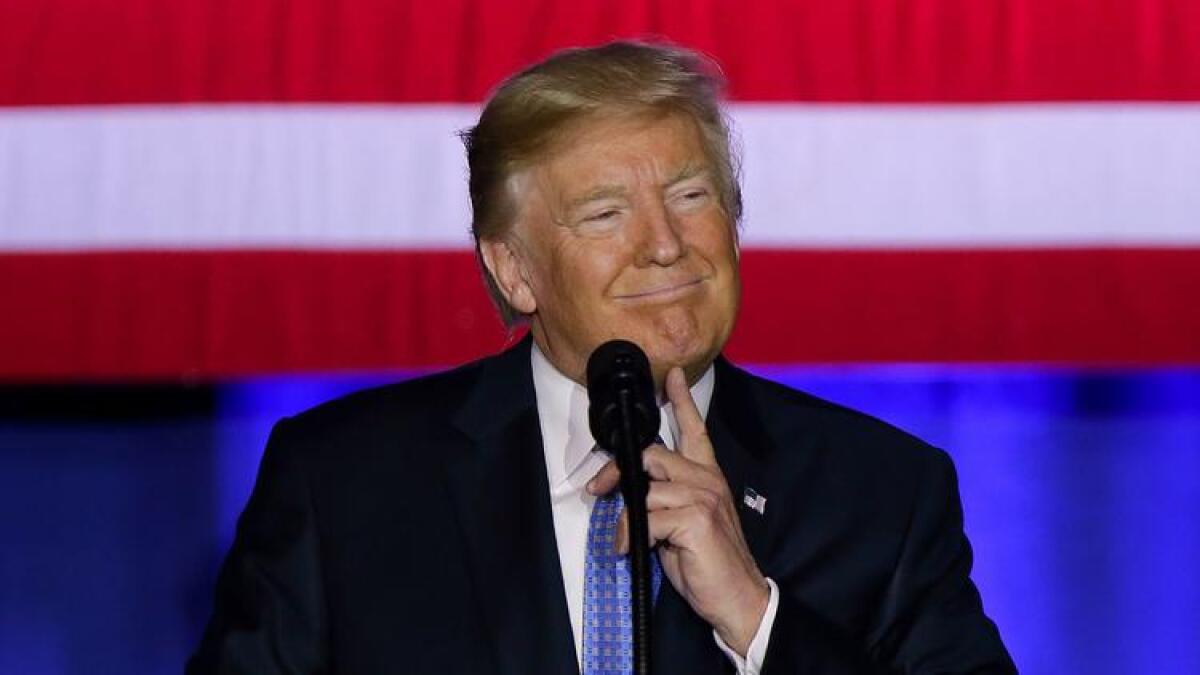
The Republican plan to nearly double the standard deduction as part of a sweeping tax overhaul appears to be a windfall for average Americans because it would allow them to shield thousands of additional dollars from taxes.
But don’t start planning how you’d spend those savings yet.
Another untouted proposed change that would eliminate personal exemptions would significantly reduce the benefit for some people and conceivably wipe it out for others.
A family with two or more children actually could end up worse off than under the current tax code, depending on the final shape of the law, a sign that the Republican plan might not help the middle class as much as it does the wealthy.
“It is definitely not a windfall,” Jacob Leibenluft, a senior advisor at the Center on Budget and Policy Priorities, a liberal think tank, said of the larger standard deduction.
- Share via
First group of refugees heads from Pacific camps to U.S. under deal Trump slammed as ‘dumb’
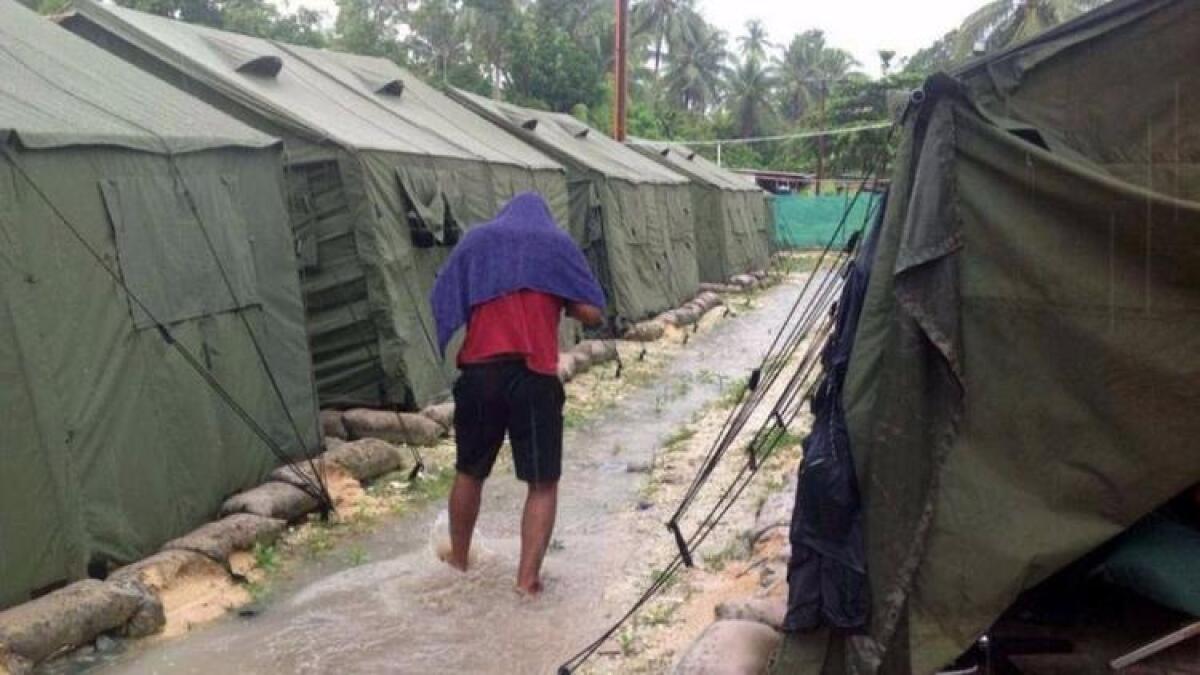
The first refugees accepted under a contentious agreement with Australia are headed to the United States, months after President Trump assailed the deal as “dumb” and not in the country’s best interests.
Fifty-four asylum-seeking refugees left Pacific island camps this week where Australia had housed them for several years. Some came from an all-male camp in Papua New Guinea’s Manus Island, while the others came from a camp on the island of Nauru, a U.S. State Department official said on Thursday. A number of advocacy groups have said the refugees are set to settle in cities from Los Angeles to Atlanta.
The resettlement of the refugees, mostly men from countries such as Iran, Afghanistan, Pakistan, Iraq and Somalia, is part of a deal forged between the United States and Australia under the Obama administration.
Under the agreement, about 1,250 refugees who have been refused entry to Australia and are housed in offshore detention centers will be accepted by the U.S.
- Share via
Trump falsely says Senate failed to repeal Obamacare because a senator was ‘in the hospital’
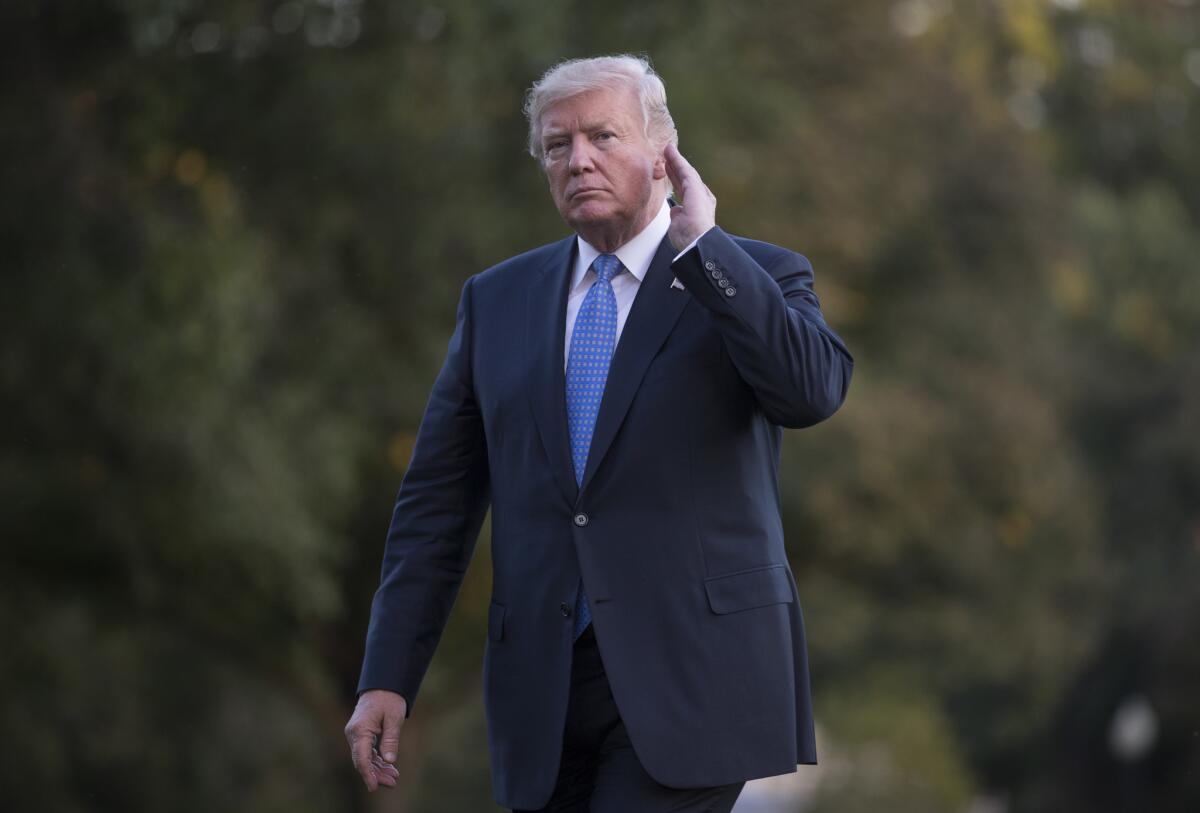
President Trump lately, and oddly, has taken to blaming Republicans’ failure to repeal the Affordable Care Act this week on the false claim that a GOP senator has been “in the hospital” and couldn’t make the vote.
“We have one senator who’s a ‘yes’ vote, a great person, but he’s in the hospital,” Trump said on Thursday morning’s “Fox & Friends” show.
“We have the votes to get it done. You can’t do it when somebody is in the hospital,” Trump reiterated later in the interview.
On Wednesday, he also tweeted about “one Yes vote in hospital” and later told reporters at the White House that Republicans would have the necessary votes, “but with one man in the hospital we cannot display that we have them.”
In fact, the unnamed senator is Thad Cochran of Mississippi, and while he is back in his state for medical treatment, he is not in a hospital. What’s more, according to his staff, Cochran had arranged to return to Washington if he were needed for the healthcare vote.
The Senate leadership called off the vote earlier this week after the 52-member Senate Republican majority couldn’t muster the 50 votes to pass a bill. The public opposition from three Republican senators doomed that bill to defeat
Yet, more mystifying than Trump’s false claim to have enough votes to repeal and replace Obamacare was his repeated talk of a hospitalized senator -- even after Cochran’s office on Wednesday circulated the senator’s own tweet to the contrary.
On Twitter, Cochran thanked Trump for the well-wishes but wrote that he’s “not hospitalized” but “recuperating at home in Mississippi and look forward to returning to work soon.”
White House Press Secretary Sarah Huckabee Sanders defended Trump’s misstatements on Thursday.
“That was our understanding, that the senator was physically unable to be here this week,” she told White House reporters.
She did not explain why the White House would think that about Cochran. With close votes looming, Senate leaders routinely take pains to know where their votes are -- and senators make provision to get to the Senate if necessary.
Nor did she explain how Trump could say he has the necessary votes to pass a healthcare bill in the Senate, with or without Cochran, when Senate Republicans have said otherwise. Instead, her response further confused the matter: “We have the votes on the substance, but not on the process.”
- Share via
Health Secretary Tom Price says he will partly reimburse $400,000 worth of travel on charter planes
Health and Human Services Secretary Tom Price, who faces mounting criticism over his personal use of charter flights for routine travel around the country, said Thursday he would reimburse the federal government for part of the costs.
But Price did not commit to reimbursing most of the travel tab.
And even as Price expressed regret about his charter travel, which President Trump has criticized, new questions emerged about his use of military aircraft for two international trips earlier this year to Africa, Europe and East Asia.
The international trips, first reported by Politico, cost around $500,000, according to figures confirmed by the Los Angeles Times based on military data.
While use of military aircraft for foreign travel is not unprecedented, particularly for destinations not serviced regularly by commercial airlines, it is not routine for secretaries of domestic agencies and it is unclear whether such an expense was necessary for Price’s trips.
For example, Price used the military planes to travel between Berlin, Geneva and Washington, D.C., defense department records indicate. Those routes are serviced by regular commercial flights
A spokesperson at the Department of Health and Human Services did not immediately respond to questions about the foreign travel.
In his statement about his use of charter aircraft for domestic travel, Price appeared to indicate he made a mistake.
“I regret the concerns this has raised regarding the use of taxpayer dollars,” Price said in a statement announcing the decision.
“All of my political career I’ve fought for the taxpayers,” he added. “It is clear to me that in this case, I was not sensitive enough to my concern for the taxpayer.”
Price’s unusual use of charter flights also was first reported by Politico, which has documented more than two dozen charter flights taken by Price, costing taxpayers more than $400,000.
Health and Human Services said that Price had agreed to repay $52,000 for the flights, which included visits to a resort where he owns land and to Nashville, where he had lunch with a son. It wasn’t immediately clear how he had reached that figure.
The travel is now the subject of an investigation by the inspector general’s office at the Health and Human Services Department.
The House Oversight Committee has also asked the White House and various agencies to turn over information about any private flights.
Price’s predecessor as health secretary, Sylvia Mathews Burwell, never took a charter flight during her roughly 3 years as President Obama’s secretary and took a military plane “a handful of times,” according to a former spokesman who spoke on condition of anonymity.
Burwell’s spouse flew once with her on a military plane, to Cuba, the spokesman said, and he reimbursed the government. A Price spokesman told Politico that Price’s reimbursement for his wife’s flights was unprecedented.
Price, an orthopedic surgeon and former Republican congressman from Georgia, faced ethics questions following his nomination over reports that he traded extensively in the stock of healthcare companies even as he pursued legislation that would have affected some of the same companies.
President Trump said Wednesday that he was “not happy” with Price’s travel, stoking speculation that Price might be forced to resign. “We’ll see,” Trump said to questions from reporters.
Price appeared to allude to that possibility in his statement Thursday.
“I have spent 40 years both as a doctor and in public service putting people first,” he said. “It has been my personal honor to serve the American people, and I look forward to continuing that service.”
W.J. Hennigan and Jackie Calmes in Washington contributed to this report.
This post was updated at 6:18 p.m. with information on Price’s travel by military planes.
This post was updated at 8:07 p.m. with details of Burwell’s travel.
- Share via
Justice Neil Gorsuch draws protesters with speech at Trump Hotel
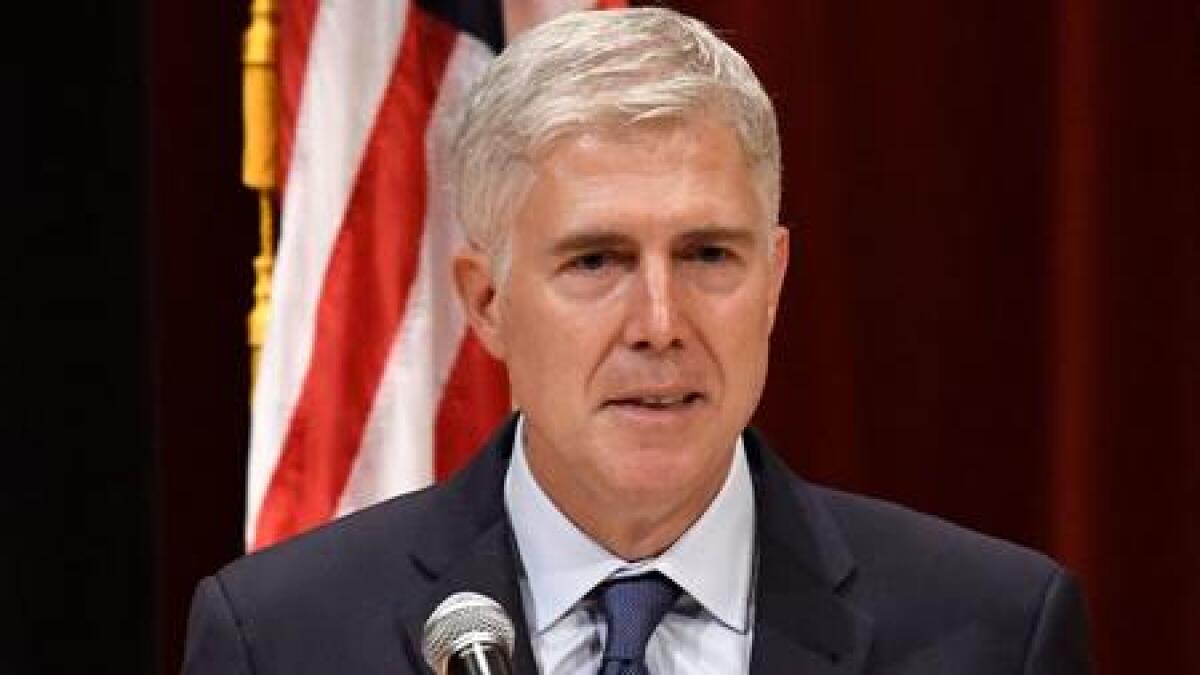
Justice Neil M. Gorsuch, President Trump’s first Supreme Court appointee, on Thursday drew protesters to the Trump International Hotel when he gave his first major speech in Washington there to a conservative education group.
Several progressive groups accused Gorsuch of undercutting the court’s appearance of impartiality. They said he may be required to recuse himself if the justices are asked to decide whether Trump is violating the Constitution’s ban on presidents taking an emolument from a foreign state -- as critics have suggested he is -- by profiting from foreign emissaries using the hotel.
“In an era of ruthless ideological divisions, Justice Gorsuch’s decision will undermine the court’s public legitimacy as an entity above partisan politics,” the groups said in a public letter to Chief Justice John G. Roberts Jr.
The groups included the Planned Parenthood Federation, the Alliance for Justice and NARAL Pro-Choice America.
Gorsuch also drew criticism a week ago for joining Senate Majority Leader Mitch McConnell to speak at the University of Louisville in Kentucky, McConnell’s home state.
In his role as majority leader, McConnell played the key role last year in blocking hearings for President Obama’s Supreme Court nominee, Judge Merrick Garland, which cleared the way for Trump to name Gorsuch to fill the vacant seat and the Republican-controlled Senate to confirm him this year.
In November, Gorsuch is scheduled to give the keynote address at the annual convention of the Federalist Society, a conservative lawyers group.
The meaning of an “emolument” is not entirely clear from the Constitution, but Trump has been sued by a watchdog group called Citizens for Responsibility and Ethics in Washington for violating the constitutional ban. It cites the president’s ownership of the high-end hotel, situated on Pennsylvania Avenue between Congress and the White House, and said his profits could be deemed as emoluments because foreign diplomats are choosing to spend money there.
A judge in New York is scheduled to hear arguments in the case on Oct. 18.
- Share via
Three-star general named to coordinate military’s Puerto Rico relief efforts

A three-star military commander was named on Thursday to manage Hurricane Maria relief efforts in devastated Puerto Rico.
Lt. Gen. Jeffrey S. Buchanan, an Army infantry officer who served multiple tours in Iraq, is expected to take over at the island command headquarters set up in the convention center in San Juan, the capital. A one-star general arrived earlier in the week.
The Trump administration has been criticized for a slow and inadequate response to the hurricane that hit Puerto Rico just over a week ago, leaving the American island in ruins, without power and increasingly lacking in water and other basic necessities. The military effort is expected to expand in the coming days.
Having a commander who reports both to the governor and the military chain of command will create a “unified team” of military and civilian disaster response units, Craig Fugate, the head of the Federal Emergency Management Administration during the Obama administration, said in a phone interview.
A dual-status commander can marshal U.S. military forces to help clear roads, move supplies and get crews into remote places to assist in fixing the electrical grid, coordinating with public agencies and private utilities.
Fugate noted that the relief effort is hampered by a bottleneck of supplies at the Port of San Juan, and the dearth of passable roads, drivers and gasoline to move the water, food, fuel and other necessities to the communities that need them.
Those problems will not be alleviated by waiving the federal Jones Act so that foreign-flagged ships can freely transport more goods into Puerto Rico. Trump, who waived the act on Thursday, had been criticized for not doing so earlier.
His decision was “probably” more of a political one than an action to bring more aid to the island, Fugate said.
“You have all the armchair quarterbacks shouting out a lot of criticism,” Fugate said. “Sometimes it is just more politically expedient to deal with it just to tamp down all the voices.”
- Share via
Roy Moore’s victory in Alabama could signal a wave of insurgent candidates like the tea party uprising
Roy Moore’s upset victory in the Alabama Senate primary sent shock waves through the Republican establishment Wednesday, portending a GOP civil war as outsider candidates in other states threaten to challenge incumbents.
The potential showdowns are reminiscent of the tea party uprising that just a few years ago cost Republicans the majority in the Senate. Now President Trump’s populist rise to power — honed by his former advisor Stephen K. Bannon — has generated a new wave of long shot candidates capable of upending the 2018 midterms.
In Mississippi, state Sen. Chris McDaniel, who met with Bannon to consider challenging two-term incumbent Sen. Roger Wicker, called the results in Alabama “a great awakening.”
“The GOP establishment’s stranglehold on American politics is finally coming to an end. It should encourage conservative challengers all across the republic,” he said. “The environment couldn’t be any better.”
Arizona’s Kelli Ward, who is challenging Sen. Jeff Flake, said after Alabama, she felt “inspired and motivated.”
“Voters elected President Trump to shake up the status quo and get big things accomplished,” she said.
Nevada Sen. Dean Heller is another incumbent who faces a challenge by a candidate, Danny Tarkanian, with potential backing from Bannon’s allies.
And in Tennessee, incumbent Sen. Bob Corker’s sudden retirement, announced hours before the polls closed in Alabama, sent several potential candidates scrambling for what promises to be an intense primary.
On Capitol Hill, Republicans braced for more incumbents to resign rather than face challenging nomination fights.
As a result, Republican professionals who until recently felt that their control of the Senate was secure because the states holding elections in 2018 mostly lean red have started to worry. The departure of incumbents and the rise of candidates who Democrats easily can attack as extreme might put their majority at risk, they fear. At minimum, the new wave of challengers likely means more money spent and a Senate Republican Caucus that will lean further right, and be harder to control, after the next election.
“You’re going to see in state after state after state people who follow the model of Judge Moore,” Bannon told a cheering crowd at Moore’s election night party in Montgomery. They are candidates “that do not need to raise money from the elites, from the crony capitalists, from the fat cats in Washington, D.C., New York City, in Silicon Valley,” he said.
- Share via
House Majority Whip Steve Scalise returns to work at Capitol after June shooting
The congressman shot in June at a baseball practice is returning to work at the Capitol after three months in the hospital and at a rehabilitation facility.
That’s the word from Majority Whip Steve Scalise’s office. The Louisiana Republican will vote Thursday morning and address his colleagues on the House floor. This is his first public appearance since the shooting.
Scalise and four other people were injured June 14 when a gunman opened fire on a Republican baseball practice in nearby Alexandria, Va. U.S. Capitol Police and other officers returned fire and killed the gunman. The rifle-wielding attacker had nursed grievances against President Trump and the GOP.
The 51-year-old congressman was struck in the hip, and the bullet tore into blood vessels, bones and internal organs.
- Share via
Trump plans to slash refugee admissions by more than half
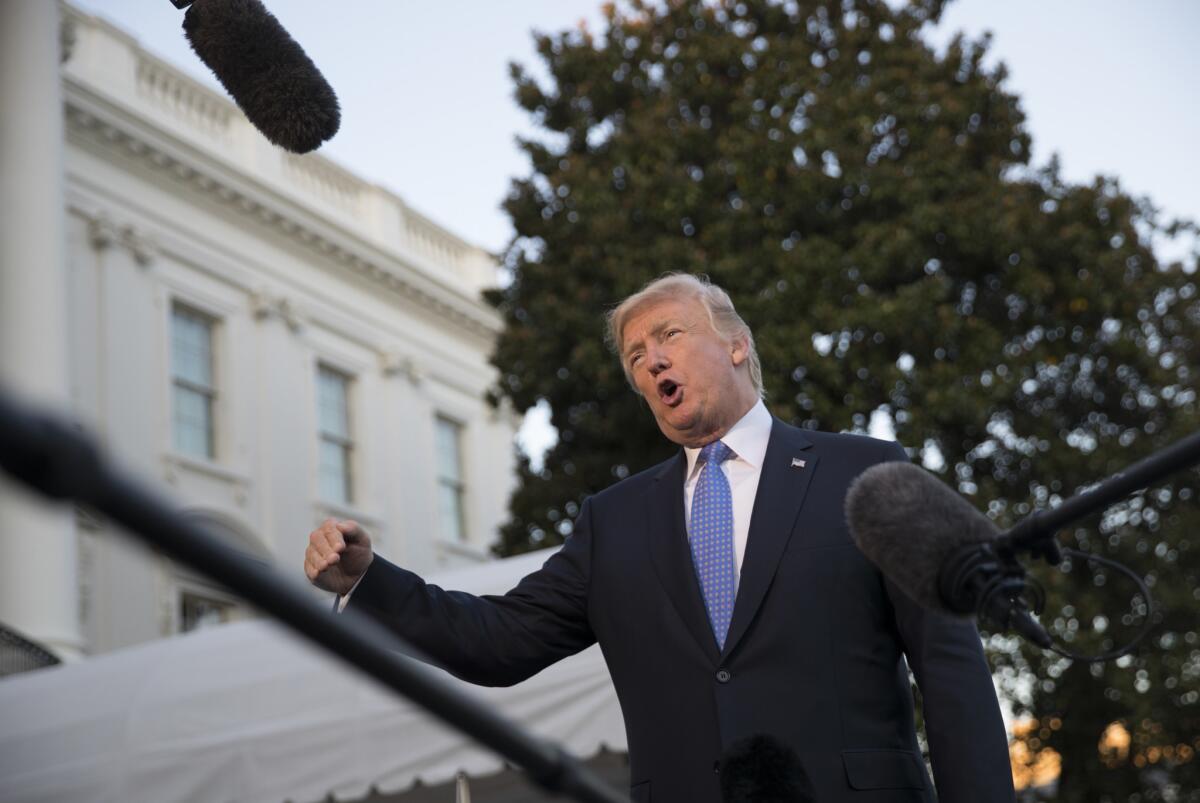
President Trump plans to slash the number of refugees allowed to enter the United States by more than half, pressing a longer-term goal of limiting legal immigration and imposing tougher vetting procedures for foreign visitors.
The Trump administration has told Congress it will limit refugee admissions to about 45,000 in the fiscal year that starts Sunday. That’s down sharply from the 110,000 cap in President Obama’s last year in office, though only about 52,000 were actually admitted because of restrictions put in place after Trump took office.
- Share via
Here’s why Trump’s tax plan will hit Californians especially hard
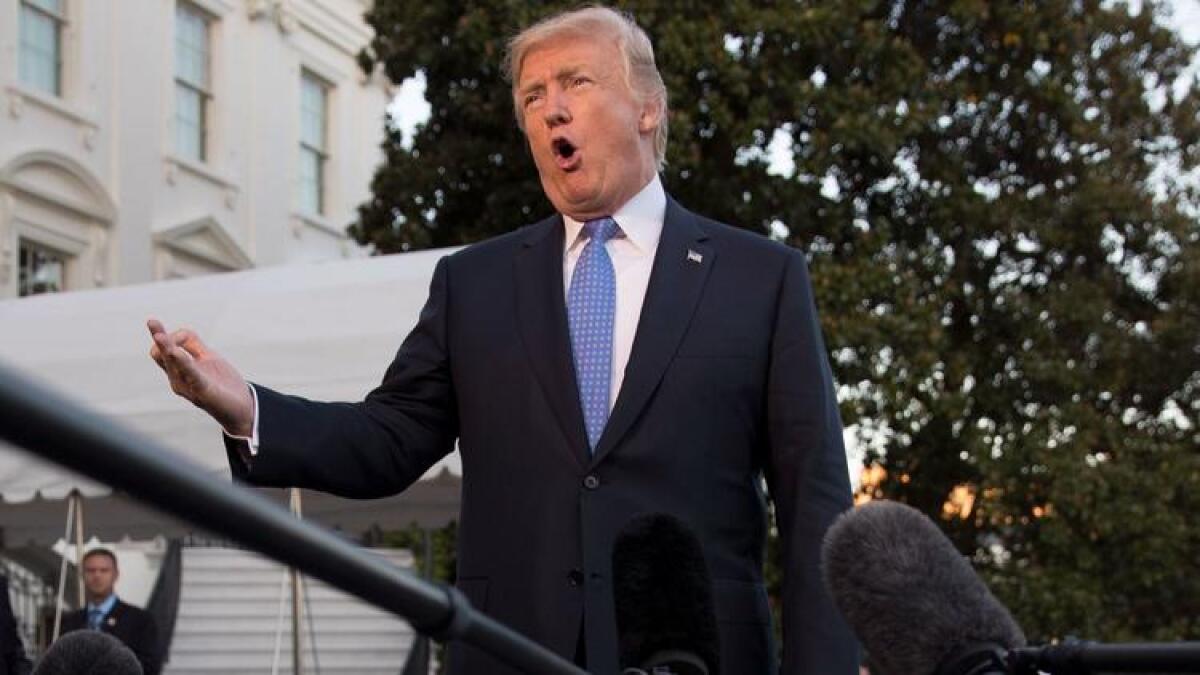
Many Californians face a big financial hit under the Republican tax plan, which would eliminate a major tax break that benefits state residents more than those anywhere else in the U.S.
The federal deduction for state and local taxes allowed Californians to reduce their taxable income by $101 billion in 2014, according to an analysis by the nonpartisan Tax Foundation.
The tax outline released Wednesday by President Trump and top congressional Republicans would ax the break, which largely benefits residents in states that are Democratic strongholds.
“Republicans in Washington have once again zeroed in on California to punish us and make our state the single biggest loser in their reckless tax scheme,” said Senate President Pro Tem Kevin de León (D-Los Angeles).
Sen. Dianne Feinstein (D-Calif.) said the elimination of the deduction was one reason the plan was a “non-starter” for her.
“I don’t believe California should suffer in order for President Trump to give tax cuts to the rich,” she said.
- Share via
Here’s why California’s early 2020 primary is destined to pick the next president. (Nah, not really)
Today we answer questions.
Woo-hoo! Now that Gov. Jerry Brown has signed the bill, it looks like California is moving up its 2020 presidential primary. Finally!
Uh.
No more watching from the sidelines as small-fry states like Iowa and New Hampshire throw their weight around.
Um.
I’m already fluffing pillows and prepping the guestroom for all the 2020 hopefuls who’ll be camped out.
Er.
What? You don’t seem too excited.
Look, it would be great if California voted in a truly meaningful presidential primary. It’s been about 50 years since that happened. But it’s about as likely in 2020 as President Trump dumping Vice President Pence and running for reelection on a unity ticket with Hillary Clinton.
How can that be?
Lots of reasons, both political and practical.
Do tell.
- Share via
Twitter to talk to House and Senate as part of probe into Russia’s election meddling
Social media giant Twitter will visit Capitol Hill on Thursday as part of the House and Senate investigations into Russian interference in the 2016 elections.
Twitter’s closed-door meetings with staff follow similar briefings from Facebook earlier this month, and the House and Senate panels have invited both tech giants, along with Google, to appear at public hearings this fall. The committees are scrutinizing the spread of false news stories and propaganda on social media, to what extent Russia was involved and whether anyone in the United States helped target those stories.
- Share via
After criticism, Trump to waive Jones Act, allowing assistance to reach hurricane-ravaged Puerto Rico
White House Press Secretary Sarah Huckabee Sanders tweeted Thursday morning that Trump would waive the Jones Act, effective immediately, at the request of Puerto Rico Gov. Ricardo Rossello, allowing assistance to reach the hurricane-ravaged U.S. territory.
The Jones Act is a 97-year-old maritime law that says shipping between ports in the United States must be done by U.S.-owned, U.S.-flagged and U.S.-built ships operated by U.S. citizens.
The Jones Act entered the news this week after the federal government waived its restrictions to ease relief efforts for Texas and Florida after their recent hurricanes, but not for Puerto Rico, whose stranded residents are desperate for water, food, medicine and other basic supplies.
As of Wednesday, about 97% of the island’s residents still lacked power, Rossello said, and about half remained without running water.
Increasingly desperate local officials have demanded more help from the federal government and faster delivery of what aid is coming.
“They’re going very slowly. The aid isn’t getting to people fast enough. We seem to be losing a lot of time in jurisdictional trifles,” San Juan Mayor Carmen Yulin Cruz said in an interview Wednesday.
“People are dying,” she said. “We don’t have time for that.”
- Share via
Trump hints at firing Health Secretary Tom Price over airplane use
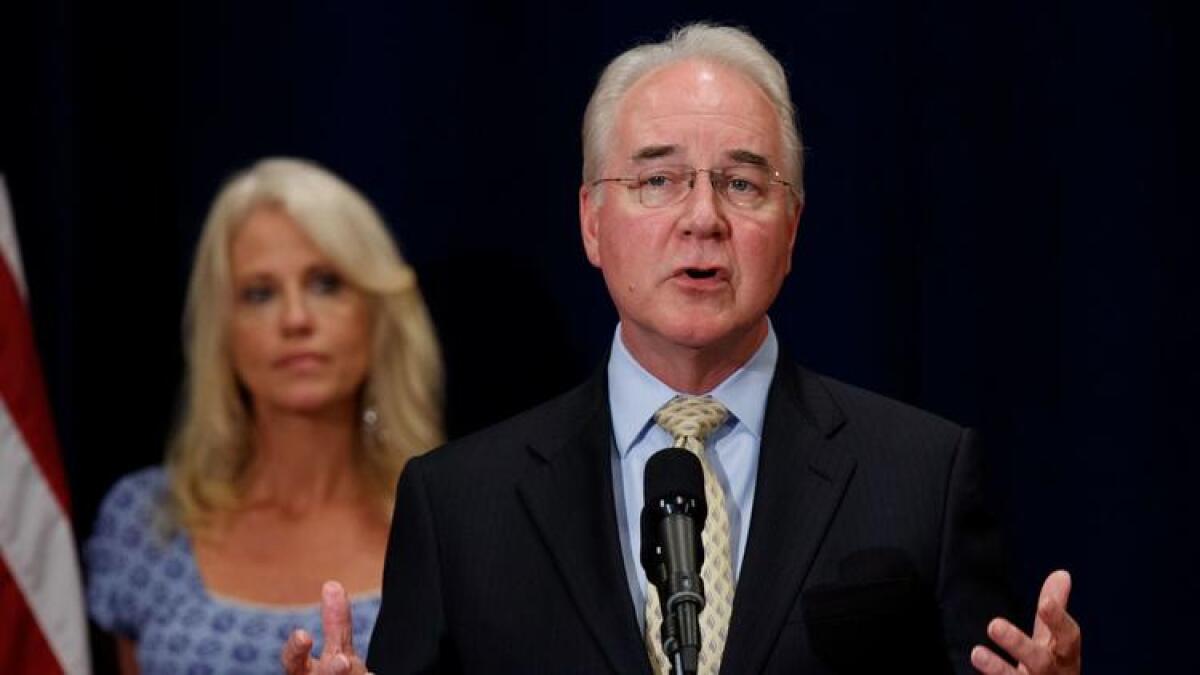
President Trump on Wednesday said he was “not happy” about Health and Human Services Secretary Tom Price’s repeated use of taxpayer-funded expensive charter flights, and did not rule out firing the Cabinet member.
“I’m not happy about it. I am not happy about it. I’m going to look at it,” said Trump. Asked if Price’s job was on the line, he replied: “We’ll see.”
Politico has documented more than two dozen charter flights taken by Price, to the tune of more than $400,000. They included visits to a resort where he owns land and a lunch with his son.
His department’s inspector general is probing the flights, and the House Oversight Committee has asked the White House and various agencies to turn over information about private flights.
Such flights are typically not allowed if there are cheaper commercial options, which Politico said there were for Price’s flights.
Trump’s remarks were the latest example of the White House distancing itself from Price’s actions. On Monday, asked about the flights during a media briefing, Press Sescretary Sarah Huckabee Sanders said that “this wasn’t White House-approved travel.”
- Share via
Health Secretary Tom Price under scrutiny after spending more than $400,000 on taxpayer-funded travel

The head of Health and Human Services ran up a six-figure tab flying around the country on private jets.
Politico has documented 26 flights by Secretary Tom Price on private charter planes at taxpayer expense since early May, estimating the cost at more than $400,000. It found frequent, low-cost airline flights on some of the routes he took, as well as train fares as low as $72 for a trip between Washington and Philadelphia — as opposed to about $25,000 for his charter.
Two of Price’s private jet trips paid for by the government were to places where he owns property — St. Simons Island, Ga., and Nashvile, Politico reported. A department spokesman said Price conducted official business and visited family members and colleagues.
On Wednesday, President Trump said he’s “not happy’” about Price’s use of private jet.
Price has previously called for deep spending and staffing cuts at the Department of Health and Human Services, including a $6-billion reduction at the National Institutes of Health, opening him to charges of both poor judgment and hypocrisy.
When he was a Georgia congressman, he spoke out against a proposed purchase of small planes to transport government officials, including members of Congress. “This is just another example of fiscal irresponsibility run amok in Congress right now,” he told CNBC.
On Saturday, Price said he would forgo private flights at taxpayer expense pending an internal review, conceding in a Fox News interview that his behavior created an image problem. (Price is a relative pauper in Trump’s Cabinet, with $22 million or so in assets.)
- Share via
GOP gives up on voting on Obamacare repeal, but bipartisan approaches remain in doubt
Members of Congress searched for a way forward on healthcare legislation Tuesday, but as they did, the wreckage of the latest Republican plan to repeal the Affordable Care Act continued to threaten to block the way for bipartisan progress.
Senate Republicans, emerging from their weekly policy lunch, said they would not move ahead with a vote on the most recent repeal legislation, sponsored by Republican Sens. Bill Cassidy of Louisiana and Lindsey Graham of South Carolina. The public opposition from three Republican senators — John McCain of Arizona, Rand Paul of Kentucky and Susan Collins of Maine — had doomed that bill to defeat.
“We haven’t given up on changing the American healthcare system,” said Senate Majority Leader Mitch McConnell (R-Ky.). “We are not going to be able to do that this week. But it still lies ahead of us.”
McConnell, Graham and other leading Republicans insisted the repeal effort would be revived later, likely next year.
- Share via
Trump, GOP tax plan has a lot for businesses to like, and a lot of questions for everyone else
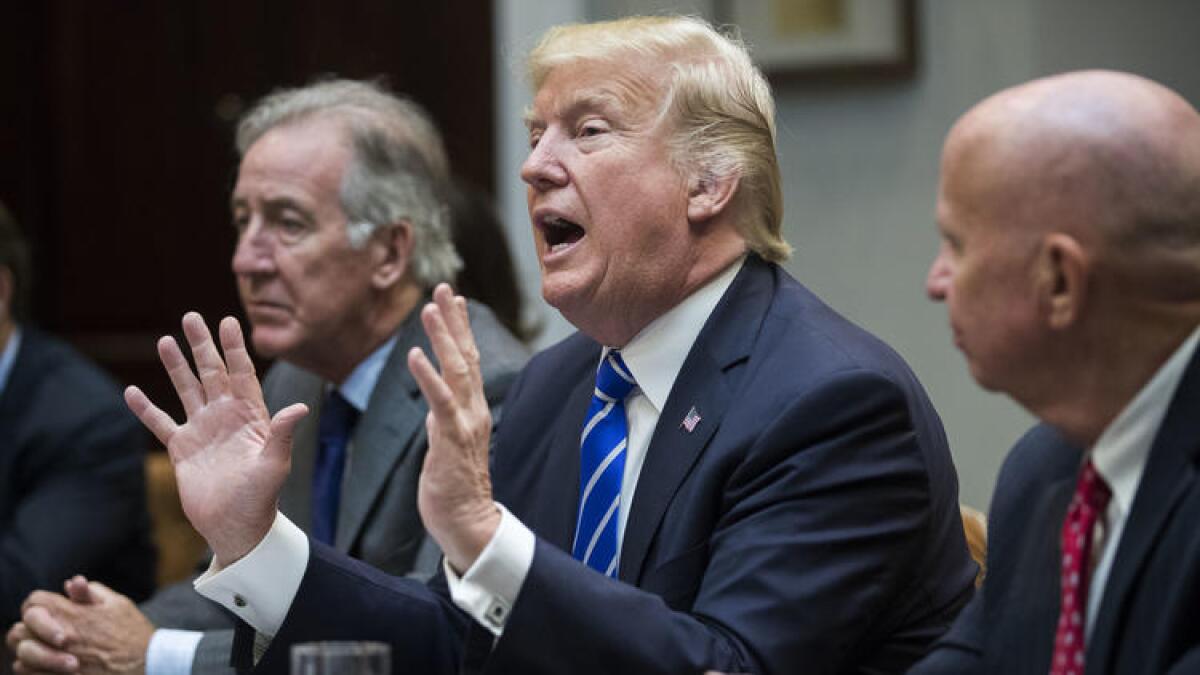
The Republican tax overhaul has a lot for businesses to like — and a lot of unanswered questions for everyone else.
According to the plan, which Republican officials outlined on Wednesday, many businesses would see a huge reduction in their tax bills and many middle-class Americans would see tax relief. The plan would reduce the number of individual tax brackets to three from seven and nearly double the standard deduction.
President Trump is scheduled to pitch the plan during a speech in Indianapolis on Wednesday. The release of the framework kicks off a scramble by lawmakers to hammer out the details, craft legislation and, if all goes according to plan, pass legislation by the end of the year.
“This framework will deliver a 21st century tax code that is built for growth, supports middle-class families, defends our workers, protects our jobs and puts America first,” said the nine-page document setting out the parameters of the tax proposal.
But most of the key details for individual taxpayers are yet to be worked out, including the income levels for the new tax brackets and whether the individual tax cuts would favor the wealthy.
There’s more certainty for businesses.
- Share via
New Republican tax outline gives huge cuts to businesses, but details of individual relief are less certain
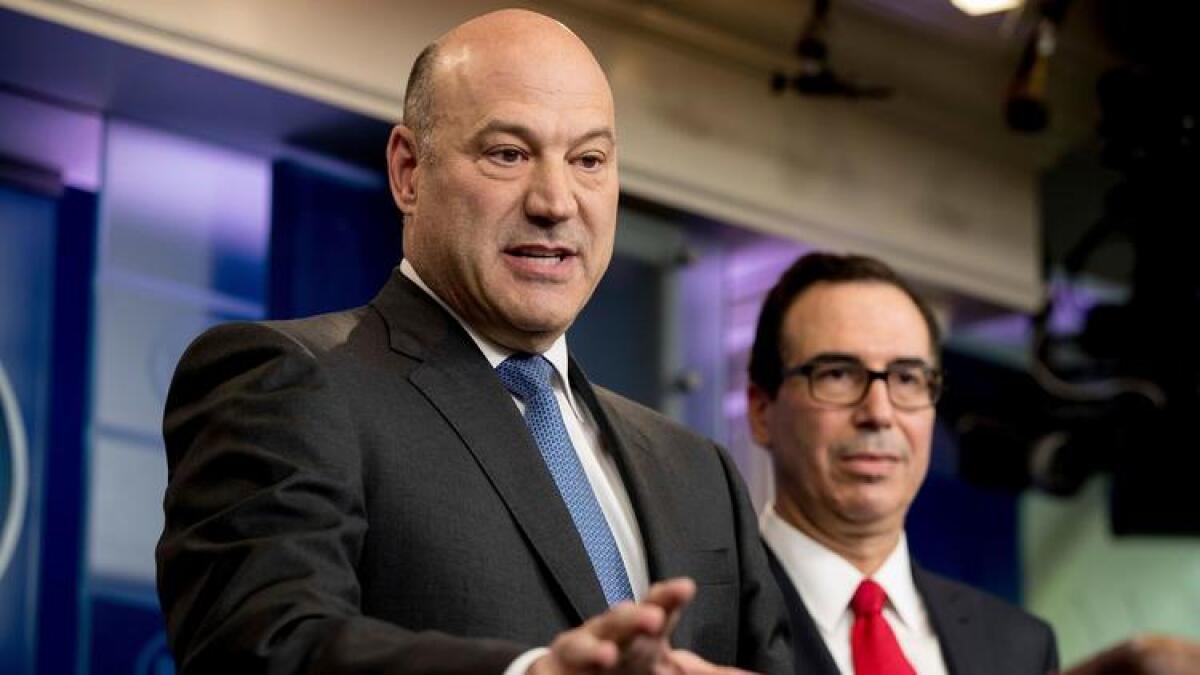
Businesses would receive huge tax cuts and many middle-class Americans would see relief under a tax overhaul outline agreed to by President Trump and top congressional Republicans, according to people familiar with the plan.
But many of the specifics, such as whether the individual tax cuts would favor the wealthy, are still to be worked out.
After months of high-level negotiations, Trump will pitch what the party is calling its “unified tax reform framework” during a speech in Indianapolis on Wednesday. Crucial details still must be worked out by lawmakers as they try to craft legislation and pass it by the end of the year.
Republican leaders have acknowledged that the plan, if enacted, initially would add to the budget deficit. They claim that stronger economic growth spurred by the tax cuts eventually would offset the deficit increase. Democrats challenge that, based on experience with past tax cuts.
According to people familiar with the plan, it calls for slashing the 35% U.S. corporate tax rate to 20%. That’s not as low as Trump wanted, but is still a gigantic reduction, to the lowest top rate since 1940. The United States no longer would tax most foreign earnings.
Businesses have been lobbying heavily for a reduction in the corporate rate. It is the highest rate among developed nations, although many companies pay a lower rate, if any tax at all, by using loopholes and deductions.
So-called pass-through businesses that pay taxes through the individual code — from mom-and-pop operations to large partnerships such as law firms, hedge funds and some of Trump’s own businesses — would see their top tax rate drop to 25% from 39.6%.
For individuals, there is much less clarity.
The current seven tax brackets would be reduced to three: 12%, 25% and 35%. But Congress still must determine what the income levels are for those brackets.
- Share via
Tired of not winning? Trump deletes his tweets endorsing the losing Senate candidate in Alabama
President Trump was all-in for the man he called “Big Luther” -- Alabama’s Sen. Luther Strange, the Republican appointed to replace former Sen. Jeff Sessions when Sessions became Trump’s attorney general. Repeatedly the president endorsed Strange on his favored medium, Twitter, and campaigned with Strange on Friday at a raucous rally in Birmingham, Ala.
Strange was the underdog from the start but Trump repeatedly boasted that, thanks to his backing, “Big Luther” was “shooting up” in the polls. As many expected, however, the winner of the Republican runoff contest on Tuesday was zealously Christian conservative Roy Moore, who twice was suspended from Alabama’s Supreme Court for defying federal law in favor of what he calls “God’s law.”
By Wednesday morning, some of Trump’s tweets documenting his support for loser Strange, including the one above, were gone from his personal Twitter account. The deleted Tweets were tracked by ProPublica, including these:
Not all of the tweets about Strange disappeared. As of Wednesday morning, several remained live.
Once the election results were in, Trump tweeted to congratulate Moore -- first on Tuesday night and again on Wednesday morning. As it happens, Trump’s allegiance to Strange was in question even before voters cast ballots.
Amid his effusive pro-Strange tweets, and his boasts of boosting the incumbent’s standing, Trump had mused aloud that he might have backed the wrong horse -- even from the Birmingham stage with Strange.
Because, as Trump has often said, he likes to win. And if he doesn’t, delete the evidence.
- Share via
Taliban claims attack on Kabul airport during visit by U.S. defense secretary and NATO secretary-general
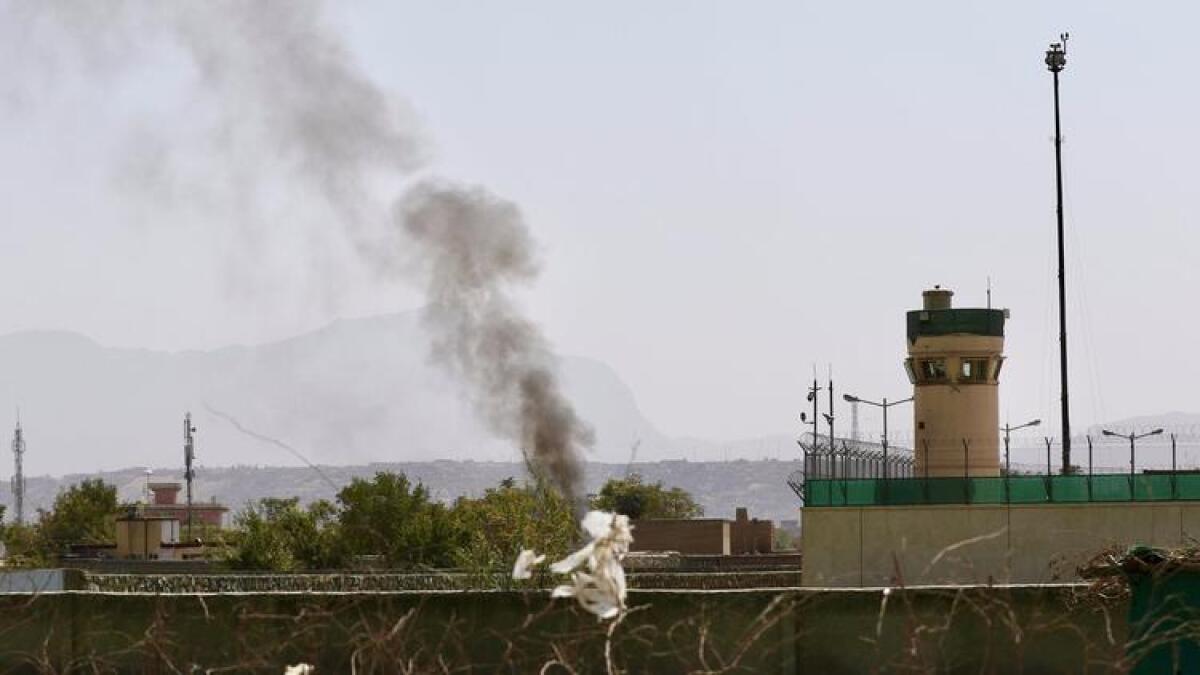
At least five civilians including a woman were wounded after several rockets were fired toward the international airport in Kabul, officials said Wednesday.
The attack came as Secretary of Defense James N. Mattis and NATO Secretary-General Jens Stoltenberg were in the Afghan capital for a visit and just hours before they held a joint news conference with Afghan President Ashraf Ghani.
Najib Danish, spokesman for the Afghan Interior Ministry, said one of the rockets stuck a home near the airport, wounding the five victims. He said one of them was a woman who was “not in a good health condition.”
Zabihullah Mujahid, a spokesman for the Taliban, claimed responsibility for the attack on his official Twitter account.
- Share via
Trump leaves the Washington ‘swamp’ to dine with donors in Manhattan
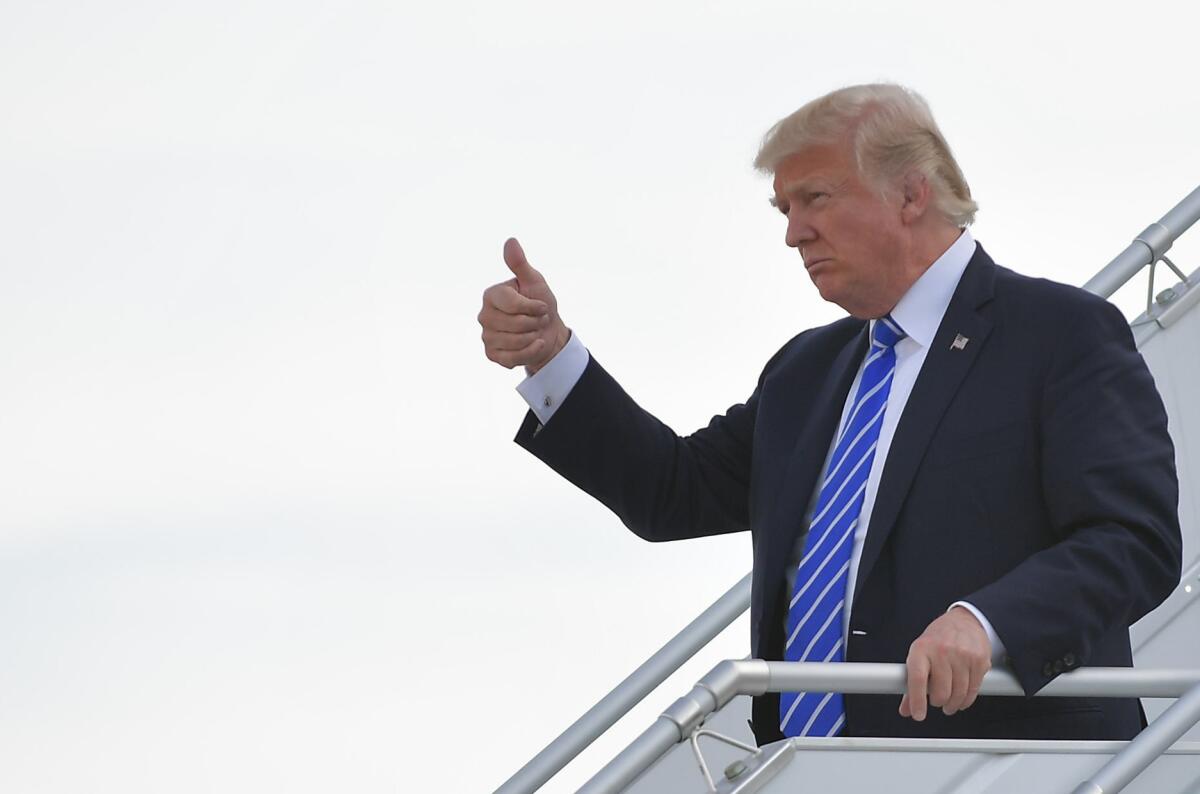
President Trump returned to one of his high-priced haunts in Manhattan to raise money for the Republican Party on Tuesday, as Republicans in Congress failed again to pass a healthcare bill and the Senate candidate that he and other party leaders favored was losing a special Alabama election.
Trump dined with about 150 donors from New York’s real estate and financial industries at the famous circus-themed Le Cirque restaurant on the Upper East Side. Some attendees paid six-figure sums for the company of a president who often decries what he calls Washington’s pay-to-play “swamp.”
The Republican National Committee and the Trump Victory Fund expected the event to raise about $5 million to help protect Republicans’ majorities in the Senate and the House in next year’s midterm election.
The White House declined to let reporters traveling with the president attend any part of the fundraising activities or hear Trump’s remarks. In years past, reporters typically have been allowed to at least attend a president’s speech at fundraisers.
Trump similarly held fundraisers at Le Cirque for his presidential campaign last year, and for decades he was a regular at the restaurant. It has fallen on hard times, however, filing for bankruptcy in March and slipping to a one-star rating from the New York Times’ restaurant critic.
Donors paid a minimum of $35,000 for two tickets to attend the event. Couples who paid $100,000 were given “VIP access” and $250,000 bought two seats to a “roundtable discussion” with the president, according to Cassie Smedile, national press secretary for the RNC.
Among the attendees was casino and hotel owner Steve Wynn. Trump also met with RNC Chairwoman Ronna Romney McDaniel, who took over the party after Reince Priebus left the RNC to be Trump’s first chief of staff in January.
Trump’s dinner came as Alabama’s Republican voters were choosing their Senate candidate in an early test of the value of Trump’s endorsement -- and the president lost.
He strongly endorsed incumbent Sen. Luther Strange, campaigning for him in the state on Friday, but Strange, who was appointed to the Senate seat when former Sen. Jeff Sessions became Trump’s attorney general, lost to conservative challenger Roy Moore. The result became clear about the time Trump was leaving New York.
This post was updated at 6:15 p.m. to reflect the result of the Alabama Republican primary for the Senate vacancy.
- Share via
At Cuba’s urgent request, Tillerson meets with his counterpart over attacks at U.S. embassy in Havana
Secretary of State Rex Tillerson had a hurriedly arranged meeting on Tuesday with his Cuban counterpart as the United States considers closing its embassy in Havana after mysterious ailments afflicted 21 U.S. diplomats there.
The late-day meeting came at the request of Cuban Foreign Minister Bruno Rodriguez, U.S. officials said. He had no comment as he left the State Department.
The Cuban government has professed to be as confounded by the illnesses as Washington is; the U.S. has suspected an attack, but one of still undetermined origin.
The attacks have been described as possible sonic waves or other high-pitched sound bombardments. The victims reported loss of hearing and dizziness, and two may have suffered minor brain damage.
Speculation has centered on possible rogue elements of the Cuban military or third parties, like Russia or Iran.
The injured people were removed from Cuba. The attacks apparently started in 2016, with the most recent one in August.
Ironically, the mysterious incident occurred as relations between Havana and Washington have improved.
Tillerson said a week ago that closing the embassy was “under evaluation.” It had only been opened a year ago as the two countries normalized diplomatic ties after more than half a century.
Two Cuban diplomats were expelled from Washington in response to the illnesses. But the State Department says Havana has been cooperating with the investigation.
However, Deputy Secretary of State John Sullivan expressed more skepticism, testifying before Congress on Tuesday that Cuban authorities must have at least known what was going on, given their tight surveillance of American diplomats.
It was not clear what information Rodriguez, the Cuban foreign minister, brought to the meeting. Speaking ahead of it, State Department spokeswoman Heather Nauert said, “We’ll have plenty of questions for them.”
Later, the Cuban government put out a statement saying that Rodriguez had reassured Tillerson of the speed, seriousness and professionalism with which Havana was investigating the incidents, which it called unprecedented.
Rodriguez said no cause had yet been determined, and he asked that the two expelled Cuban diplomats be allowed to return to their functions.
He also said it would be “regrettable that a matter of this nature is politicized and that hasty decisions not supported by conclusive evidence and investigation results are taken” - an allusion to the possibility of the Americans closing their embassy.
This post was updated at 3:15 p.m. to reflect that the meeting had ended.
This post was updated at 7:15 p.m. to add Cuba’s statement.
- Share via
Roger Stone denies collusion with Russia during Trump campaign
Republican political consultant Roger Stone testified Tuesday to a House committee investigating whether President Trump’s aides had improper contacts with Moscow during last year’s campaign.
Stone later denied to reporters that he had cooperated with Russian agents or operatives during the race, and said he knew of no one else who did so either.
“I am aware of no evidence whatsoever of collusion by the Russian state or anyone in the Trump campaign,” Stone said after he had appeared for nearly three hours in a closed-door session of the House Intelligence Committee.
But Rep. Adam Schiff (D-Burbank) told reporters that Stone, a combative Republican operative who began his career under President Nixon, had declined to answer some of the panel’s questions, raising the possibility that Stone might be called back under subpoena.
“We hope that he will cooperate in the future,” Schiff said. “If not it will be necessary to subpoena him to bring him back and answer those important questions.”
Schiff declined to say what questions Stone had declined to answer.
Like Trump, Stone is outspoken and given to spinning conspiracy theories. He left the Trump campaign soon after it was launched in mid-2015 but continued to maintain contact with Trump.
He landed in the Democrats’ cross-hairs partly due to his own boasts and tweets.
Congressional investigators are especially interested in learning how Stone was able to predict last summer that WikiLeaks would soon disclose digital documents related to Democrat Hillary Clinton’s campaign — a prediction that proved accurate.
WikiLeaks released thousands of private emails pilfered from computer networks used by the Democratic National Committee days later, including some that undermined Clinton’s campaign.
Stone said after his testimony Tuesday that he had refused to identify his source. He said an “opinion journalist,” who he said was in touch with fugitive WikiLeaks founder Julian Assange, had told him that the anti-secrecy website was planning to publish the stolen emails.
In another incident last summer, Stone appeared to also foreshadow the release of emails allegedly stolen by Russian hackers from the Gmail account of Clinton’s campaign chairman, John Podesta, by tweeting that “it will soon [be] Podesta’s time in the barrel.”
Podesta’s pilfered emails appeared online soon after.
Stone released a 47-page statement to the committee that accused Democrats on the panel of making “probably false statements” about links between Trump campaign aides and Russia.
Though Stone volunteered in March to appear before the panel, he called the closed-door hearing “a political proceeding” and accused the committee of cowardice for not letting him testify in public.
The panel is one of four congressional committees investigating Russian interference in the 2016 election and whether Trump aides and family members had improper contacts with Moscow.
Stone said he had not heard from special counsel Robert S. Mueller III, who is overseeing a separate criminal probe into Russian contacts with Trump’s aides and into the White House response to the scandal.
Investigators from Mueller’s office are expected to begin interviewing White House aides in coming weeks, an official familiar with the probe said.
- Share via
Trump defends administration’s aid to Puerto Rico, denies he was distracted by his fight with NFL players

President Trump denied on Tuesday that his administration had been slow to respond to Puerto Rico’s hurricane devastation because he’d been distracted by his five-day feud with protesting NFL players.
At a news conference in the Rose Garden with Prime Minister Mariano Rajoy Brey of Spain, Trump repeatedly said Puerto Rican officials had praised his administration’s efforts. Those same officials have begged for more assistance to the island, which suffered grievous damage earlier this month from Hurricane Maria, after a near-hit from Hurricane Irma.
On his favorite communications platform, Twitter, Trump had not mentioned Puerto Rico from Sept. 20 until Monday night. In the interim, he had written dozens of tweets, many on his criticisms of NFL players who kneel during the pre-game rendition of the national anthem to protest police brutality toward African Americans.
“I wasn’t preoccupied with the NFL. I was ashamed of what was taking place,” Trump said in reply to a question.
He pressed what has been his argument in recent days: that the protesters were taking a stand against patriotism and military service members. “I don’t think you can disrespect our country, our flag, our national anthem,” he said.
“I’ve heard that before, about, ‘Was I preoccupied?’ ” Trump added. “Not at all, not at all. I have plenty of time on my hands. All I do is work. And to be honest with you, that’s an important function of working — is called respect for our country.”
A Department of Defense assessment concluded that Puerto Rico’s entire electrical system is damaged and almost half of the population lacks drinking water. One of every 7 hospitals is without fuel or power needed for machines assisting patients.
Trump said part of the difficulty in getting adequate supplies to Puerto Rico is its location.
“It’s the most difficult job because it’s on the island — it’s on an island in the middle of the ocean. It’s out in the ocean,” he said. “You can’t just drive your trucks there from other states.”
Returning to the subject later, the president said, “This isn’t like Florida, where we can go right up the spine, or like Texas, where we go right down the middle and we distribute. This is, you know, a thing called the Atlantic Ocean. This is tough stuff.”
Trump said that as he spoke, U.S. officials were unloading “massive” amounts of food, water and supplies for Puerto Rico, whose 3.5 million residents are American citizens.
The president announced earlier that he would visit Puerto Rico next week on Tuesday.
“The governor has been so incredible in his — in his statements about the job we’re doing,” Trump said. “We’re doing a great job.”
Trump also used the news conference to reiterate a threat to North Korea. Its foreign minister said that Trump’s previous statements constituted a declaration of war, and that Pyongyang may take aim at U.S. military planes flying nearby.
Trump has repeatedly dismissed North Korean leader Kim Jong Un as “Rocket Man,” or “Little Rocket Man,” a reference to the nation’s development of nuclear weapons and its frequent missile test launches.
Asked for his reaction to the threats from North Korea, Trump said that the U.S. was “totally prepared for the second option” — a military option.
“Not a preferred option, but if we take that option, it will be devastating — I can tell you that — devastating for North Korea,” he said. “That’s called the military option. If we have to take it, we will.”
As he has previously, Trump blamed past presidents for failing to curb North Korea’s nuclear advances.
“It could have been handled much more easily. Yet various administrations, many — which left me a mess,” he said. “But I’ll fix the mess.”
- Share via
Sen. Bob Corker says he will not seek reelection next year
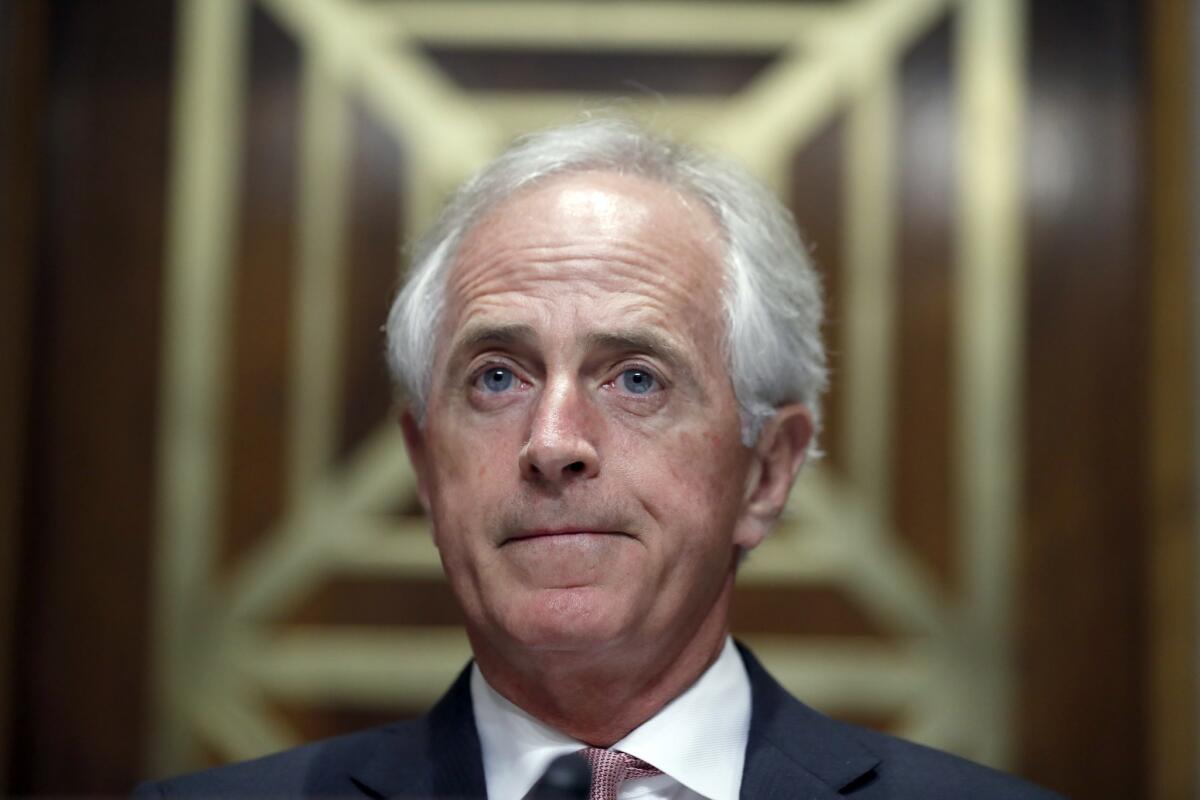
Republican Sen. Bob Corker of Tennessee said Tuesday he will not seek reelection.
In a surprise announcement, the two-term lawmaker said that after discussions with his family, “I have decided that I will leave the United States Senate when my term expires at the end of 2018.”
Corker is chairman of the Senate Foreign Relations Committee. He has tangled with President Trump, both publicly and via Twitter. But Trump recently encouraged the senator to seek another term.
Corker criticized the president after he blamed both white nationalists and anti-racist protesters for the violence at an August rally in Charlottesville, Va. Corker questioned whether Trump had shown the “stability” and “competence” to succeed in office. Trump responded by assailing the senator via Twitter.
- Share via
Pentagon’s top military officer says he advised President Trump not to ban transgender troops
The Pentagon’s top uniformed officer said Tuesday that he believes gender identity is not a credible reason to discharge transgender service members from the military, an opinion that puts him odds with President Trump.
Gen. Joseph F. Dunford Jr., the chairman of the Joint Chiefs of Staff, told the Senate Armed Services Committee that he has advised the White House to keep any troops who have served “with honor and value” and will continue to provide that advice.
“I would say that I believe any individual who meets the physical and mental standards and is worldwide deployable and is currently serving should be afforded the opportunity to continue to serve,” he said.
It was the latest example that the Pentagon was not onboard when the president took to Twitter on July 26 to declare a ban on transgender troops in uniform.
Trump said then that he made his decision “in consultation with my Generals,” but it is not clear who gave him that advice.
The White House issued formal guidance to the Pentagon last month that followed up on Trump’s tweets, and said the Pentagon should submit final plans to the White House on implementation of the transgender ban by Feb. 21.
Trump is seeking to reverse a year-old Obama administration policy that ended a longtime prohibition on transgender people serving in the armed services and the Coast Guard.
Despite Trump’s moves, several military leaders have publicly sought to reassure transgender service members that the Pentagon would not reimpose a ban until a panel of experts had studied the matter.
Defense Secretary James N. Mattis said that until the studies are complete no one now serving would be kicked out based on gender identity. Navy Secretary Richard V. Spencer said anyone able to serve in the military should be allowed to do so.
Several powerful Republican lawmakers — including Sens. John McCain of Arizona, Richard C. Shelby of Alabama and Orrin G. Hatch of Utah — also expressed opposition to the president’s decision.
McCain, chairman of the Senate Armed Services Committee, has co-sponsored a bipartisan bill to stop the proposed ban.
The Pentagon was blindsided when Trump first wrote in July that the U.S. military would not “accept or allow” transgender troops to serve “in any capacity.”
Several thousand self-declared transgender service members are estimated to be in uniform, including some deployed overseas, and the president’s declaration raised qustions about whether they will be kicked out of the military or allowed to continue to serve.
In his tweets, Trump said he had decided to bar transgender troops because the military “cannot be burdened with the tremendous medical costs and disruption that transgender in the military would entail.”
Experts said neither justification was accurate or fair since the expected medical costs were negligible and transgender troops have been openly serving for the past year without disruption.
Trump’s ban drew rebuke from war veterans and lesbian, gay, bisexual and transgender advocacy groups.
A federal lawsuit was filed on Aug. 9 on behalf of five transgender service members who seek to block implementation of the ban while the suit proceeds.
- Share via
Hillary Clinton pushes National Voter Registration Day
- Share via
Rep. Sheila Jackson-Lee kneels on House floor in solidarity with NFL protests
Rep. Sheila Jackson-Lee (D-Texas) on Tuesday knelt on the House floor in solidarity with protests by NFL players against police brutality.
“There is no basis in the 1st Amendment that says that you cannot kneel for the national anthem or in front of the flag,” Jackson said, citing the text of the amendment.
“I kneel in honor of the 1st Amendment. I kneel because the flag is a symbol for freedom. I kneel because I’m going to stand against racism. I kneel because I will stand with those young men, and I’ll stand with our soldiers, and I’ll stand with America, because I kneel.”
- Share via
U.S. imposes more sanctions on North Korea
Tightening pressure on nuclear-armed North Korea and its allies, the Trump administration on Tuesday announced another round of economic sanctions against Pyongyang, blacklisting banks and individuals in several countries.
Even as the administration stepped up the economic pressure, President Trump repeated his warnings of possible military action.
“Not a preferred option,” he told reporters. “But if we take that option, it will be devastating, I can tell you that, devastating for North Korea.”
Trump spoke at a brief White House news conference with visiting Spanish Prime Minister Mariano Rajoy, who agreed that North Korea posed an urgent danger and said he supported the U.S. sanctions.
Trump praised Rajoy for expelling North Korea’s ambassador. Several countries have forced North Korean envoys to leave in recent weeks to show displeasure as Kim Jong Un’s government has tested long-range ballistic missiles and a hydrogen bomb in defiance of U.N. resolutions.
In the latest U.S. sanctions, the Treasury Department blacklisted eight North Korean banks and 26 individuals who the department said were operating in China, Russia, Libya and the United Arab Emirates.
The administration said the North Korean banks are used to help finance development of weapons of mass destruction, including nuclear bombs, and the individuals were working with the North Korean financial system.
The sanctions complement two other packages of penalties approved unanimously by the 15-member United Nations Security Council this summer, as well as earlier U.S. sanctions, according to U.S. officials.
The U.N. sanctions target North Korean exports of seafood, textiles and coal, and limit its imports of oil.
China, Pyongyang’s main ally, is reluctant to cut too deeply into the impoverished country’s oil supplies for fear of toppling the government and triggering a refugee crisis that could spill across its borders.
The United States believes tightening the economic screws is key to forcing Kim’s government to the negotiating table, much as international sanctions helped bring Iran to talks that produced a nuclear disarmament accord in 2015
“We are targeting North Korean banks and financial facilitators acting as representatives for North Korean banks across the globe,” said Treasury Secretary Steven T. Mnuchin.
“This further advances our strategy to fully isolate North Korea in order to achieve our broader objectives of a peaceful and denuclearized Korean peninsula,” he added.
The sanctions come amid an escalating war of personal insults between Kim and Trump.
After Trump used his speech last week to the U.N. General Assembly to mock Kim as “Rocket Man,” the North Korean leader made a rare televised speech in which he called Trump “deranged.
Trump said Tuesday that Kim was “acting very badly.” But he didn’t repeat the insult.
- Share via
Interior Secretary Ryan Zinke calls his staff disloyal in speech to oil industry
Interior Secretary Ryan Zinke walked into a big gathering of the National Petroleum Council on Monday already facing at least two government probes for his management of the department’s workforce of 70,000 — but that didn’t stop him from bashing his employees.
Zinke told the gathering that he figured upon taking his post that nearly a third of the people at the department were disloyal. The comment may have shed light on the secretary’s reasons for directing department officials to reassign approximately 50 top managers in June, as soon as the move may have been legally permissible.
Several of the managers interviewed by The Times said they were puzzled by the directives, which sent them to corners of the agency where they had no expertise. At least one has filed a whistle-blower lawsuit.
The department is declining to comment on the specific charges leveled against Zinke. But the secretary had plenty to say about what he thinks of the workforce during his talk before the oil trade group in Washington.
He said he knew when he took over the department in March that “I got 30% of the crew that’s not loyal to the flag,” according to a report by the Associated Press. He compared the department to a pirate ship that captures “a prized ship at sea, and only the captain and the first mate row over” to finish the mission.
Walter Shaub, who in July resigned his post running the federal Office of Government Ethics following repeated clashes with the Trump administration, tweeted that Zinke is misguided about what loyalty means.
“Feds are loyal to America, not junior cabinet secretaries and politicians,” he wrote.
Some senior civil servants have charged that Zinke’s moves were intended to drive experienced managers from federal employment. If that was the motive, Zinke succeeded in some cases.
But the reassignments also landed the department in a high-profile whistle-blower lawsuit, filed by Joel Clement, the department’s director of policy analysis who had been leading some its highest-profile climate change work. Clement was plucked from his work helping Alaskan villages imperiled by rising seas and placed in a post overseeing the auditing of oil and gas leases.
- Share via
Trump calls for NFL rule to make players stand during the national anthem
President Trump took to Twitter on Tuesday morning to call for an NFL rule to stop players from kneeling during the national anthem.
There is a meme going around that gives the impression that the NFL already has such a rule in place.
But, according to some excellent research and reporting by the Indiana Star, that quote is not actually from the 2017 Official Playing Rules of the National Football League.
Instead, it’s a part of the league’s game operations manual, which is distributed to every NFL team. So, technically, “it’s policy, it’s not a rule,” NFL spokesman Brian McCarthy told the Indiana Star.
“I think where people are getting confused is, rules, that’s like holding or defensive pass interference, that’s a rule. This is policy.”
McCarthy told the Indiana Star that players who didn’t take the field or protested during the anthem would not be penalized.
NFL spokesman Joe Lockhart declined to comment on Trump’s tweet during a conference call with reporters Tuesday morning.
In addition to calling for an NFL rule requiring players to stand for the national anthem, President Trump also tweeted on Tuesday morning about football ratings and on the Dallas Cowboys’ demonstration on “Monday Night Football.”
- Share via
Trump says he’ll visit Puerto Rico next Tuesday
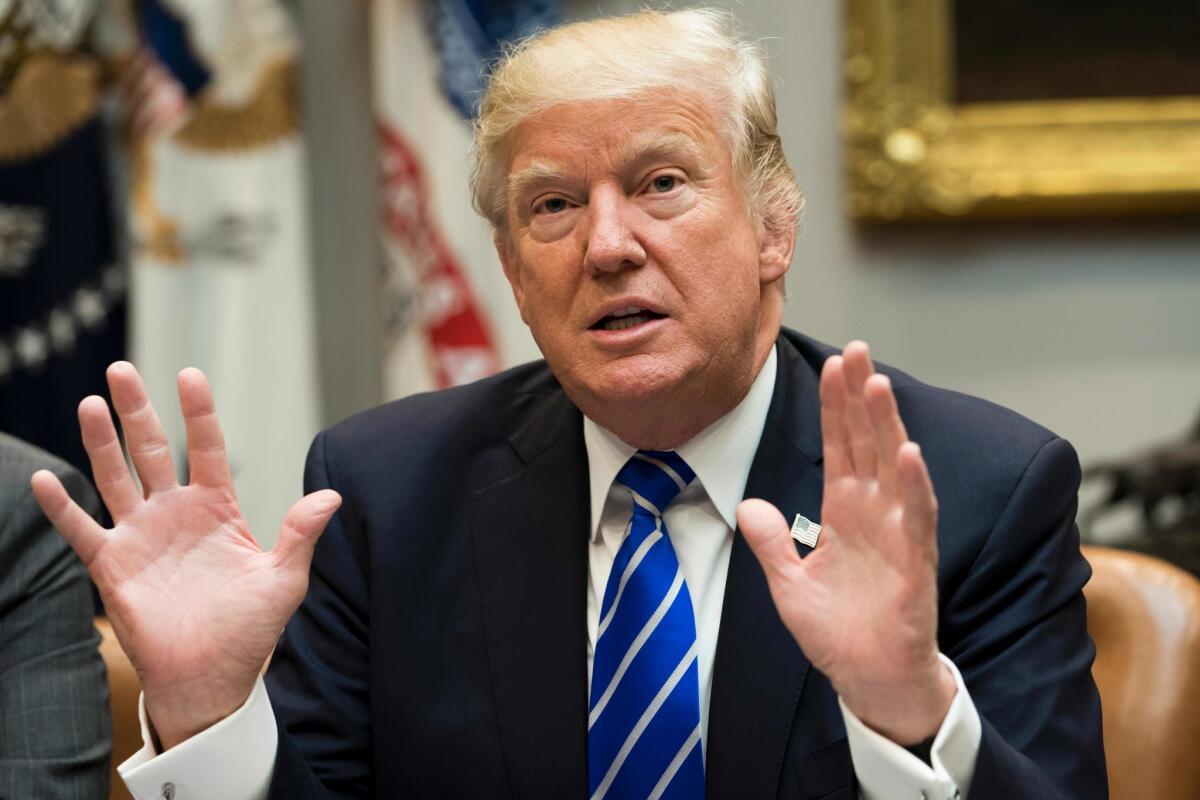
President Donald Trump says he’ll visit hurricane-ravaged Puerto Rico next Tuesday.
Trump announced the visit after the administration came under criticism for its response to the damage on the island that is home to more than 3 million U.S. citizens. The island has been coping with shortages of food, drinking water, electricity and various forms of communication after Hurricane Maria struck earlier this month.
Trump said Tuesday is the earliest he can visit without disrupting recovery operations.
He said he may also visit the U.S. Virgin Islands.
Trump says Puerto Rico is important to him. He says Puerto Ricans are “great people and we need to help them.”
- Share via
Ivanka Trump’s business ties shrouded in secrecy in China
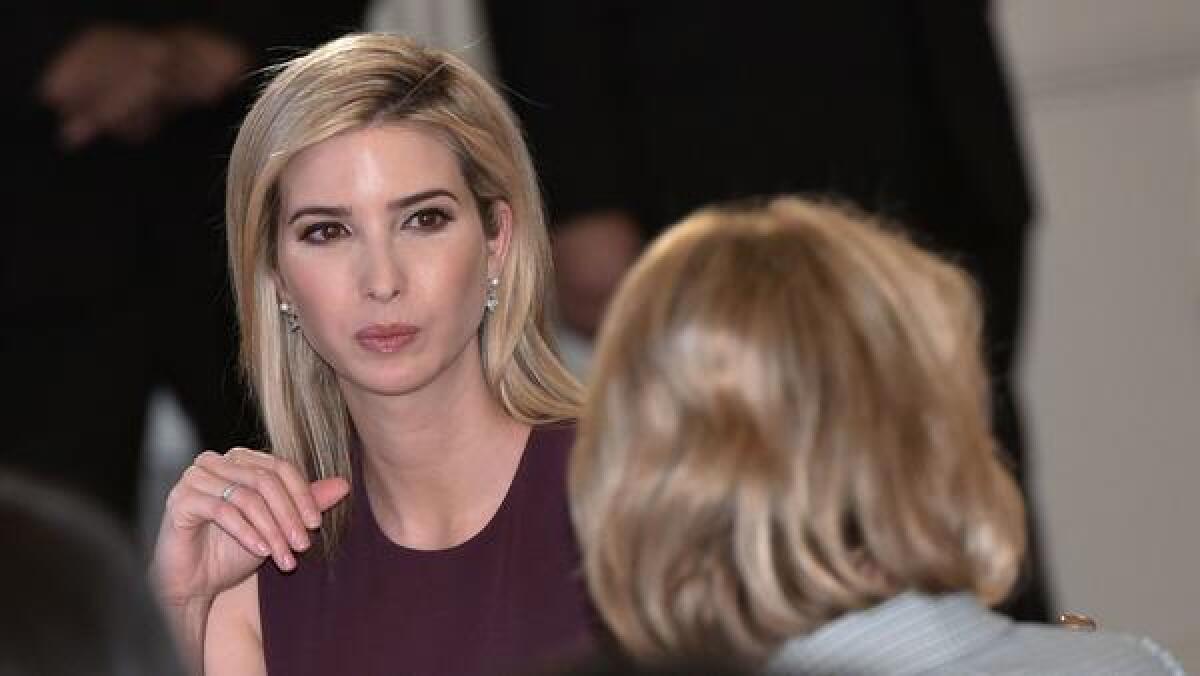
It is no secret that the bulk of Ivanka Trump’s merchandise comes from China. But just which Chinese companies manufacture and export her handbags, shoes and clothes is more secret than ever, according to an Associated Press investigation.
In the months since she took her White House role, public information about the companies importing Ivanka Trump goods to the U.S. has become harder to find. Information that once routinely appeared in private trade tracking data has vanished, leaving the identities of companies involved in 90% of shipments unknown. Even less is known about her manufacturers. Trump’s brand, which is still owned by the first daughter and presidential advisor, declined to disclose the information.
The deepening secrecy means it’s unclear who Trump’s company is doing business with in China, even as she and her husband, Jared Kushner, have emerged as important conduits for top Chinese officials in Washington. The lack of disclosure makes it difficult to understand whether foreign governments could use business ties with her brand to try to influence the White House — and whether her company stands to profit from foreign government subsidies that can destroy American jobs. Such questions are especially pronounced in China, where state-owned and state-subsidized companies dominate large swaths of commercial activity.
“There should be more transparency, but right now, we do not have the legal mechanism to enforce transparency unless Congress requests information through a subpoena,” said Richard Painter, who served as chief White House ethics lawyer for George W. Bush and is part of a lawsuit against President Donald Trump accusing him of constitutional violations. “I don’t know how much money she’s making on this and why it’s worth it. I think it’s putting our trade policy in a very awkward situation.”
- Share via
Trump associate Roger Stone, ahead of House panel appearance, denies colluding with Russia
Longtime Donald Trump associate Roger Stone says there is “not one shred of evidence” that he was involved with Russian interference in the 2016 election.
Stone is defending himself in a lengthy statement released ahead of a closed-door appearance before the House intelligence committee Tuesday. He has also released a series of supporting documents, including direct messages he exchanged with Guccifer 2.0, the unnamed hacker who has taken credit for breaking into Democratic National Committee email servers.
“While some may label me a dirty trickster, the members of this committee could not point to any tactic that is outside the accepted norms of what political strategists and consultants do today. I do not engage in any illegal activities on behalf of my clients or the causes in which I support,” Stone said in the prepared statement. “There is one ‘trick’ that is not in my bag and that is treason.”
Stone, a Republican strategist who has known Trump for many years and informally advised him during the 2016 campaign, also denies he had advance knowledge of the leak of former Clinton campaign chairman John Podesta’s emails and says he never colluded with WikiLeaks founder Julian Assange. He has long denied that he worked with Russian officials to influence the presidential election.
“I recognize that those who believe that there was collusion between the Trump camp and the Russian state, now say Stone, ‘MUST HAVE’ been involved, but that is not based on one shred of evidence,” Stone writes. “This is nothing more than conjecture, supposition, projection, allegation, and coincidence, none of it proven by evidence or fact.”
Stone’s interview comes as the House and Senate intelligence panels are looking into the Russian meddling and possible links to Trump’s campaign. Stone has been part of the investigation partly because he has said he communicated during the presidential campaign with Guccifer 2.0.
Stone is, for the first time, releasing those communications, which he says are “innocuous.” The direct messages on Twitter, exchanged over a monthlong period, show Stone first congratulating Guccifer for being reinstated on Twitter after he was kicked off, and asking that the account retweet a tweet about how the election could be rigged against Trump. Guccifer writes, “I’m pleased to say that u r great man .... please tell me if I can help u anyhow.”
Stone doesn’t respond again until several weeks later, when Guccifer asks him about an article on a Democratic turnout model. Stone replies “pretty standard.”
On WikiLeaks, Stone said he was kept apprised of Assange’s plans to release the Podesta emails by a journalist he said served as an “intermediary.” He did not name the journalist.
Stone has been outspoken in his own defense and asked for his House appearance to be public. But he said the House panel insisted on holding the session behind closed doors.
His statement is heavy with criticism for Rep. Adam Schiff of Burbank, the top Democrat on the House intelligence panel, who suggested in March that Stone had a direct line to Russian hackers based on his comments predicting the release of former Clinton campaign chairman John Podesta’s emails. “Shame on you, Mr. Schiff,” he writes.
As his statement was released, Stone held court with about five dozen supporters at the Trump Hotel on Monday night, taking photos with the group and offering the “V’’ for victory sign at one point.
The House panel will also interview former Trump staffer Boris Epshteyn this week, according to a source familiar with the interview. The person declined to be named because the panel’s meetings are private.
Epshteyn, who grew up in Moscow, worked a short time in the White House press office. He left in March and now works as a political analyst for right-leaning Sinclair Broadcasting.
The interviews come as the House and Senate intelligence panels are looking into Russian meddling and scrutinizing the spread of false news stories and propaganda on social media. The Senate intelligence committee will speak to officials from Twitter on Thursday, also behind closed doors.
- Share via
Analysis: Back into the Trump vortex America goes, where the president fuels a divisive debate
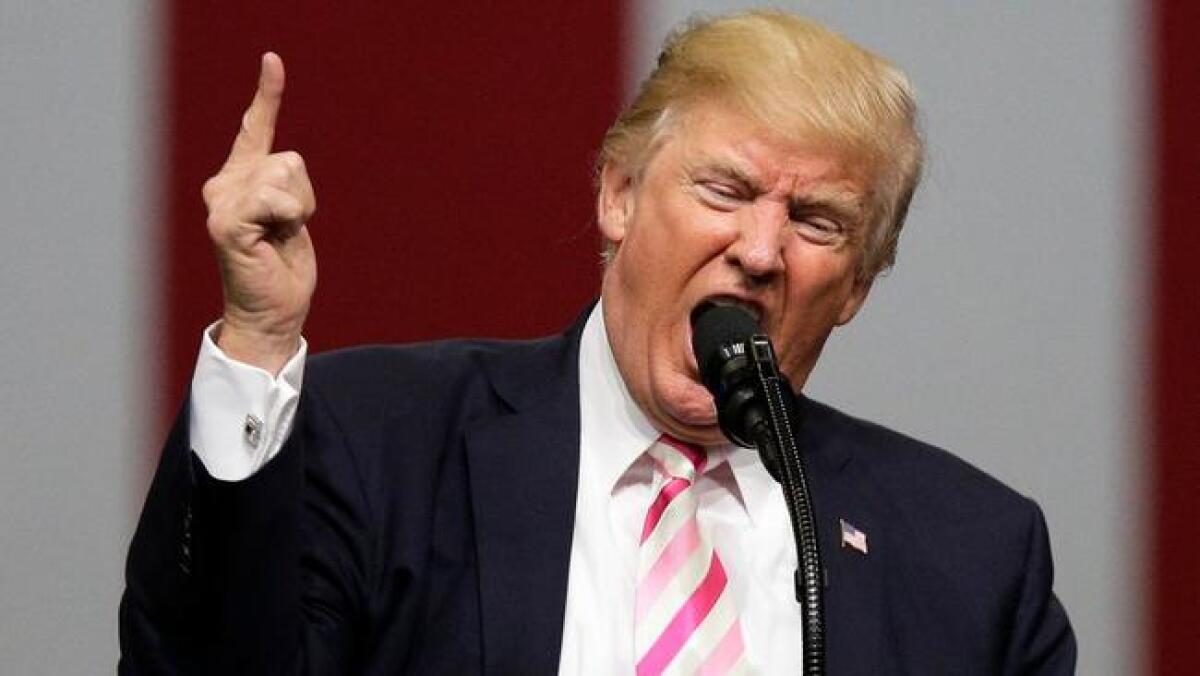
America once again finds itself where it has been so often since the day Donald Trump descended an escalator to a podium at the tower named for him to announce his presidential candidacy: pulled into the vortex of partisanship as a master publicist plays notes of division and dispute.
President Trump’s continued stoking of debate over football players kneeling during the national anthem — and the way the subject has dominated public discussion — raised anew the question that surrounds many Trump controversies: Is this part of a plan? Does he believe he gains political advantage from playing off national divisions on topics as fraught as race relations and patriotism? Or does the resulting chaos deliver personal satisfaction to a president who often appears bored with the more humdrum aspects of his post?
Eight months into Trump’s presidency, there’s no answer. But regardless of his motivation, Trump’s impact on the national psyche has been profound.
It is hard to remember a time when everything wasn’t polarized, but it was not that long ago. There were, to be sure, differences of opinion, sometimes on topics as serious as war and sometimes fiercely fought. But never has partisanship spread so widely across the nation’s mass culture.
- Share via
Trump team’s travel perks are costing taxpayers mightily. Here’s why there’s little outrage
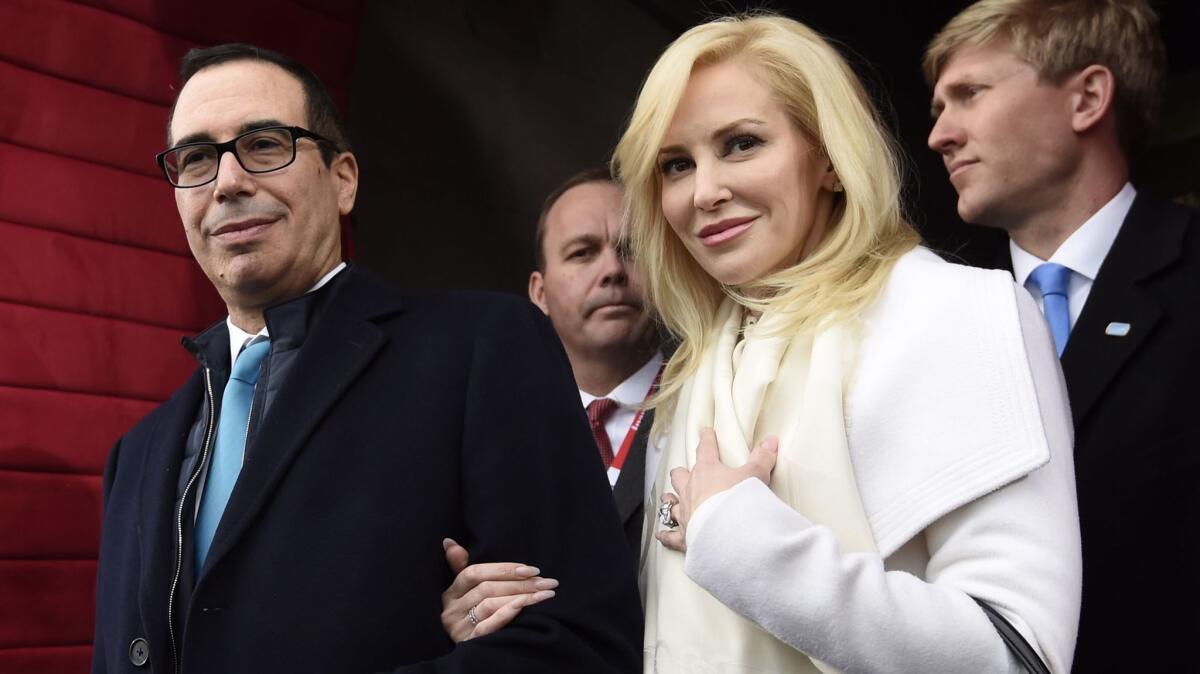
The Treasury secretary requested a military plane for his European honeymoon. The head of Health and Human Services ran up a six-figure tab flying around the country on private jets. The chief of the Environmental Protection Agency dinged taxpayers for repeated excursions back home to Oklahoma.
In normal times, Washington’s scandal machinery would be kicking into high gear. Mounting outrage — some real, some calculated — would lead to months of hearings and calls for criminal investigations.
The abundant wealth of two of the fancy fliers, Treasury Secretary Steven T. Mnuchin and Health Secretary Tom Price, would only amplify the criticism.
But the unceasing turmoil of Donald Trump’s presidency has muted the outcry.
It’s hard for the champagne tastes of a Cabinet secretary to garner much attention when the president is picking a racially tinged fight with pro athletes, drawing plaudits from white supremacists, battling a special prosecutor probing Russia’s role in his election and warning that he might nuke North Korea.
- Share via
White House pushes back on report that aides warned Trump not to insult North Korea’s leader
A recent report by the Los Angeles Times that aides had warned President Trump not to personally attack North Korea’s leader, Kim Jong Un, was a “false narrative,” the president’s spokeswoman said on Monday.
But Sarah Huckabee Sanders, the White House press secretary, did not deny the facts of the story. The Times reported on Friday that some top aides, including national security advisor H.R. McMaster, told Trump before his debut speech at the United Nations General Assembly Sept. 19 that attacking Kim Jong Un personally could escalate tensions and shut off any chance for negotiations over North Korea’s nuclear missile program.
Trump ignored them. Some of the most incendiary lines from his speech -- including calling Kim “Rocket Man” on “a suicide mission” and threatening to “totally destroy” North Korea -- were not in a speech draft that several senior officials reviewed and vetted the day before the president spoke.
“The national security team was involved and engaged throughout the speech-writing process, and was very happy with the president’s speech at the U.N.,” Sanders told White House reporters when asked about The Times story.
Some of Trump’s national security advisors believe Trump’s personal jabs at the unpredictable and ruthless Kim has propelled the crisis to a new stage.
Last last week, Kim verbally retaliated, calling Trump “a mentally deranged U.S. dotard” and a “gangster.”
The escalation of insults threatens to scuttle a months-long international effort to squeeze Pyongyang’s economy through sanctions designed to force Kim to the negotiating table.
Trump continued to dress down Kim over the weekend, calling the young despot “Little Rocket Man” Friday night at a campaign rally for Republican Sen. Luther Strange in Huntsville, Ala., and again on Twitter on Saturday.
- Share via
Press Secretary Sarah Huckabee Sanders: U.S. has ‘not declared war’ on North Korea
It’s never appropriate for a country to shoot down another country’s aircraft when it’s over international waters. Our goal is still the same. We continue to seek the peaceful denuclearization of the Korean peninsula.
— Press Secretary Sarah Sanders
- Share via
In an Alabama radio interview, Trump lets loose on Republicans as he tries to exert influence in Senate race
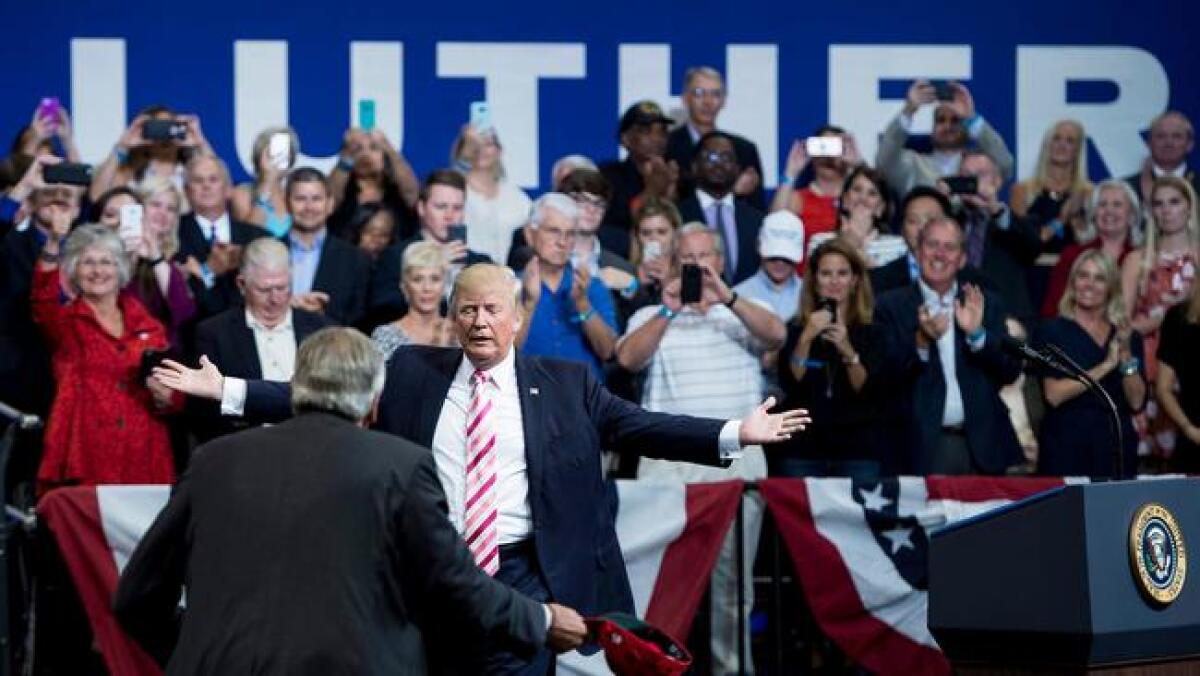
In an effort to boost his favored candidate in Tuesday’s special U.S. Senate election in Alabama, President Trump on Monday criticized Senate Majority Leader Mitch McConnell, Sen. John McCain and other Republicans for failing to pass healthcare legislation.
Trump told radio listeners of Alabama’s “Rick and Bubba Show” that Republicans had passed scores of bills to repeal the Affordable Care Act when they were doomed by President Obama’s veto.
But Senate Republicans had stumbled now that Trump was prepared to sign a bill to replace Obamacare.
“Now, when it matters, because you have a president who’s actually going to sign it, they don’t do it and they pander and they grandstand,” he said.
He repeatedly targeted McCain, who voted against the last Republican healthcare proposal and has said he will vote against the Graham-Cassidy repeal measure this week.
“What McCain has done is an extreme slap in the face of the Republican Party,” Trump said. “Extreme.”
He praised the current proposal - which was partly rewritten early Monday before its only Senate hearing - as “a great bill” that he suggested was doomed.
“So we’re going to lose two-three votes and that’s the end of that,” Trump said after reminding the audience that Republicans, holding 52 seats, had only a narrow margin for passage.
Trump called into the show, which he touted as “the biggest show in Alabama,” to bolster Luther Strange’s flagging campaign. Vice President Mike Pence separately campaigned for Strange in the state.
Strange is running to win outright the seat to which he was appointed earlier this year when Jeff Sessions left the Senate to become U.S. attorney general.
Trump gave a fiery speech at a Friday night rally in Huntsville on behalf of Strange, who is trailing former state chief justice Roy Moore in almost all pre-election polls.
In his speech, Trump said Strange was better positioned to defeat a Democratic candidate in a runoff, an argument he reiterated Monday.
Trump told his Huntsville audience that Strange and Moore were “both good men” and that if Moore won the nomination, “I’m going to be campaigning like hell for him.”
On Monday, Trump called Moore “Ray” twice before he was corrected by the radio show host, and contended he knew little about him.
“I don’t know Roy Moore at all and I think it’s perhaps indicative when somebody doesn’t even know his name—that’s not a good sign for him,” Trump said. “I know there’s great controversy and a lot of angst but I don’t really know that much about Roy Moore.”
The Alabama campaign has put Trump in the difficult position of siding with the Republican establishment he usually chafes against. He has repeatedly praised Strange’s loyalty to him and his agenda, but as a sitting senator Strange is backed by McConnell and other Republican leaders with whom Trump has rocky relations.
It is Moore who more closely resembles Trump stylistically and in his penchant for embroiling himself in controversy.
Twice Moore lost his office for flaunting court decisions, one on his erection of a Ten Commandments monument on courthouse grounds and a second time for blocking gay marriage.
Several prominent Trump backers, including former White House strategist Steve Bannon, former Alaska Gov. Sarah Palin, and Housing and Urban Development Secretary Ben Carson, are backing Moore.
Trump’s main effort before Tuesday’s vote has been to establish Strange’s independence from McConnell, whose allies have dumped millions of dollars into the race for advertising and other efforts on Strange’s behalf.
“As you know Mitch is not, polling-wise, the most popular guy in the country,” Trump said. He added of Strange: “They like to label him Mitch’s best friend in the Senate and he hardly even knows him. He’ll be fighting Mitch—I know he’s going to fight him on that ridiculous filibuster rule.”
McConnell has stuck to Senate tradition requiring 60 votes for most actions, a posture that Trump has angrily denounced.
During his 15-minute conversation with the radio hosts, Trump touted a tax plan he said would be released Wednesday as “the largest tax cuts in the history of our country” and said that his administration was “doing great.”
“I don’t think any president’s accomplished what we’ve accomplished,” he said. “And yet I’m always bucking the system. I’m fighting the system. I’m fighting Republicans as much as Democrats.”
As the interview came to an end, host Rick Burgess asked Trump if he would offer an endorsement of the show, although Burgess noted it might not be appropriate for a president to do so.
Trump was game.
“This is Donald Trump, president of the United States,” he said. “I love the state of Alabama and you’re listening to the Rick and Bubba show. And enjoy it and if they ever switch allegiance please do not run this whatever-it-is.”
And, he added, “Good luck to Luther.”
- Share via
North Korea’s top diplomat says Trump has ‘declared war’ on his country
North Korea’s top diplomat said Monday that President Trump’s tweet that leader Kim Jong Un “won’t be around much longer” was a declaration of war against his country by the United States.
Foreign Minister Ri Yong Ho told reporters that what he called Trump’s “declaration of war” gives North Korea “every right” under the U.N. Charter to take countermeasures, “including the right to shoot down the United States strategic bombers even they’re not yet inside the airspace border of our country.”
Ri referred to Trump’s tweet Saturday that said: “Just heard Foreign Minister of North Korea speak at U.N. If he echoes thoughts of Little Rocket Man, they won’t be around much longer!”
Ri said: “The question of who won’t be around much longer will be answered then.”
- Share via
McCain says his brain cancer prognosis is ‘very poor’
Sen. John McCain says doctors have given him a “very poor prognosis” as he battles brain cancer.
McCain underwent surgery in July for a brain tumor that was later found to be a form of glioblastoma, the same type of cancer that took the life of his former Senate colleague Edward M. Kennedy in 2009.
McCain toldss CBS’ “60 Minutes” in an interview that aired Sunday night that he thinks about Kennedy a lot. He said Kennedy continued to work despite the diagnosis and “never gave up because he loved the engagement.”
McCain said he has “feelings sometimes of fear of what happens,” but counters that with gratitude for having “had a great life.”
He added: “It’s not that you’re leaving, it’s that you — that you stayed.”
- Share via
Revised health care bill would send more money to states with holdout senators
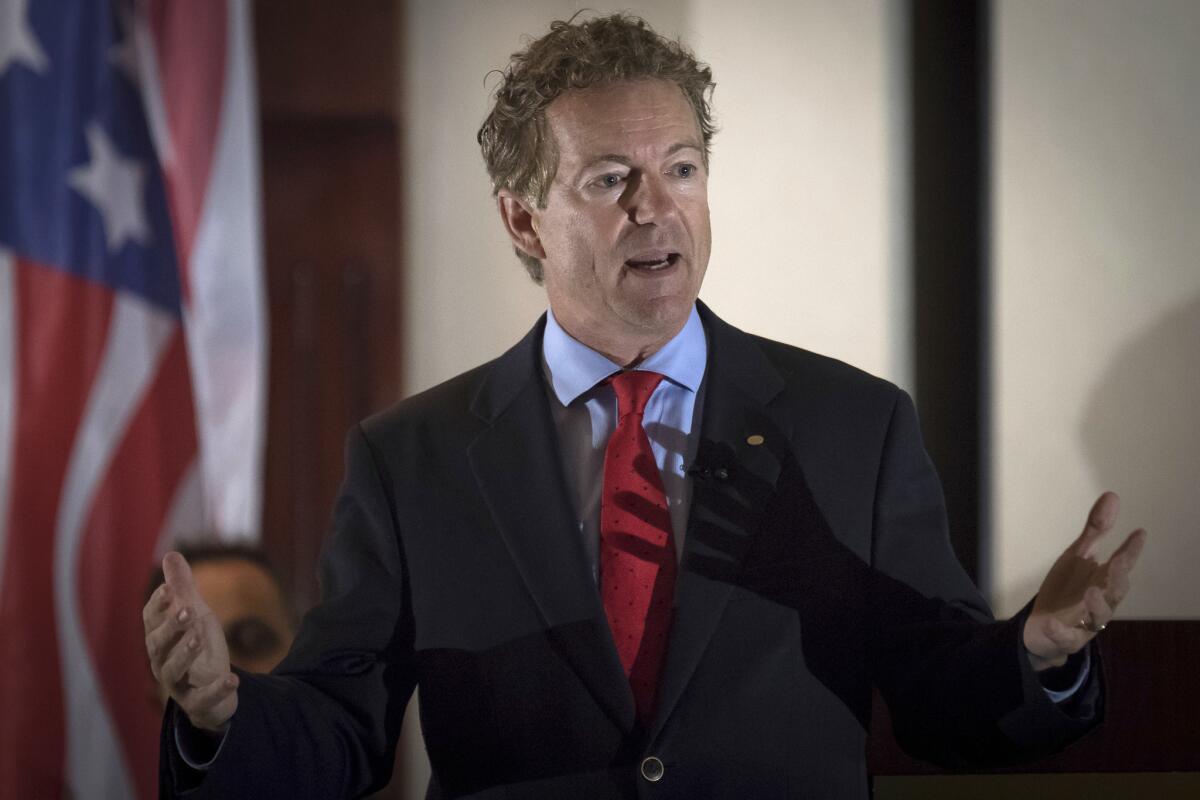
Senate Republicans are adding billions of dollars to their teetering health care bill, hoping to win support from GOP senators who may be opposing the legislation.
According to documents obtained by The Associated Press, a new version of the measure would add $14.5 billion for states.
Part of that money is aimed at sparsely populated states. Maine GOP Sen. Susan Collins on Sunday all but closed the door on supporting the bill, while Alaska Republican Sen. Lisa Murkowski is undecided.
A table says Arizona would get 14% more money than under President Obama’s law, Kentucky 4% more and Texas 49% more.
Sens. John McCain of Arizona, Kentucky’s Rand Paul and Texas’ Ted Cruz have all expressed opposition to the bill.
Democrats say the numbers are misleading.
- Share via
Jared Kushner used personal email for some White House communication, lawyer says

President Trump’s son-in-law, Jared Kushner, used his personal email account on dozens of occasions to communicate with colleagues in the White House, his lawyer said Sunday.
Between January and August, Kushner received or responded to fewer than 100 emails from White House officials from his private account, attorney Abbe Lowell said in a statement that confirmed Kushner’s use of a personal address in the first months of the administration.
The use of a private email account to discuss government matters is a politically freighted issue that factored prominently in last year’s presidential election. Trump repeatedly attacked Democratic opponent Hillary Clinton for setting up a private email server as secretary of state, a decision that prompted an FBI investigation that shadowed her for much of the campaign.
In Kushner’s case, Lowell said, the emails to and from his private account usually involved “forwarded news articles or political commentary and most often occurred when someone initiated the exchange by sending an email to his personal, rather than his White House, address.”
The attorney said Kushner, a key aide to Trump, uses his White House address to discuss White House business and that any non-personal emails were forwarded to his official account and “all have been preserved in any event.”
Politico first reported Kushner’s use of a personal email account.
Trump repeatedly argued during the campaign that Clinton deserved to be prosecuted for mishandling classified information, frequently deriding her as “Crooked Hillary,” and has continued to suggest that even after being elected president.
Former FBI Director James B. Comey said that though Clinton and her aides were “extremely careless” in their handling of classified material, there was no evidence that anyone intended to break the law, and he recommended against criminal prosecution. The Justice Department accepted that conclusion.
At a political event in Alabama on Friday, Trump responded to supporter chants of “Lock her up” by saying, “You’ve got to speak to [Atty. Gen.] Jeff Sessions about that.”
- Share via
Trump administration expands travel ban to North Korea and Chad
Travelers from eight countries will face restrictions on entry to the U.S, ranging from a total ban to more targeted restrictions, under a new proclamation signed by President Trump on Sunday.
The new rules will affect the citizens of Chad, Iran, Libya, North Korea, Somalia, Syria, Venezuela and Yemen. It will go into effect Oct. 18.
Officials emphasized that valid visas would not be revoked as a result of the proclamation.
Some countries will face full bans. Others are more tailored, such as Venezuela’s, which will apply only to certain government officials and their families
Trump’s controversial ban on visitors from six Muslim-majority countries expires Sunday, 90 days after it went into effect.
- Share via
Trump cites previously unreported figures for ‘terrific’ tax plan
President Trump said Sunday the White House has “totally finalized” a tax plan, but the particulars differed substantially from what has been reported about the proposal.
“I think it’ll be terrific.… I think it’s going to go through, and it will be the largest tax cut in the history of the country,” the president told reporters as he prepared to return to the White House from his New Jersey golf resort.
Trump said he hoped for a corporate tax rate of 15%, a figure he has used before. Congressional officials have said they hope to cut the current rate of 35% to 20%.
Asked whether the finalized plan in fact called for a rate of 15%, Trump said: “We’ll see what happens. But I hope it’s going to be 15%.”
Trump added that such a cut in the corporate rate would “bring jobs back into our country,” a premise that many economists question.
The president also said the individual rate would be 10% or 12%, “much lower than it is right now.”
Reports have said the plan calls for lowering the top bracket for individuals to 35% from what is currently 39.6%. It was not clear if Trump was disclosing what rates in other tax brackets would be or citing figures that are no longer under discussion.
Trump has said previously that the plan would not cut taxes for the wealthiest Americans, and Democrats have said they would not support a blueprint that did so.
- Share via
Trump on his role in kneeling-protest controversy: ‘Nothing to do with race’
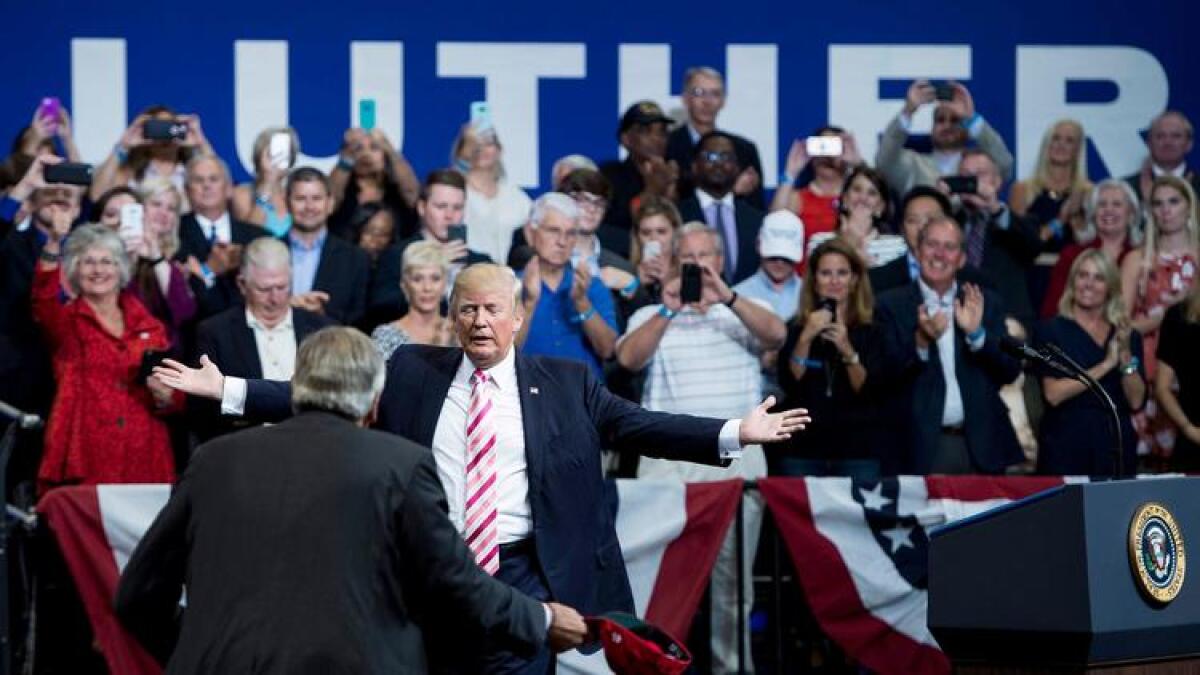
President Trump declared Sunday that his strident speech in Alabama two days earlier, in which he denounced protests carried out mostly by African American pro football players, as well as a series of vehement tweets since then, had nothing to do with race.
Trump has carefully avoided overt mentions of race during days of angry criticism of players who kneel during the national anthem to protest racial injustice — or in some cases to protest being told they don’t have the right to protest.
But African Americans are a large majority in the National Football League, and made up nearly all the 130 players who knelt, sat or raised a fist in defiance before or during Sunday’s NFL games.
Afterward, asked by reporters if he was inflaming racial tensions, Trump replied with an emphatic negative.
“This has nothing to do with race,” he said as he prepared to board Air Force One for a short flight back to Washington after a weekend at his golf resort in New Jersey. “I never said anything about race. This has nothing to do with race or anything else.”
He added: “This has to do with respect for our country and respect for our flag.”
Many of the protesting players have tweeted or made statements to the effect that they mean the flag no disrespect, but that they believe racial injustice degrades American values.
At his Alabama speech, Trump told cheering supporters, nearly all of whom were white, that any protesting “son of a bitch” at an NFL game should be ordered off the field and fired. Asked Sunday whether he was troubled by criticism of that statement by his friend, New England Patriots owner Robert Kraft, the president said no.
“He’s a good friend of mine, and I want him to do what he wants to do,” he said of Kraft. He again depicted failing to stand for the anthem as a sign of disrespect for “our soldiers, our first responders.”
A number of military veterans have been among those offering online support to the protesting players.
- Share via
Defections from right, center worsen prospects for latest GOP Obamacare repeal measure
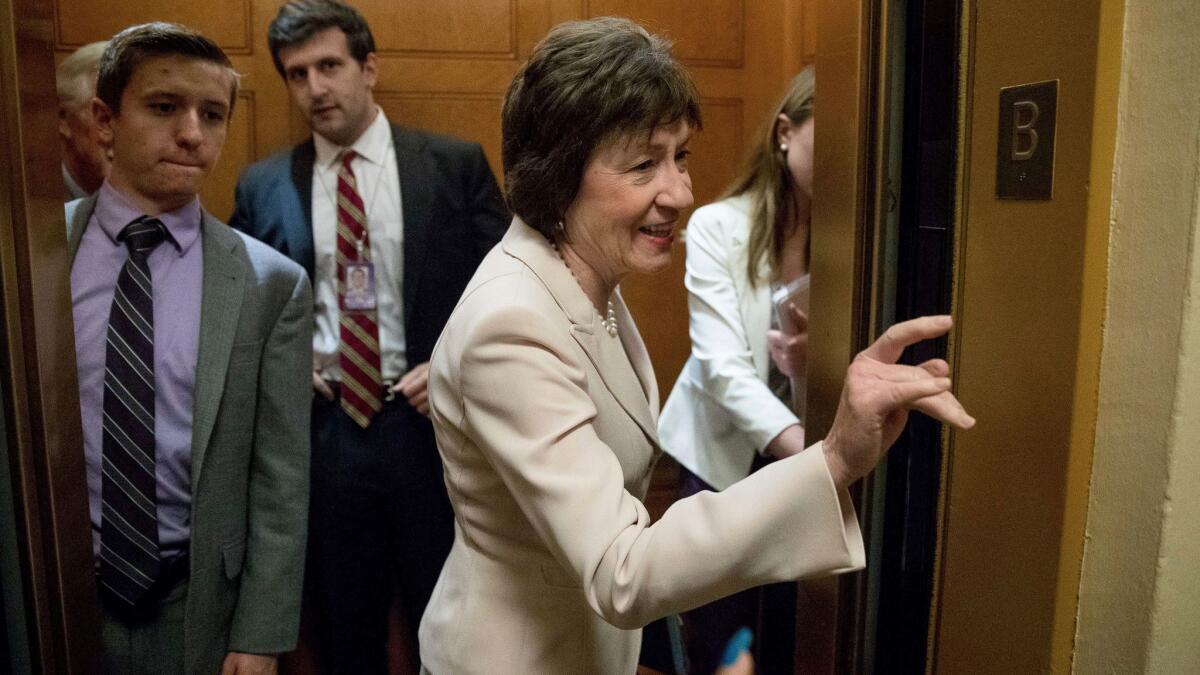
The already faltering prospects for the latest GOP-backed plan to repeal the Affordable Care Act worsened Sunday as a prominent Republican moderate and a leading conservative each indicated they were leaning against voting for it.
In an interview aired Sunday on CNN’s “State of the Union,” Sen. Susan Collins (R-Maine) said she wanted to see an analysis by the Congressional Budget Office before finally making up her mind on the measure, but that it would be “very difficult” to see voting for it. Previous CBO analyses of GOP plans have forecast millions of people being left unable to afford coverage.
Separately, at an appearance in his home state of Texas, Sen. Ted Cruz said that “right now they don’t have my vote.” Cruz said he did not think Sen. Mike Lee (R-Utah) was supporting the bill either.
Two other Republican senators, John McCain of Arizona and Rand Paul of Kentucky, have already said they would not support the current version of the bill, the third attempt by Senate GOP leaders to scrap the Affordable Care Act, the signature legislative achievement of President Obama.
With 52 Republicans in the Senate and no Democratic support for repealing Obamacare, the bill can afford to lose only two GOP votes.
“It’s very difficult for me to envision a scenario where I would end up voting for this bill,” Collins said in the CNN interview. “I have a number of serious reservations about it.”
Paul, interviewed on NBC’s “Meet the Press,” said he has always wanted to repeal Obamacare, but that the latest bill, by South Carolina Sen. Lindsey Graham and Louisiana Sen. Bill Cassidy, “sets up a perpetual food fight” over the formula for healthcare spending.
Asked if he could envision changes that would allow him to support the bill, Paul said he might be able to if the bill’s central element, block grants to states to cover healthcare spending, were eliminated — an unlikely prospect.
Graham and Cassidy, interviewed on ABC’s “This Week” said they had not yet abandoned the bill and suggested that they could still work out an agreement with Paul. They also said they were continuing to discuss the bill with Sen. Lisa Murkowski of Alaska, who has not declared a position but has said she has considerable doubts about the proposal.
- Share via
Treasury secretary defends Trump rhetoric on North Korea
Treasury Secretary Steve Mnuchin defended President Trump’s mode of dealing with North Korea, insisting Sunday that heated rhetorical exchanges with reclusive despot Kim Jong Un were not making a volatile situation more dangerous.
“This is not about personalities; this is not personal,” Mnuchin said on ABC’s “This Week.”
For the last week, Trump has used various forums, including a high-profile speech to the United Nations General Assembly, to belittle Kim as “Rocket Man.”
The North Koreans have responded with a volley of insults, including calling Trump a “dotard,” meaning a mentally feeble old person, coupling that with new threats to attack the United States.
In the ABC interview, Mnuchin parried questions about Saturday’s flight by U.S. B-1B bombers and F-15C fighter jets over waters north of the demilitarized zone dividing the Korean peninsula. The Pentagon described the warplanes’ deployment as being in response to “reckless behavior” by Kim’s government.
Mnuchin, echoing language frequently used by White House aides as North Korea tensions have escalated, said Trump had a wide variety of options for dealing with Kim and his nuclear ambitions and ballistics program.
“The president has said everything’s on the table,” he said.
Late Saturday, Trump tweeted a reference to a speech earlier in the day by North Korea’s foreign minister, Ri Yong Ho.
“Just heard Foreign Minister of North Korea speak at U.N.,” the said on Twitter. “If he echoes thoughts of Little Rocket Man, they won’t be around much longer!”
Queried by ABC interviewer Martha Raddatz about whether the president’s bellicose language was causing the public to question his ability to deal effectively with North Korea, Mnuchin replied: “I can assure you, the president’s No. 1 priority is the safety of the American people and our allies.”
- Share via
NFL players again ‘take a knee’ as Trump renews his attacks
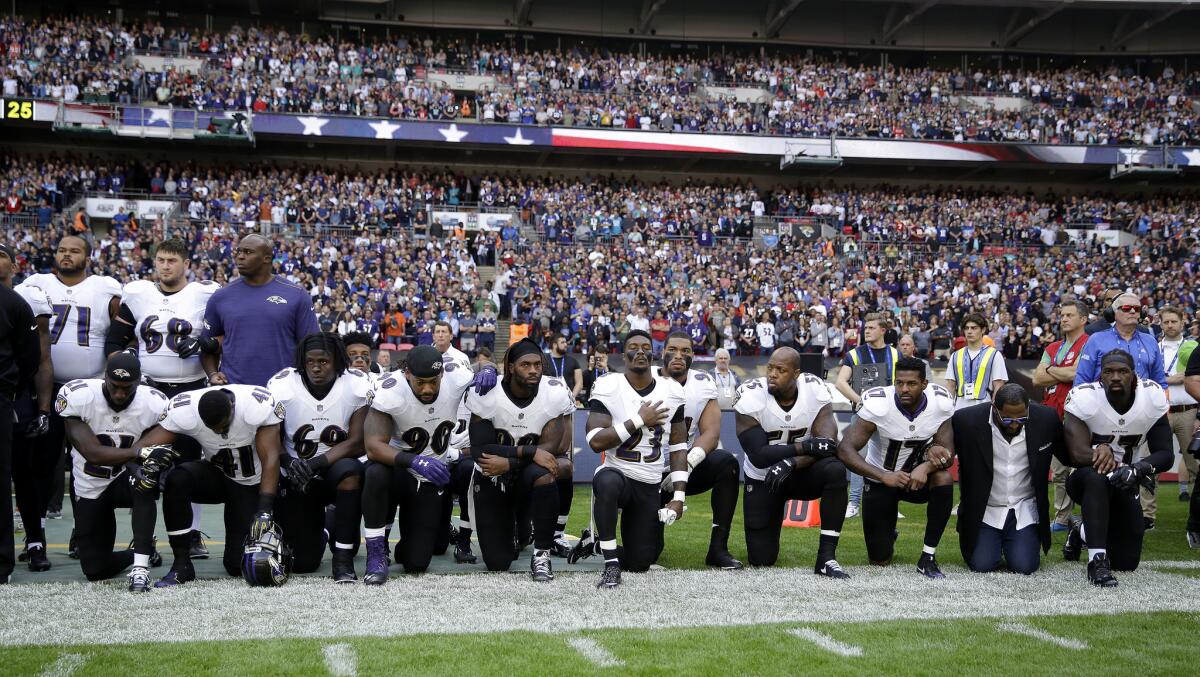
In silent rebuttal of criticism from President Trump, NFL players in the sport’s first game of the day kneeled during the national anthem, while other locked arms in solidarity.
The opening moments of the game, played in London, featured numerous players from both the Baltimore Ravens and the Jacksonville Jaguars kneeling. Their protest came just hours after Trump fired off a pair of early-morning tweets again assailing professional athletes who have staged “take a knee” protests during the playing of the national anthem, and urging fans to shun games.
Trump’s attacks brought a strongly worded rebuttal from an NFL owner who is close to the president: New England Patriots CEO and owner Robert Kraft, who complimented players and said he was “deeply disappointed” by the tone of Trump’s comments on Friday. Kraft said he supported players’ rights to “peacefully affect social change and raise awareness.”
Kraft has been a significant donor to Trump’s campaigns and once gave Trump a Super Bowl ring. The criticism from him, which was issued in his own name, rather than simply as a statement from the team, provided a further indication of of how deeply Trump’s statements of the last 48 hours have alienated him from professional football.
In his tweets Sunday, Trump also suggested that any drop in NFL game attendance was due to the disgruntlement of fans who objected to the protests, originally intended to call attention to police shootings of unarmed black men and to the Black Lives Matter movement.
He also repeated his previous contention that rules meant to protect players from traumatic brain injuries had made professional football “boring.”
The president ignited the racially charged controversy on Friday night with a campaign-style speech in Alabama in which he referred to any player taking part in such protests as a “son of a bitch.”
That drew a fusillade of criticism on Saturday from pro athletes who have taken part in the protests, their supporters and a number of major league franchise owners, and a succession doubling-down tweets from Trump.
On Sunday, Sen. Rand Paul (R-Ky.) said he thought Trump’s quarrel with the NFL was ill advised.
“If I were president, I probably would not get involved in this,” Paul said in an appearance on NBC’s “Meet the Press.”
The president’s surrogates hurried to his defense on Sunday, with Treasury Secretary Steve Mnuchin saying Trump was right to decry the “take a knee” protests as disrespectful.
“They can do free speech on their own time,” Mnuchin said of the professional athletes involved, speaking on ABC’s “This Week.”
Asked about the president’s use of a profanity to describe the protesting players, Mnuchin said: “I think the president can use whatever language he wants to use.”
Mnuchin’s comments then drew a sharp riposte from Rep. Ted Lieu (D-Torrance), who said on Twitter that the treasury secretary did not seem to understand First Amendment protections.
“I am beginning to think that in govt, you are stupid as a rock,” Lieu tweeted. “US Constitution also applies to NFL players. Get it?”
UPDATES
8: 13: a.m.: This post was updated with comment from Rep. Ted Lieu.
7:10 a.m.: This post was updated with comments from Treasury Secretary Steve Mnuchin.
6:40 a.m.: This post was updated with details from the Ravens-Jaguars game in London.
- Share via
Trump’s pregame tweets urge fans to boycott NFL games if protests continue
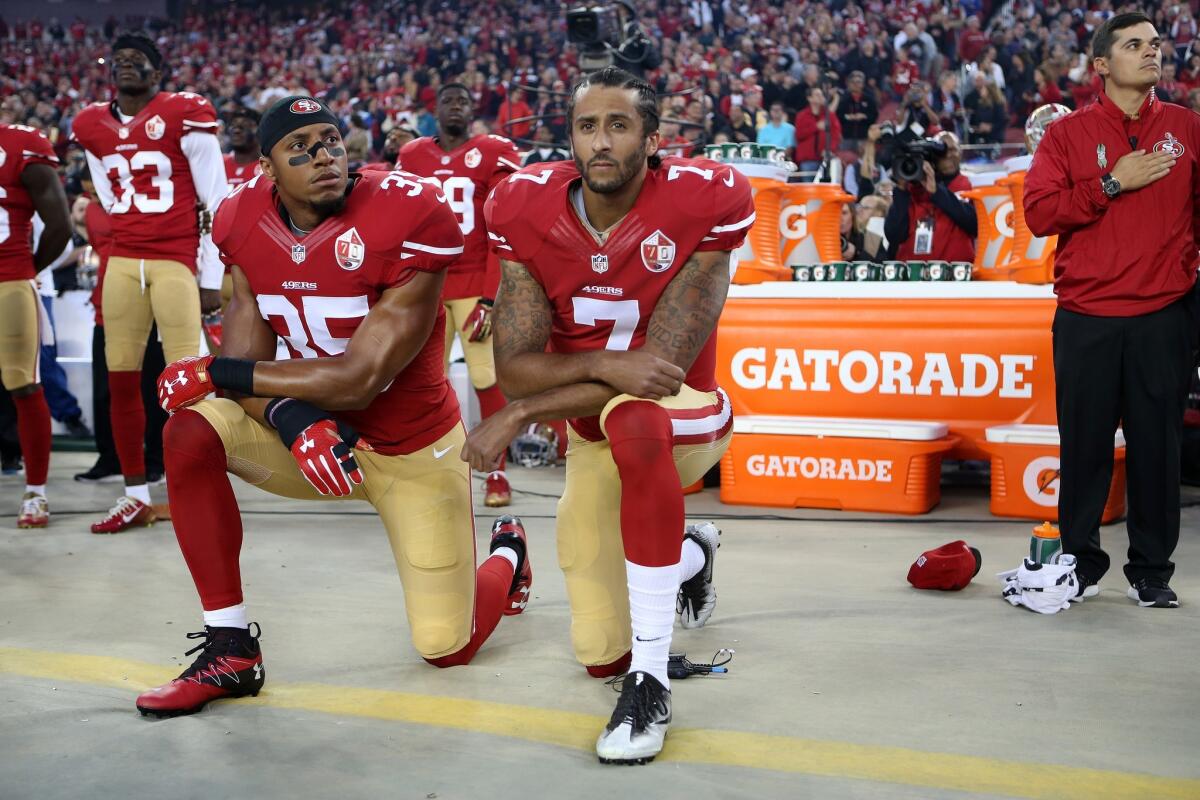
It’s Sunday, and President Trump is ready for some football — but it sounds as though he’ll be watching to see who kneels for the national anthem.
Two days after a fiery speech in Alabama in which he called for NFL owners to discipline players who protest during “The Star Spangled Banner,” Trump fired out two early tweets urging fans to boycott games “until players stop disrespecting our Flag & Country.”
- Share via
Analysis: In Trump’s bully pulpit, it’s ‘us’ vs. ‘them,’ with race often used as a device to polarize
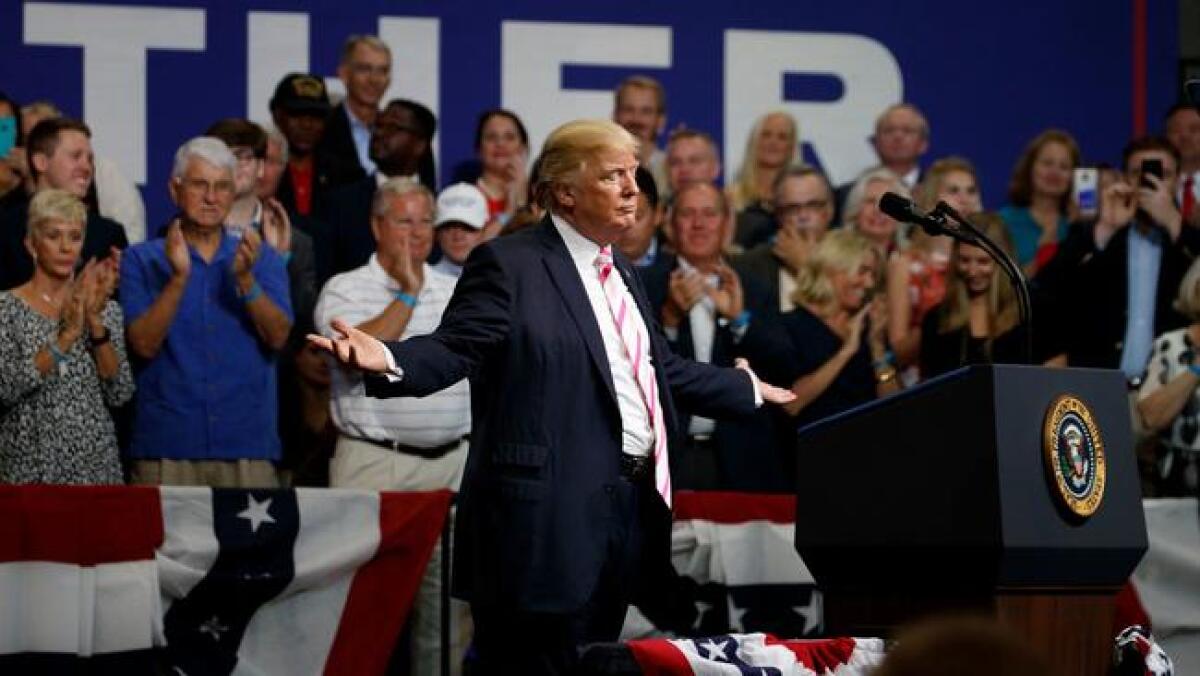
For much of his time as president, Donald Trump has been the bully in the bully pulpit, castigating targets foreign and domestic. Much of Trump’s bluster attempts to divide people into us-against-them, and it often has a single polarizing agent: race.
On Friday night, as he has many times before, Trump inflamed an almost exclusively white Southern audience against opponents who he said were trying to steal their heritage and attack their values. In that Alabama speech and on Saturday, he criticized African American athletes who had exercised free speech by declining to stand during the national anthem.
His racially oriented statements seem to reflect Trump’s embrace of the world as it was decades ago when power was largely held by men like him.
By the sheer bulk of his comments, Trump has reversed what had been a trend in politics over several decades: Racial appeals have grown less overt, not more. Trump’s targets in the last week, by contrast, have included Golden State Warriors star Stephen Curry, unemployed NFL quarterback Colin Kaepernick and ESPN anchor Jemele Hill — all African Americans.
- Share via
Amid war of words, U.S. warplanes fly near North Korea in a rare show of force
American bomber and fighter jets flew along North Korea’s eastern coastline Saturday in a “show of force” that was closer to the rogue nation’s border than any other mission this century, the Pentagon reported.
The rare predawn flight came amid heightened tensions between Pyongyang and Washington and follows a North Korean threat to detonate a hydrogen bomb in the Pacific Ocean.
Dana White, chief Pentagon spokeswoman, said in a statement Saturday that U.S. B-1 bomber and F-15 fighter jets launched from airfields in the region and flew in international airspace over waters east of North Korea.
“This mission is a demonstration of U.S. resolve and a clear message that the president has many military options to defeat any threat,” White said. “North Korea’s weapons program is a grave threat to the Asia-Pacific region and the entire international community.”
The Pentagon issued several photos of the sleek fighter and bomber jets streaking across the darkened sky toward the Korean Peninsula.
While the U.S. military routinely conducts such missions in response to North Korean missile and nuclear tests, this flight was the “farthest north of the Demilitarized Zone any U.S. fighter or bomber aircraft [has] flown off North Korea’s coast in the 21st century, underscoring the seriousness with which we take [North Korea’s] reckless behavior,” White said.
The Demilitarized Zone is a strip of land on the Korean Peninsula that separates North and South Korea. It is frequently the scene of military exercises when tensions rise, as has been the case since President Trump took office.
After the military flights Saturday, North Korea’s foreign minister, Ri Yong Ho, spoke to the United Nation General Assembly in New York and called Trump “a mentally deranged person full of megalomania” who is holding “the nuclear button.”
Ri’s comments further escalated a the war of words instigated this week when Trump described North Korean leader Kim Jong Un as “Rocket Man” on “a suicide mission.”
Trump also used his first address to the United Nations n to threaten to “totally destroy” North Korea.
The inflammatory statements were not in a draft of the speech that several senior officials had earlier reviewed and vetted, The Times reported.
Kim lashed back at Trump in a rare personal statement Thursday, calling Trump “a mentally deranged U.S. dotard” and a “gangster” who had to be tamed “with fire.”
The same day, Trump announced new U.S. sanctions against other countries, foreign businesses and individuals that do business with North Korea, a move likely to primarily affect China, Pyongyang’s largest trading partner.
The sanctions were in response to North Korea’s underground test this month of what was believed to be a hydrogen bomb and the nation’s continued ballistic missile tests, several of which have involved missiles fired over northern Japan.
- Share via
Trump pulls White House invitation from Golden State Warriors after Curry said he opposed accepting it

President Trump on Saturday withdrew his invitation to the NBA champion Golden State Warriors to visit the White House, blaming the team’s star, Stephen Curry, for “hesitating” about accepting the offer.
Trump’s move appeared preemptory as the team was expected to vote to decline the traditional White House offer extended to sports champions after Curry said Friday he would oppose a visit.
Curry, who has been critical of Trump, said that he hoped to send a message by snubbing the White House invitation “that we don’t stand for basically what our president has – the things that he’s said and the things that he hasn’t said in the right times, that we won’t stand for it.”
Warriors coach Steve Kerr also has said he’d prefer not to attend a White House event with Trump.
Cleveland Cavaliers star LeBron James took to Twitter to criticize Trump, calling him a “bum.”
“Going to the White House was a great honor until you showed up!” James tweeted.
On Friday night, Trump publicly criticized African American National Football League players such as Colin Kaepernick who have been kneeling during the national anthem to protest the nation’s racial disparities.
Trump urged NFL owners to fire the players and encouraged fans to walk out in their own protest.
“That’s a total disrespect of our heritage. That’s a total disrespect of everything that we stand for,” Trump told a rally in Alabama, where he was campaigning for Republican Sen. Luther Strange.
“Wouldn’t you love to see one of these NFL owners, when somebody disrespects our flag, you’d say, ‘Get that son of a bitch off the field right now. Out! He’s fired,” Trump said to loud applause.
8:57 a.m.: This post was updated with comments from LeBron James.
- Share via
Trump says McCain ‘let down’ Arizona and friend Lindsey Graham in opposing latest GOP healthcare bill
President Trump on Saturday slammed John McCain for delivering an apparent fatal blow to the latest GOP healthcare legislation, saying the Arizona Republican “let down” his state and the bill’s sponsor by announcing his opposition.
In a series of early-morning tweets, Trump also indicated he isn’t giving up on pushing the last-ditch Obamacare replacement through the Senate next week by publicly urging two other Republican opponents to support it.
But the president focused Saturday on McCain, who raised Trump’s ire in July by surprisingly casting a last-minute no vote that killed an earlier Republican attempt to replace the Affordable Care Act.
Trump, who said in July 2015 that the former Vietnam prisoner of war wasn’t a war hero, took aim Saturday at McCain’s loyalty to his party and his close Senate friend, Sen. Lindsey Graham (R-S.C.).
The healthcare bill is sponsored by Graham and Sen. Bill Cassidy (R-La.).
On Friday, McCain announced that he could not “in good conscience” vote for the legislation, which is opposed by patient advocates, hospitals, physician groups and a growing number of healthcare experts.
McCain urged the Senate to work on a bipartisan healthcare bill while lamenting that he could not support legislation sponsored by his two Republican colleagues.
“I take no pleasure in announcing my opposition. Far from it. The bill’s authors are my dear friends,” he said.
No Democrats or independents in the Senate plan to vote for the Graham-Cassidy bill. That means Republicans can lose the votes of only three members from their slim 52-seat majority when the bill gets to the Senate floor for a vote next week.
Sen. Rand Paul (R-Ky.) already had said he opposed the bill. And Sens. Susan Collins (R-Maine) and Lisa Murkowski (R-Alaska), who also voted against the GOP’s July healthcare repeal effort, have signaled strong reservations about the latest proposal.
Trump signaled on Twitter he was not giving up on getting support from Paul and Murkowski.
- Share via
In Alabama, Trump detours to insult Kim Jong Un and defend himself
President Trump traveled to Alabama on Friday night to help out a Republican senator threatened by an insurgent GOP challenger. He departed having detailed a litany of woes of a president under siege.
The president continued his brash public feud with North Korean leader Kim Jong Un, escalating the insults he has leveled at Kim this week but insisting, without details, that he would protect the American people from Kim’s wrath.
“Little Rocket Man,” Trump dismissively termed Kim.
- Share via
Protesters interrupt James Comey during convocation speech at Howard University
More than 50 students at Howard University in Washington protested former FBI Director James Comey’s convocation address to students on Friday.
After some delay, Comey delivered his speech and received a standing ovation. It was one of his few public appearances since he was fired by President Trump in May.
“Our country is going through one of those periods where we’re trying to figure out who we really are and what do we stand for,” Comey told the historically black university. “It’s painful.”
Before the event began, protesters shouted: “Get out James Comey! You’re not our homie!” Many waved fists and sang “We Shall Not be Moved.”
In response, Comey urged students to respect a back-and-forth dialogue.
“I love the enthusiasm of the young folks. I just wish they would understand what a conversation is. A conversation is where you speak and I listen. And then I speak and you listen. And then we go back in forth,” he said.
The demonstration was organized by the Howard University resistance movement, which formed last spring.
“James Comey represents an institution diametrically opposed to the interests of Black people domestically and abroad,” the group said in a statement.
In August, the university announced that Comey would deliver the convocation as well as five lectures on public policy during the school year.
Comey said he would donate the $100,000 fee to a scholarship fund for students from foster homes.
Comey is used to taking flak.
Democrats assailed him last year when he led an FBI investigation into Hillary Clinton’s use of a private email server when she was secretary of State, and then re-opened the probe 11 days before the November election. No charges were pressed.
Trump then attacked Comey, and ultimately fired him, for pursuing an FBI probe into Russian meddling in the election. The dismissal led to appointment of special counsel Robert S. Mueller III, who has significantly expanded the investigation.
- Share via
Sen. John McCain delivers a potentially fatal blow to GOP effort to repeal Obamacare
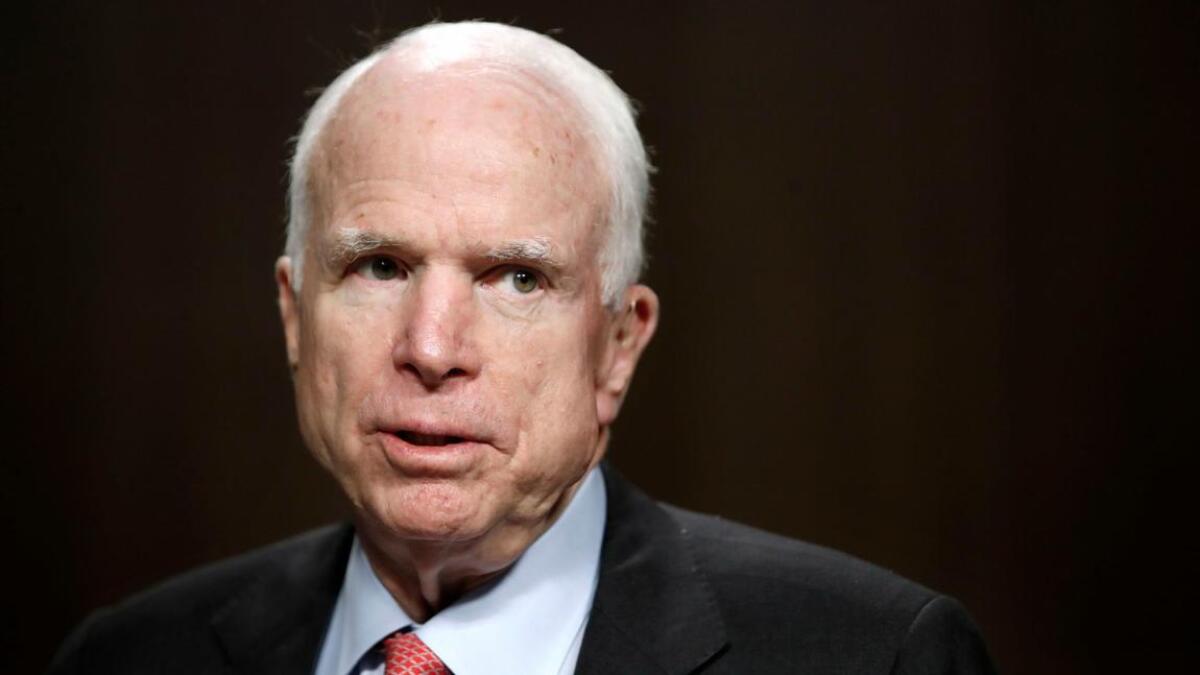
Sen. John McCain (R-Ariz.) dealt a critical blow to Republicans’ last-ditch attempt to roll back the Affordable Care Act on Friday, announcing he will not vote for sweeping repeal legislation that GOP leaders plan to bring to the Senate floor for a vote next week.
“We should not be content to pass healthcare legislation on a party-line basis,” McCain said in a lengthy statement criticizing the GOP rush to pass a repeal bill without any hearings and little public scrutiny.
McCain’s move raises serious questions about whether Republicans have the votes to pass the latest repeal bill, authored by Sens. Lindsey Graham (R-S.C.) and Bill Cassidy (R-La.).
The party, which has 52 votes in the Senate, can lose only two or the bill will fail.
Sen. Rand Paul (R-Ky.) has already said he will oppose the Graham-Cassidy bill, which he has criticized for maintaining too much of the current law’s government spending on healthcare.
And Sen. Susan Collins (R-Maine), a centrist Republican who helped sink the last GOP repeal effort in July, has signaled strong reservations about the current proposal.
McCain also opposed that previous effort, casting a dramatic middle-of-the-night vote against the measure and calling for his colleagues to stop trying to rush through major healthcare legislation.
McCain reiterated those calls Friday in announcing his opposition to Graham-Cassidy.
“As I have repeatedly stressed, healthcare reform legislation ought to be the product of regular order in the Senate. Committees of jurisdiction should mark up legislation with input from all committee members, and send their bill to the floor for debate and amendment,” the veteran lawmaker said.
“That is the only way we might achieve bipartisan consensus on lasting reform, without which a policy that affects one-fifth of our economy and every single American family will be subject to reversal with every change of administration and congressional majority.”
- Share via
In Alabama, the heart of Trump country, many think he’s backing the wrong candidate in Senate race
President Trump will swoop into Alabama on Friday to bolster the campaign of Sen. Luther Strange, a soft-spoken former state attorney general now in danger of losing the seat he was tapped to fill just months ago after Jeff Sessions joined the administration.
But in this conservative state that overwhelmingly supported Trump and prides itself as the heart of Old Dixie, some think the president is backing the wrong man. And they’re not sure his visit will help.
Voter enthusiasm instead runs high for the more Trump-like candidate, Roy Moore, the state’s polarizing former chief justice. His far-right, Bible-quoting views twice resulted in him being forced off the bench for defying higher court decisions, including the U.S. Supreme Court’s ruling in favor of gay marriage. Die-hard supporters have no doubt he will be just as unwavering if they send him to Washington.
The GOP establishment has poured millions of dollars into Strange’s campaign, much from Senate Majority Leader Mitch McConnell’s aligned Senate Leadership Fund.
But a rival group, run by allies of Stephen K. Bannon, the former Trump advisor, backs Moore, turning Tuesday’s GOP runoff into a trial run for several upcoming outsider-versus-establishment contests to be waged in Arizona, Nevada and other states ahead of the 2018 midterm election.
The race also marks a new kind of power struggle for the hearts and minds of Trump voters — one that pits Bannon, an influential figure in the president’s campaign, against Trump himself.
Trump’s endorsement was once seen as making Strange a shoo-in for the job. But now it’s unclear whether voter loyalty to the president can overcome skepticism about “Big Luther,” as Alabamans call the 6-foot-9 senator.
“I was a big Trump supporter -- and still am -- but he’s wrong on this one,” said Jeff Hopper, a gun rights activist who brought his family to hear Moore speak at a Christian high school in Florence, Ala., where cotton grows in fields along the highway.
“Quite frankly I’m a little bit disappointed that Donald Trump has decided to come out on his side.”
- Share via
The Republican tax plan is still more talk than action
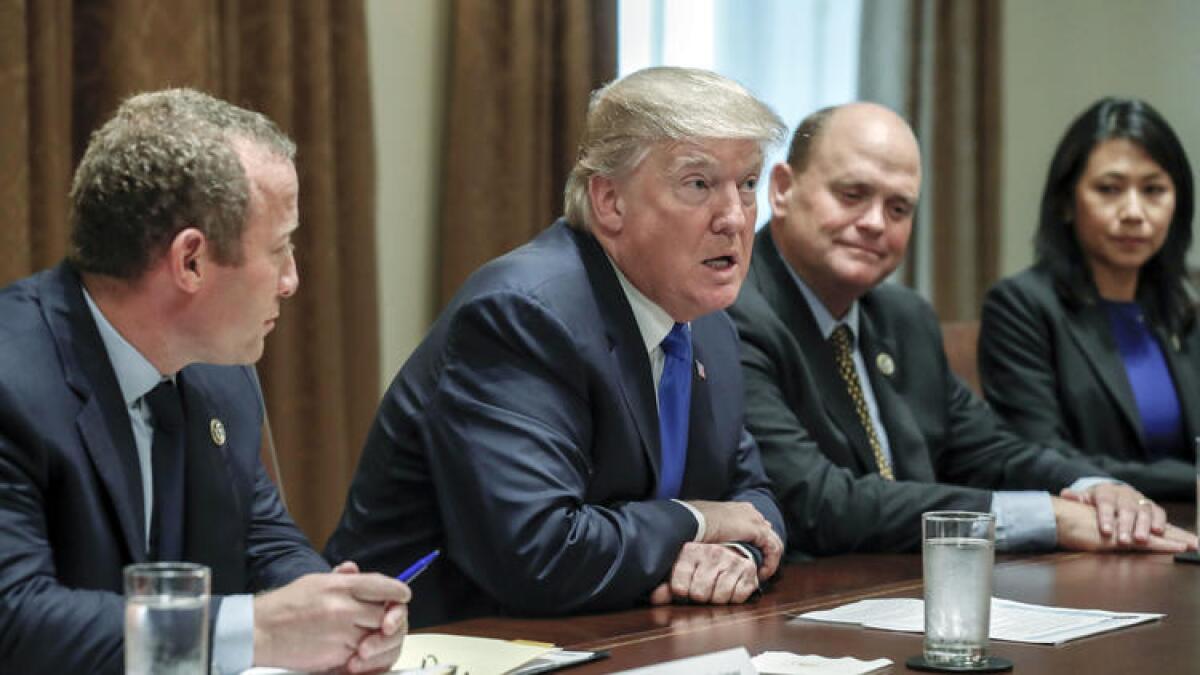
They have a blueprint and principles. They’ve held countless strategy sessions for what could be the biggest tax overhaul in decades.
They even produced a handy desk calendar with daily inspirational messages and helpful tax statistics to drive home the need for reform.
All Republicans need now is an actual plan.
Despite months of promises and what Senate Majority Leader Mitch McConnell calls a “once-in-a-lifetime opportunity,” the GOP-led Congress and White House have yet to agree on how to revamp the tax code, including how much to reduce corporate and individual tax rates, how tax cuts would be paid for or whether they will be offset at all.
“There is no movement on tax reform,” said Rep. Mark Meadows (R-N.C.), chairman of the conservative House Freedom Caucus, after Republicans huddled recently behind closed doors for the latest update.
“I’m sure they’re working, paddling like a bunch of ducks,” he said. “They just need to make some decisions.”
- Share via
‘Dotard’ rockets from obscurity to light up Trump-Kim exchange, spark partisan war of words
President Trump fired off “rocket man.”
North Korean dictator Kim Jong Un, the target of that verbal missile launch, shot back a flurry of taunts, calling America’s leader “a rogue,” “a frightened dog,” a “gangster fond of playing with fire.”
But it was one word that lit up social media, sent countless masses thumbing through dictionaries (or the online equivalent), one word that turned the back-and-forth between the brinksmen into a teachable moment: dotard.
- Share via
Secretary of Education Betsy DeVos rescinds Obama-era guidelines on campus sexual assault
Secretary of Education Betsy DeVos on Friday rescinded controversial Obama-era guidelines that had prodded colleges and universities to more aggressively — some say too aggressively — investigate campus sexual assaults.
The decision left women’s groups worried that victims of sexual assault will lose protections or face intimidation to remain silent, but critics of the former guidelines said the change could lead to a process that also considers the rights of those accused.
The department said it was withdrawing the Obama administration’s policy – which was spelled out in a 2011 letter to schools – because of criticism that it placed too much pressure on school administrators, favored alleged victims and lacked due process for people who had been accused of sexual assault.
“Those documents have led to the deprivation of rights for many students – both accused students denied fair process and victims denied an adequate resolution of their complaints,” the department’s acting assistant secretary for civil rights, Candice Jackson, said in a letter Friday.
Jackson and DeVos have both been criticized for showing support for those who have been accused of sexual assault. Advocates for victims complained that the department has not spent enough time listening to survivors.
The department also released a new question-and-answer statement, replacing one issued by the Obama administration in 2014, to advise colleges and universities about how their responsibilities have changed. It emphasizes providing the same information, rights and opportunities to both parties in a sexual assault investigation.
It also allows schools to facilitate an informal resolution process if both parties agree, rather than adjudicate every case, as currently required.
The letter rescinds any suggested timeline for investigations. The former guidance recommended schools reach a decision in about 60 days, something critics said put too much pressure on administrators, particularly in cases that involved conflicting evidence.
The guidelines still require each school to have a coordinator and to report all incidents of sexual assault as required by the Clery Act, separate guidance from 1990 that remains in place.
And the new guidance gives schools more flexibility for the standard of evidence used to investigate these cases. The previous guidelines suggested using a “preponderance of evidence,” meaning the decision makers were more than 50% sure an assault occurred. Critics said a higher standard should be used, such as “clear and convincing evidence” of an assault, which will now be an option.
UPDATES:
8:38 a.m.: This article was updated with additional details about the new policy.
This article was originally published at 8 a.m.
- Share via
Who are you calling a dotard? Trump keeps the war of words with Kim going
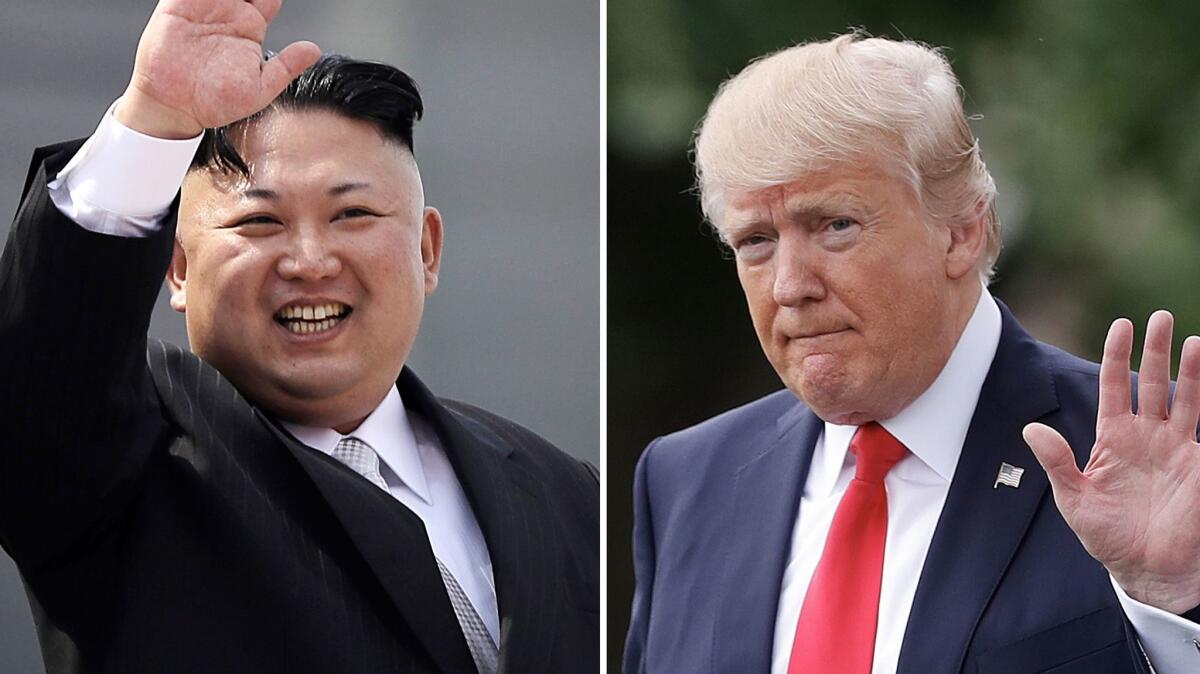
President Trump isn’t going to let Kim Jong Un get the last word.
The North Korean leader continued the spat between Pyongyang and Washington on Friday, calling Trump a “mentally deranged U.S. dotard.”
The U.S. president responded with a Friday morning tweet, labeling Kim “a madman who doesn’t mind starving or killing his people.”
- Share via
Kim Jong Un calls Trump ‘deranged,’ says he will ‘pay dearly’ for his threats
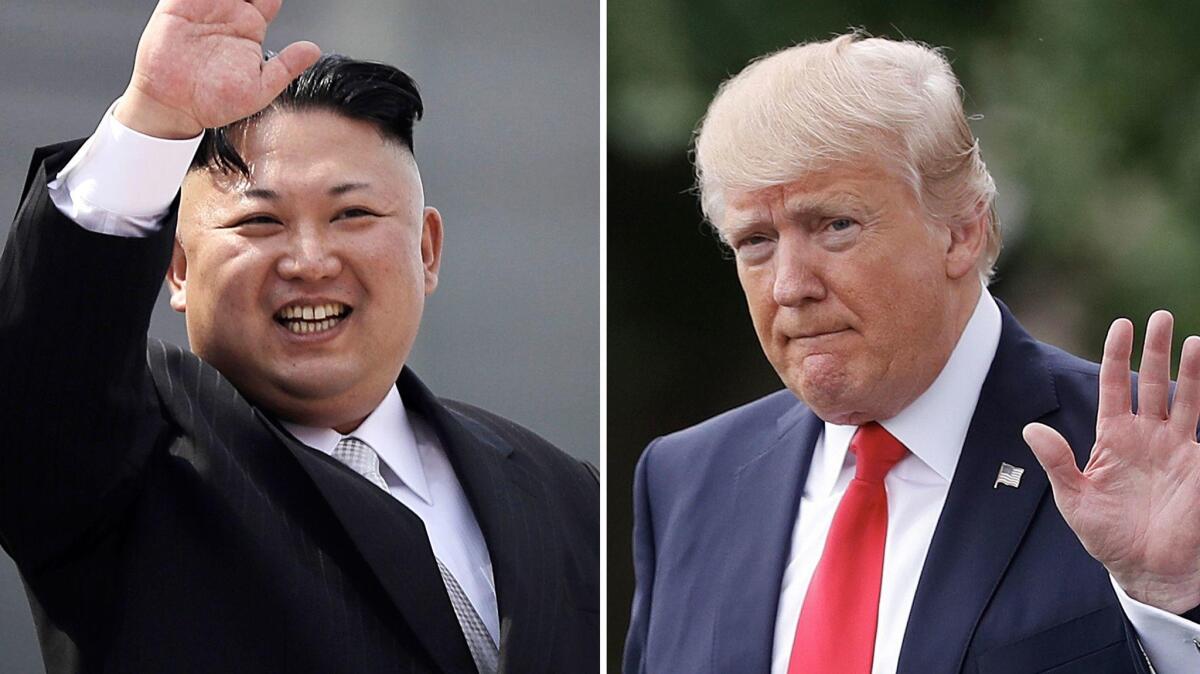
North Korean leader Kim Jong Un called President Trump “deranged” and said that he will “pay dearly” for his threats, in a statement carried by the state news agency Thursday.
The comments came in response to Trump’s combative speech at the U.N. General Assembly on Tuesday.
Kim said that Trump is “unfit to hold the prerogative of supreme command of a country” and described the president as “a rogue and a gangster fond of playing with fire.”
Kim said he is “thinking hard” about his response, but Trump will “pay dearly for his speech calling for totally destroying” North Korea.
- Share via
Trump announces more sanctions against North Korea for its nuclear buildup
President Trump on Thursday announced plans for new sanctions against North Korea as he struggles to find ways to confront that country’s nuclear buildup.
After threatening earlier this week to completely destroy North Korea if it uses its nuclear weaponry against U.S. territory or allies, Trump told reporters he was issuing a new executive order adding more sanctions to those that the United States and allies already have imposed.
He said the measures would target North Korea’s textiles, fishing industry and shipping. In fact, sanctions against those industries are already in place, so it was not clear what was different about the additional ones.
“Do business with the United States ... or the lawless regime” of North Korea, he said.
“We seek ... a complete denuclearization of North Korea,” the president said. Many observers call that standard all but impossible to meet, given the progress of Pyongyang’s nuclear program to date.
Trump, on the margins of the annual United Nations General Assembly, was meeting Thursday with the presidents of Japan and South Korea, the two neighbors of North Korea with the most at stake in the showdown.
Already, the U.S. and the U.N. have imposed tough economic sanctions against North Korea that eat away at its export income, imports and revenue from workers it sends overseas. But none of those measures has curbed efforts by North Korean leader Kim Jong Un to develop intercontinental missiles capable of delivering a nuclear weapon to the United States.
- Share via
Analysis: Trump seeks to reassure loyalists even as he courts deals with Democrats
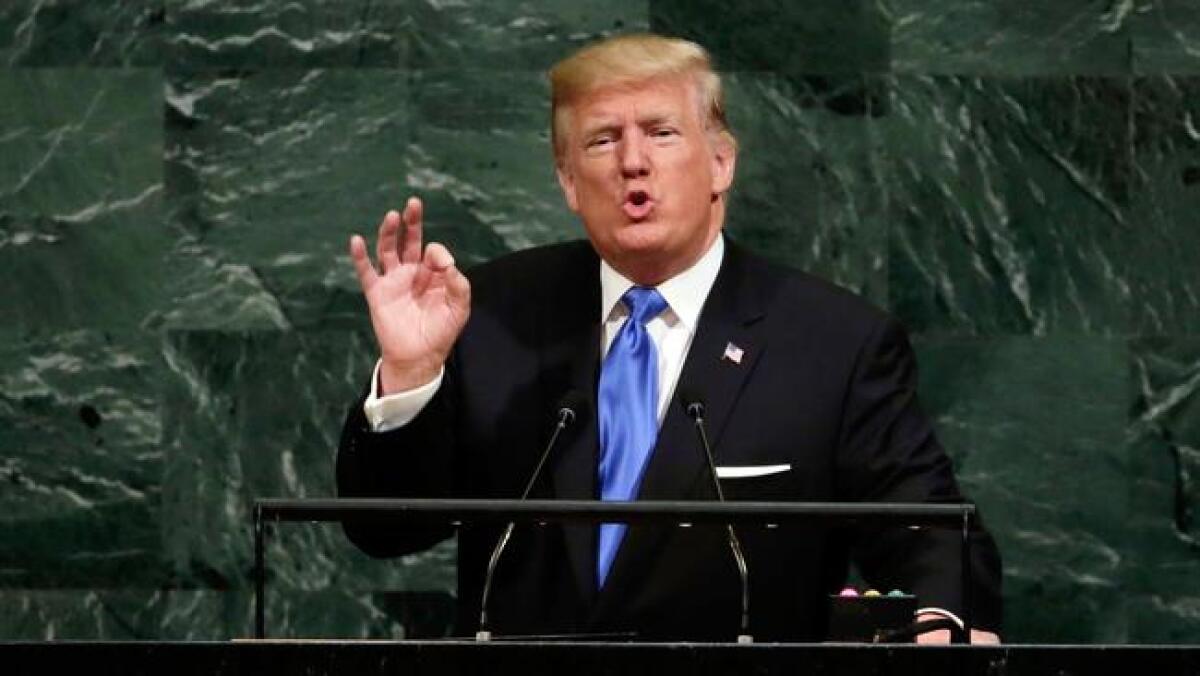
As mainstream media outlets raised questions Tuesday about the wisdom of President Trump labeling North Korean leader Kim Jong Un “Rocket Man” from the lectern at the United Nations, the president’s message-making sped into gear.
“Trump supporters around the country should take pride in President Trump’s strong and principled speech before the world’s leaders at the United Nations today where he expressed profound and unwavering America First principles,” Michael S. Glassner, the executive director of Trump’s reelection organization, said in an email blasted out shortly after Trump’s U.N. address.
“The President described a new vision, putting Americans first…and condemning those who support rogue nations and terrorists.”
For two weeks Trump has been in a well-publicized dalliance with Democrats, cutting deals on the federal budget and debt ceiling and seeking an agreement on immigrants who entered the country illegally as young children. At the same time, he has sought to blunt any retribution from his supporters by flooding them with messages focused on why they backed him in the first place.
- Share via
Trump offers condolences and assistance to Mexico after devastating earthquake

President Trump extended his condolences to Mexico’s president and offered assistance on Wednesday, a day after an earthquake devastated central Mexico, including the capital, Mexico City, and killed more than 200 people.
Trump and President Enrique Peña Nieto had a lengthy telephone call in the morning, according to the White House, after Trump first tweeted his concern the night before -- prompt reactions that contrasted with his tardy response to disaster in Mexico earlier this month.
“The president offered assistance and search-and-rescue teams, which are being deployed now,” White House Press Secretary Sarah Sanders said in a statement describing the call, and “also pledged to continue close coordination with Mexico as the two countries respond to the recent earthquakes and hurricanes.”
Trump did not extend condolences to Mexico for a week after a deadly earthquake in the southern states of Oaxaca and Chiapas on Sept. 7. Trump blamed poor cellphone reception in the mountains of Mexico for the delay in reaching Peña Nieto.
Yet partly out of pique, by then Mexico had rescinded its offer to help the United States deal with damage in Texas and Louisiana from Hurricane Harvey, and focused instead on earthquake response.
Vice President Mike Pence also spoke of Mexico’s plight, in remarks at the U.N. Security Council on Wednesday.
“Our hearts and our prayers are with the people of Puerto Rico and the people of Mexico,” he said, referring to damage from Hurricane Maria in Puerto Rico and Mexico’s earthquake casualties.
On Twitter on Tuesday night, Trump wrote, “God bless the people of Mexico City. We are with you and will be there for you.”
- Share via
Federal Reserve will start reducing its stockpile of bonds
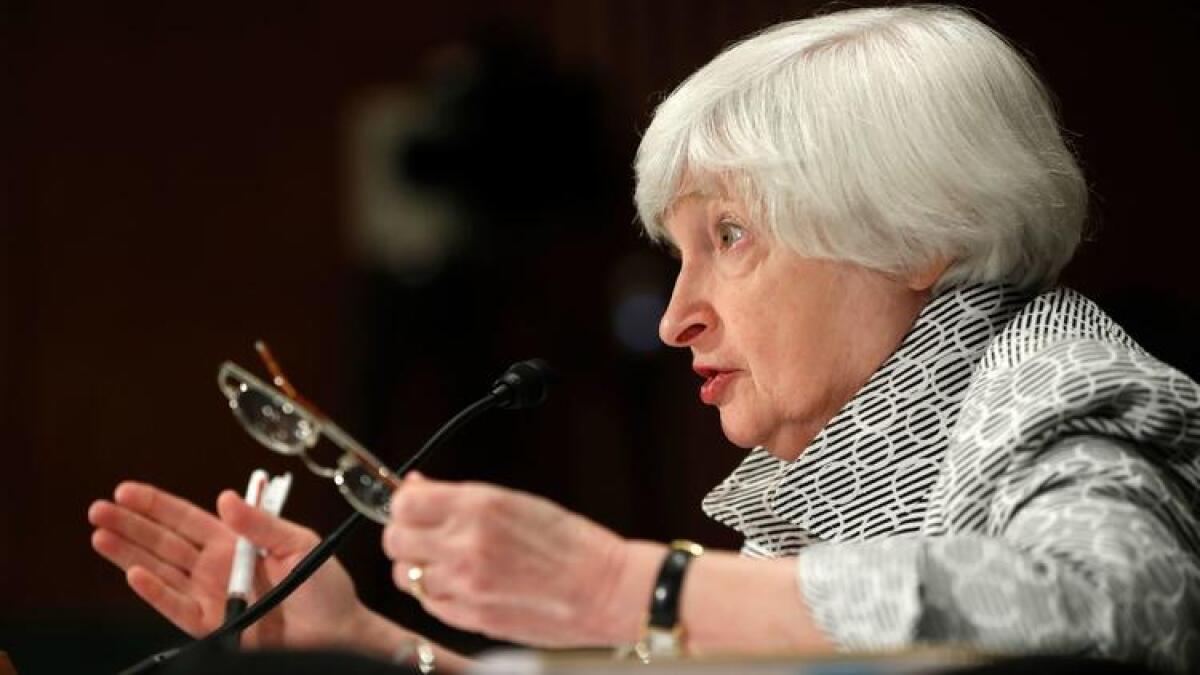
The Federal Reserve announced on Wednesday that it would start slowly reducing the trillions of dollars in bonds it purchased to try to stimulate the economy, another milestone in the central bank’s efforts to return to a normal monetary policy after the Great Recession.
The long-awaited reduction in the Fed’s $4.5-trillion balance sheet comes amid great uncertainty at the central bank. There are several vacancies on the Fed board and there could be a change in leadership early next year if President Trump decides not to renominate Chairwoman Janet L. Yellen.
On top of that, the devastation caused by recent severe hurricanes could make it difficult for Fed policymakers to get a solid read on the economy in the coming weeks as they decide whether to enact another small hike in a key interest rate.
“Hurricanes Harvey, Irma and Maria have devastated many communities, inflicting severe hardship,” Fed officials said in a policy statement Wednesday after a two-day meeting.
“Storm-related disruptions and rebuilding will affect economic activity in the near-term, but past experience suggests that the storms are unlikely to materially alter the course of the national economy over the medium term,” the Fed statement said.
- Share via
Obama says Republican healthcare plan would inflict ‘real human suffering’
The latest Republican effort to repeal the Affordable Care Act would inflict “real human suffering” on millions of Americans, former President Barack Obama said Wednesday, speaking out in public defense of his signature healthcare reform effort.
The law has led to major increases in the number of Americans with healthcare coverage, Obama said, speaking in New York at an event on global development sponsored by the Bill and Melinda Gates Foundation.
“When I see people trying to undo that hard-won progress for the 50th or 60th time,” he said, “it is aggravating.”
The Republican efforts would make coverage unavailable to cancer survivors, pregnant women, children with asthma and others with existing medical problems, he said, “without any ... common sense rationale.”
“It’s certainly frustrating to have to mobilize every couple months to keep our leaders from inflicting real human suffering on our constituents,” he added. “But typically, that’s how progress is won, and how progress is maintained.”
- Share via
Comedian skewers Republican Graham-Cassidy healthcare bill as failing to pass the ‘Jimmy Kimmel test’
Late-night comedian Jimmy Kimmel skewered the new Republican healthcare plan, a potentially devastating development as Senate GOP leaders struggle for support ahead of a possible vote next week.
Kimmel waded into the healthcare debate earlier this year when he choked up on TV recounting his newborn son’s heart condition — and the high costs of healthcare that he can pay, but he knows other Americans cannot.
The “Jimmy Kimmel Live” host has become one of the most prominent celebrities to publicly advocate preserving Obamacare’s insurance protections — so much so that Republicans themselves have aspired to meet “the Jimmy Kimmel test.”
It says that patients like the child born with a congenital disease would get the care they need, with no caps on insurance coverage for pre-existing conditions, regardless of costs.
On Monday night, Kimmel said the new bill from Sen. Lindsey Graham (R-S.C.) and Sen. Bill Cassidy (R-La.) — a one-time guest on the show who coined the Kimmel test phrase — failed the standard.
“This new bill actually does pass the Jimmy Kimmel test but a different Jimmy Kimmel test,” the comedian said in his opening monologue.
“With this one, your child with the pre-existing condition will get the care he needs if, and only if, his father is Jimmy Kimmel. ... ,” he said. “Not only did Bill Cassidy fail the Jimmy Kimmel test, he failed the Bill Cassidy test.”
He said: “This guy, Bill Cassidy, just lied to my face.”
The reaction was swift and fierce, especially because Kimmel tweeted the Capitol switchboard number for viewers to call their senators urging a “no” vote.
Democrats and others opposed to the new bill quickly shared the message, ensuring phone lines lit up at Congress.
Cassidy, a medical doctor who has worked tirelessly on the new bill, mounted a vigorous defense Wednesday and said Kimmel was mistaken.
“I am sorry he does not understand,” the senator said on CNN. “Under Graham-Cassidy-Heller-Johnson, more people will have coverage, and we protect those with pre-existing conditions.”
Experts analyzing the just-released bill, which Republicans are trying to pass before a Sept. 30 deadline, say it would more likely cut coverage for millions of Americans.
Under the plan, states that expanded Medicaid coverage for lower-income Americans with Obamacare would see their funding reduced and distributed more evenly with those that did not.
States also would have more leeway to apply for waivers from the kinds of Obamacare protections against spending caps and lifetime limits that were a cornerstone of the Affordable Care Act.
Republicans have not yet secured the 50 votes needed from their slim 52-seat majority for passage.
Key GOP senators who opposed an earlier overhaul — Sen. John McCain (R-Ariz.), Sen. Susan Collins (R-Maine) and Sen. Lisa Murkowski (R-Alaska) — have not said whether they will support the new bill.
Sen. Rand Paul (R-Ky.) has said he will oppose it, and others may join him.
Kimmel’s monologue could prove pivotal in influencing the debate.
- Share via
An exercise in civil disobedience gets three congressmen arrested in New York
Sitting in the middle of Fifth Avenue got three congressmen hauled away by New York City police on Tuesday afternoon during a demonstration in front of Trump Tower to protest the president’s immigration policy.
Reps. Raúl M. Grijalva (D-Ariz.), Luis V. Gutierrez (D-Ill.) and Adriano Espaillat (D-N.Y.), along with New York City Council Speaker Melissa Mark-Viverito, were among a group of about 10 protesters taken into custody, according to postings on social media.
“We’re making it clear to Trump, GOP & Dems: we will continue peaceful fight for #Dreamers & immigrants as long as it takes,’’ Guiterrez posted on Twitter in explanation of the protests.
Photographs showed the protesters sitting in the middle of the street holding a white banner, as a cordon of police stood above them. Trump was believed to be in Trump Tower after addressing the United Nations earlier in the day.
- Share via
White House names former NFL player to lead initiative for historically black colleges
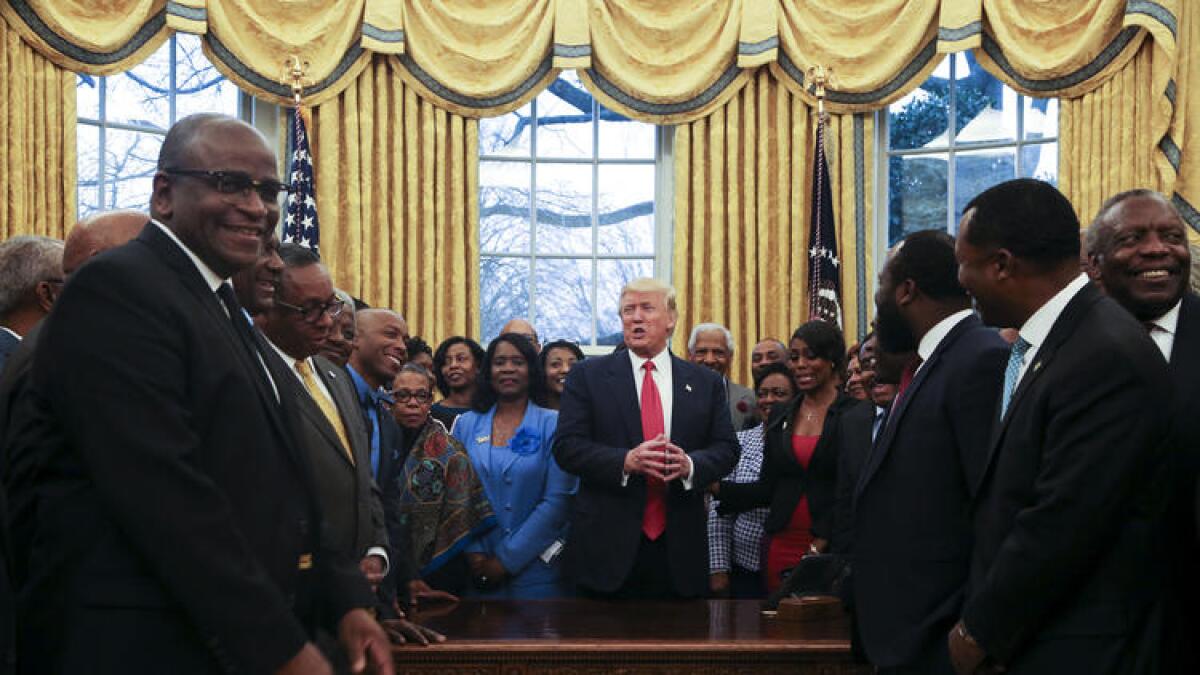
Amid criticism that it hasn’t lived up to its commitment to historically black colleges, the Trump administration has named Johnathan M. Holifield, a former NFL player, author and entrepreneur, to lead a White House initiative on the issue.
Advocates applauded the appointment and said they look forward to working with Holifield, who played for one season with the Cincinnati Bengals, in 1989. But some are still skeptical and called for more substantive changes, particularly a reversal of proposed budget cuts and a greater commitment to Title III of the Higher Education Act, which helps institutions of higher education support low-income students.
Holifield’s appointment was announced Monday at the annual White House conference for presidents and stakeholders at historically black colleges and universities, or HBCUs. Some attendees said they hoped the event would be a first step to more cooperation with the administration.
- Share via
Trump is all in for GOP healthcare bill; sponsor Graham allies with ‘Darth Vader’ (a.k.a. Steve Bannon) for support
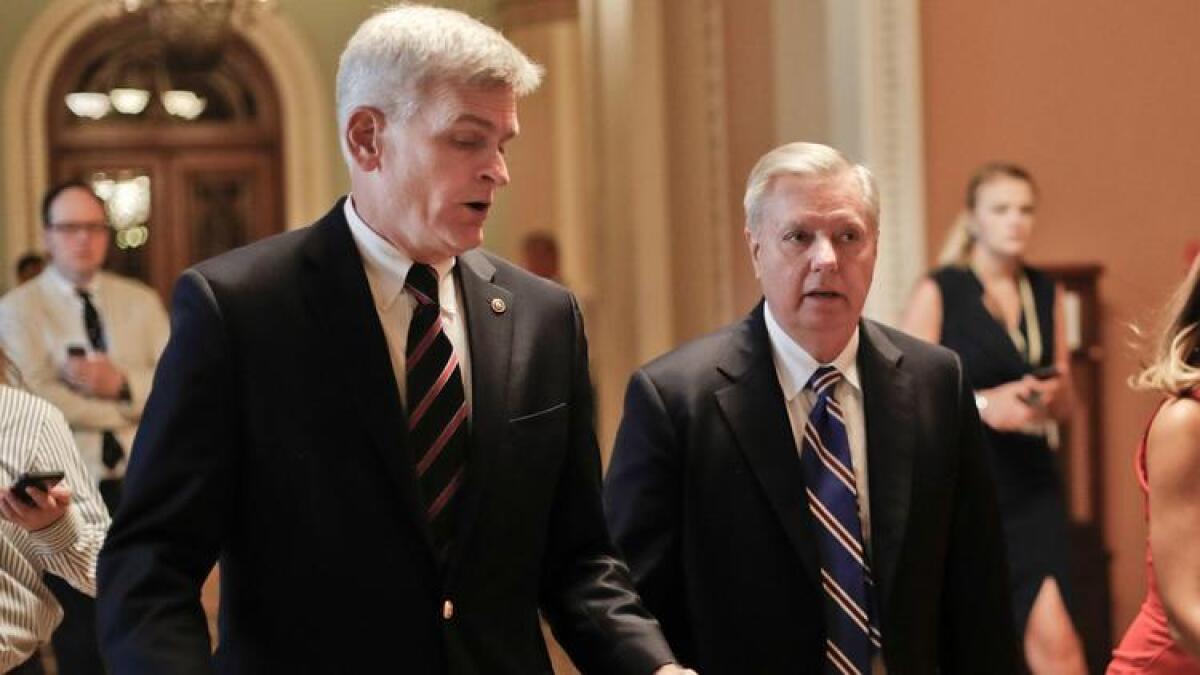
President Trump is making a big push to revive the Republican healthcare overhaul days before a Senate deadline, dispatching Vice President Mike Pence from New York back to Washington on Tuesday to tell GOP senators: “This is the moment.”
Senate Republicans have until Sept. 30 to pass their latest legislation, from Republican Sens. Bill Cassidy of Louisiana and Lindsey Graham of South Carolina, with 50 votes plus Pence as the tie-breaker. On Oct. 1, the start of a new fiscal year, the threshold reverts to 60 votes — an impossible hurdle since there are 52 Republicans and the Democratic caucus is solidly opposed.
They face building pressure from angry conservative activists pushing Republicans to keep their promise to “repeal and replace Obamacare.” But opponents of the bill, including major medical and patient associations, have mobilized against it.
Pence, who was in New York with Trump and other senior administration officials to attend the U.N. General Assembly meeting, returned to the Capitol to tell Republican senators: “Now is the time. We have 12 days,” according to a media pool report from Air Force Two.
Trump and House Speaker Paul D. Ryan, a Wisconsin Republican, both phoned Pence during his flight from New York. Graham told reporters on Pence’s plane that Trump had called him on Monday evening to urge action.
Cassidy and Graham have been working to salvage the party effort for an alternative health insurance program after the spectacular collapse last month of an earlier Republican bill to undo President Obama’s 2010 Affordable Care Act.
Graham said Tuesday he has made an alliance with “Darth Vader” — referring to former Trump advisor Steven K. Bannon — for support to see the bill to passage. Bannon, who was portrayed as the villain on NBC’s “Saturday Night Live,” is back to running the website Breitbart, which is influential among conservatives, after being pushed out of the White House.
“I have got Alan Greenspan, Jeb Bush and Steve Bannon” behind this bill, Graham said. “If anyone can do better, I’d like to meet them.”
Even though some senators have been working separately on bipartisan legislation to improve the Affordable Care Act by stabilizing the health insurance marketplace, Pence planned to tell Republican senators that House Republicans would not support those efforts.
- Share via
Bipartisan group of governors voice opposition to latest Obamacare repeal effort in Congress
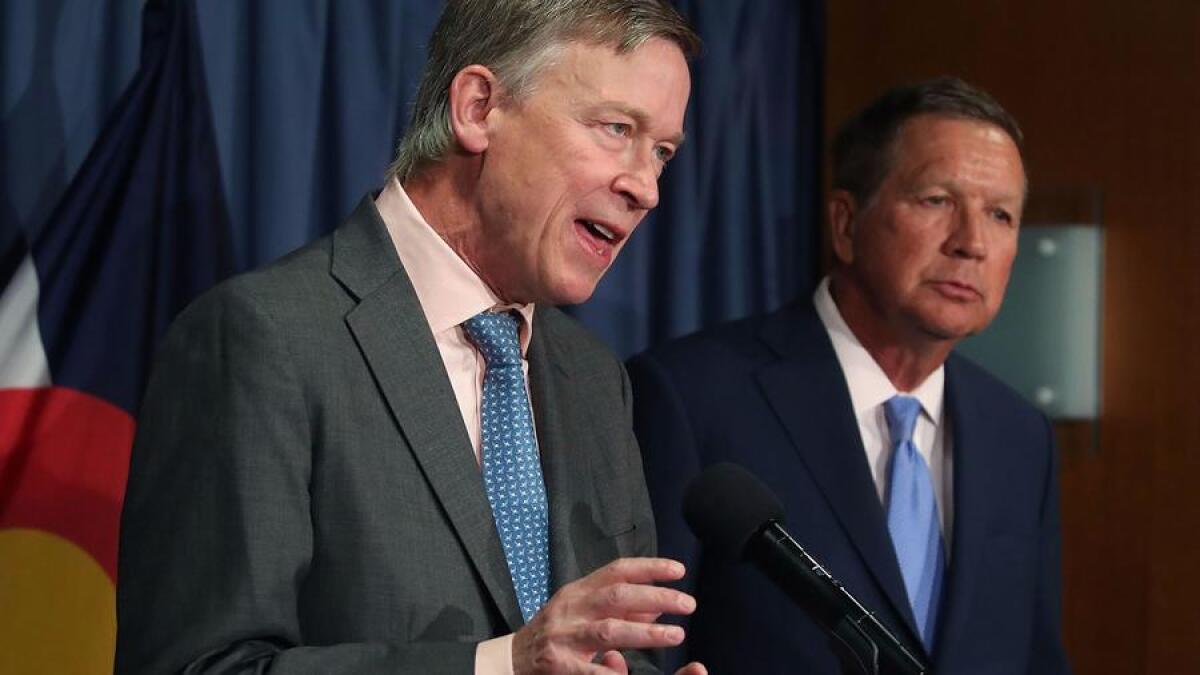
The latest Republican-led effort to repeal the Affordable Care Act has some resistance outside Washington: a bipartisan group of governors.
On Tuesday, nearly a dozen governors, including Bill Walker of Alaska, signed a letter opposing the new repeal legislation sponsored by Sens. Bill Cassidy (R-La.) and Lindsey Graham (R-S.C.) that in recent days has gained momentum in Congress.
The move by Walker could influence his state’s senior senator, Lisa Murkowski, a key vote who has been silent on whether she supports the new legislation. In July, Murkowski, a Republican, voted with Sens. Susan Collins (R-Maine) and John McCain (R-Ariz.), in opposition to the last Obamacare repeal effort.
Walker’s opposition comes a day after Arizona Gov. Doug Ducey said he supports the legislation. (For his part, McCain, who has not said if he supports the new repeal bill, has said his vote would be influenced by Ducey’s position.)
In voicing their opposition, the group, led by Govs. John Hickenlooper (D-Colo.) and John Kasich (R-Ohio), denounced the legislation for being crafted behind closed doors.
“Legislation should receive consideration under regular order, including hearings in health committees and input from the appropriate health-related parties,” the governors wrote in a letter to congressional leaders.
Since the summer the bipartisan group of governors has expressed concerns about deep cuts to Medicaid in their states, which, among other things, helps provide funding for drug addiction treatment.
On Monday, the Congressional Budget Office said that it would not be able to produce a full analysis of the Cassidy-Graham bill, including cuts to Medicaid, for several weeks.
- Share via
More Navy officers fired for collisions at sea that killed 17 U.S. sailors
Two senior Navy officers were fired Monday due to a “loss of confidence in their ability to command” after two collisions with civilian ships in the western Pacific killed 17 sailors at sea, the Pentagon said.
Rear Adm. Charles Williams, commander of the warships on patrol in the Asia-Pacific region, and Capt. Jeffrey Bennett, commander of guided missile destroyers in the region, were the latest leaders removed since the Navy launched an investigation last month into the deadly accidents.
Defense Secretary James N. Mattis told reporters at the Pentagon he was confident in how the Navy was examining the mistakes that have shaken the military and political leadership. In all, four U.S. warships had collisions or ran aground in the Pacific this year.
The Navy has “a tradition of holding officers accountable, and they’ll do what they think is necessary,” he said.
In addition to the loss of life in the Navy, Mattis said he was concerned about a string of aviation crashes and other accidents during training exercises that have killed or injured more than 50 troops this year.
“We’re going to look at what happened on the demolition range and we’re going to look at what happened at seamanship on a ship and we’re going to look at what happened when an aircraft came out of the air,” he said.
A U.S. Army special operations service member was killed Thursday and several others were injured during a training incident at Fort Bragg, N.C.
A day earlier, 15 Marines were injured during exercise after their amphibious landing vehicle caught fire at Camp Pendleton.
“What has caused the compilation of these coming in?” Mattis said. “Right now I don’t have that broader knowledge.”
Mattis focused much of his comments on the Navy accidents because so many sailors died.
The Navy has fired several commanders related to the deadly collisions, including Vice Adm. Joseph P. Aucoin, commander of the Japan-based 7th Fleet that oversees all operations in the Asia-Pacific region
Chief of Naval Operations Adm. John Richardson, the Navy’s top officer, ordered a sweeping review last month to determine why trained crews on U.S. warships carrying radars and other high-tech sensors failed to avoid collisions while underway.
Richardson also announced a rare “operational pause” to give time to the Navy to assess its policies and procedures.
The stand-down was announced hours after the U.S. guided-missile destroyer John S. McCain collided on Aug. 21 with the Alnic MC, a Liberian-flagged oil and chemical tanker that is nearly three times its size.
Ten sailors were killed in the accident, which occurred at the entrance to the Strait of Malacca, one of the world’s busiest shipping lanes, near Singapore.
Two months earlier, on June 17, the guided-missile destroyer Fitzgerald was rammed by a much larger Philippine-flagged container ship, the ACX Crystal, about 50 nautical miles from the U.S. Navy base in Yokosuka, Japan.
Seven sailors were killed in that accident. The commander and executive officer of the Fitzgerald were later relieved of command.
A guided-missile cruiser, Lake Champlain, collided with a South Korean fishing vessel on May 9 off the Korean Peninsula. Another guided-missile cruiser, Antietam, ran aground Jan. 31 and gushed oil into Tokyo Bay.
- Share via
U.S. hasn’t yet seen the need to shoot down North Korean missiles
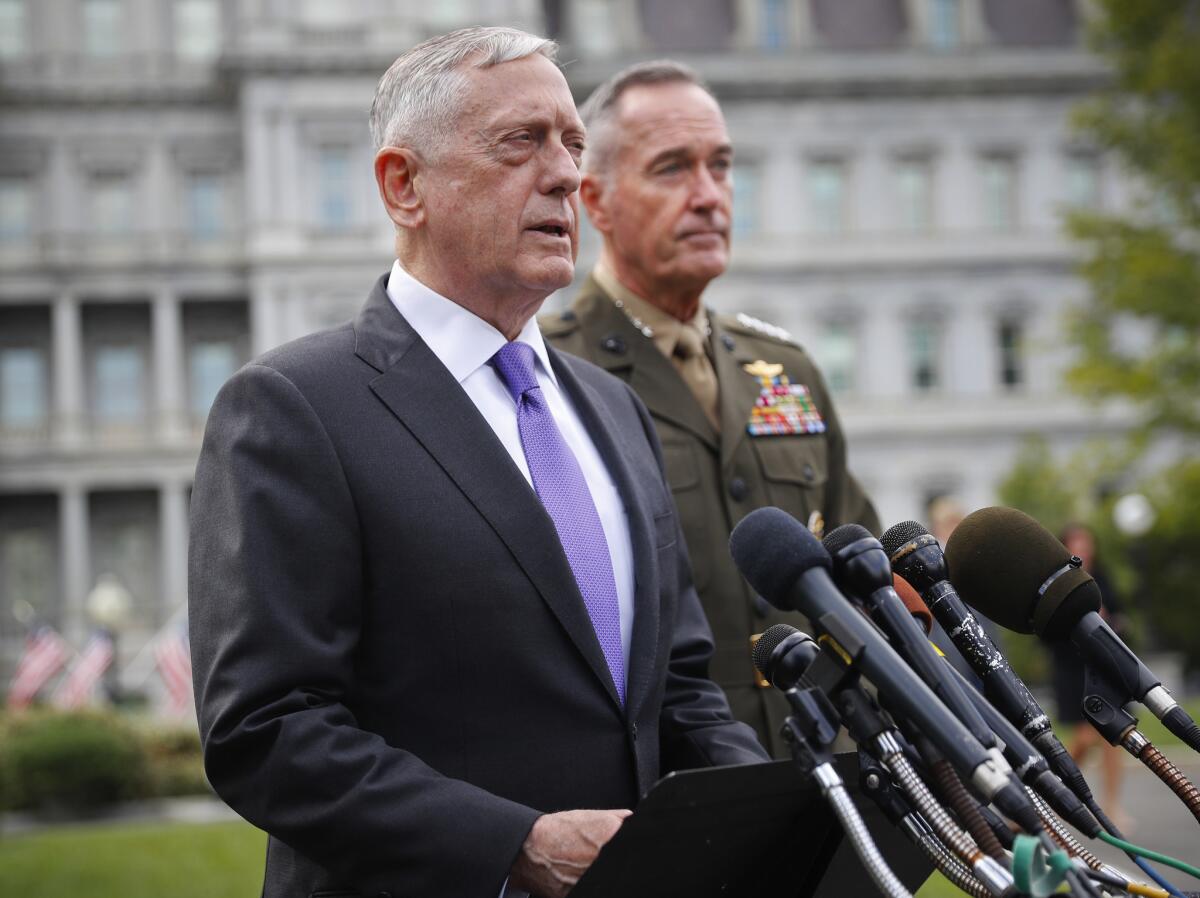
Defense Secretary James N. Mattis said Monday that the U.S. military has not attempted to shoot down ballistic missiles test-launched by North Korea because they have not been on a trajectory to hit U.S. or allies’ territory.
The comments come after the underground test of a nuclear bomb earlier this month and days after North Korea launched its second missile in less than a month that flew over northern Japan.
The intermediate-range missile was launched Friday near the isolated nation’s capital, Pyongyang, soaring for about 2,300 miles before splashing down in the Pacific Ocean. The test demonstrated that the U.S. territory of Guam is now in attack range.
Mattis said these launches are testing the U.S. military to see how much North Korea can get away with before triggering a response.
“They are intentionally doing provocations that seem to press against the envelope to see how far they can push without going over some kind of line in their minds that would make them vulnerable,” he told reporters at the Pentagon.
“The bottom line is: The missiles, were they to be a threat – whether it be to U.S. territory, Guam, [or] obviously Japan’s territory -- that would elicit a different response from us,” he said.
The U.S., Japan and South Korea have missile defense systems surrounding North Korea, including at sea. Analysts have stressed that knocking a missile out of the sky with interceptors is difficult and has been often been described as “hitting a bullet with a bullet.”
North Korea has conducted 15 missile tests in 2017 and more than 60 since Kim Jong Un took power in 2011.
Thus far, U.S. response to the launches has been sanctions, which have largely cut off Pyongyang from the rest of the world economy, and “show of force” exercises.
On Sunday, U.S. Air Force flew B-1 bombers and F-35 stealth fighter jets over the Korean Peninsula, along with allied fighter jets from South Korea and Japan.
- Share via
Trump returns to New York, guarded by police cars, helicopters and garbage trucks

A motorcade arrives at Trump Tower in New York ahead of the United Nations General Assembly. (Barbara Demick / Los Angeles Times)
New Yorkers generally hate the week of the U.N. General Assembly, when heads of state from around the world gather in the city, snarling traffic and inconveniencing those who actually live here.
This year it means the return of New York’s not-so-favorite local son, President Trump, who received just 18% of the vote in his hometown. Police have started barricading a vast swath of Midtown, stretching from the United Nations headquarters to Trump Tower, which is about 15 blocks away on Fifth Avenue.
The building, where Trump maintains a triplex penthouse, was surrounded Sunday by police cars -- and strangely, an effective if low-tech barricade of New York City garbage trucks. Helicopters whirred overhead as a motorcade arrived.
This will be Trump’s third and probably longest trip home since his inauguration. The last two times Trump visited the city, he was greeted by large crowds of protesters with signs reading, “New York Hates You.” This trip is unlikely to be much friendlier.
The New York Police Department and Secret Service would not answer questions about the number of personnel providing security for the visit or the costs involved. Trump has said previously that he avoids coming home because of the security costs.
He arrived Sunday from Bedminster, N.J., where he has a weekend home at one of his golf clubs.
- Share via
Iran’s supreme leader warns U.S. against making a ‘wrong move’ on the nuclear deal
Supreme Leader Ayatollah Ali Khamenei warned Sunday that Iran would respond strongly to “any wrong move” by the United States on the multilateral nuclear deal struck in 2015.
President Trump has threatened to declare Iran in violation of the landmark agreement next month, which could pave the way for additional U.S. economic sanctions against the Islamic Republic.
Iranian leaders have accused Trump of trying to sabotage the deal in which Iran agreed to shelve its nuclear program in exchange for relief from international sanctions.
“Every day they [American officials] play a new trick or expose a new side of their viciousness,” Khamenei said at a graduation ceremony at a police academy, Mehr News reported.
The ongoing war of words comes as world leaders prepare to gather at the United Nations this week. The U.N. nuclear watchdog has said Iran has met its obligations under the nuclear agreement and is cooperating with international inspectors.
The Trump administration has sent mixed signals on the nuclear agreement, which Trump once called “the worst deal ever.”
Last week, Trump effectively endorsed the deal by extending one of its terms, a waiver on certain U.S. sanctions against Iran. But he also accused Iran of violating “the spirit of the deal” and renewed a threat to declare that Iran was not complying with its terms, a move that would give Congress 60 days to decide whether to reimpose sanctions.
“They have violated so many different elements, but they’ve also violated the spirit of that deal,” Trump said last week. “And you will see what we’ll be doing in October. It will be very evident.”
Trump administration officials have argued that Iran must allow U.N. inspectors access to military sites, but Iranian leaders have rejected the idea, saying it would violate their country’s sovereignty.
On Friday, firebrand cleric Ahmad Khatami said in the closely watched weekly sermon at Tehran University that “nowhere in the text…of the [nuclear deal] is it mentioned that military sites can be inspected.”
- Share via
Tillerson: U.S. may close embassy in Cuba after mysterious sonic attacks
The Trump administration is considering closing down the U.S. Embassy in Cuba after nearly two dozen American diplomatic staffers or family members suffered health effects that were blamed on suspected sonic attacks, Secretary of State Rex Tillerson said Sunday.
“We have it under evaluation,” Tillerson said in an interview aired on CBS’ “Face the Nation,” when asked about calls by some GOP lawmakers to shutter the embassy in Havana. “It’s under review.”
An embassy shutdown would mark an abrupt reversal of the warming ties between the two nations since diplomatic relations were restored in 2015. President Trump has criticized the diplomatic opening, but he has not moved to break ties again.
Tillerson called the health problems stemming from the apparent sonic attacks “a very serious issue with respect to the harm that certain individuals have suffered,” adding: “We’ve brought some of those people home.”
Those health effects have reportedly included hearing loss, nausea, headaches and ringing of the ears.
Five Republican senators have urged Tillerson to shut down the U.S. embassy and expel all Cuban diplomats from the United States unless the Havana government takes “tangible action.”
Two Cuban diplomats stationed in Washington have already been expelled in response to the attacks, which only recently came to light after having gone on for months.
The Havana government has repeatedly denied any responsibility for the attacks, which also have affected the Canadian embassy in Havana.
- Share via
Haley: Trump didn’t intend to harm British bombing investigation
The U.S. ambassador to the United Nations, Nikki Haley, said President Trump was “upset and passionate” about last week’s subway bombing in London when he tweeted shortly after the attack about a “loser terrorist” who had been “in the sights of Scotland Yard.”
Haley, in an interview that aired Sunday on ABC’s “This Week,” said the president had not intended to hinder British authorities in their response to the bombing by seemingly disclosing that an attacker or attackers had previously come to the attention of the Metropolitan Police.
“Look, the president would not want to do any harm to the investigation – let’s be clear,” Haley said. “There was no ill intent.”
Trump has previously tweeted out controversial statements about other terrorist attacks in the United Kingdom. He stirred indignation among many Londoners by attacking the city’s mayor, Sadiq Khan, after a June attack in London’s Borough Market that left seven dead.
Critics said Trump seized upon an attempt by Khan to calm the public about a stepped-up police deployment, using an out-of-context quote to imply that the mayor had said the attack – rather than the visible armed police presence in its aftermath – was no cause for alarm.
After a bombing in May at an Ariana Grande concert in the northern city of Manchester that left 22 people dead, British authorities were infuriated by a leak of important intelligence that had been shared by them with U.S. officials, as is customary between the two close allies.
Asked about Trump’s comments on the latest attack, British Prime Minister Theresa May, in an interview that was pre-taped and aired separately on ABC, declined to directly criticize the president. But she said: “I don’t think it’s helpful for anyone to speculate on what it an ongoing investigation.”
The rush-hour bombing on Friday at the Parsons Green station and a subsequent stampede left 30 people injured, British officials said. The National Health Service said all but one of those hurt had been released from the hospital.
British officials said Sunday that a second man, age 21, had been arrested late Saturday in West London in connection with the attack, but provided few details. Earlier, an 18-year-old man was arrested at the port of Dover, from which ferries depart for continental Europe.
- Share via
Trump retweets meme of him hitting Hillary Clinton with golf ball, knocking her down
In the latest instance of President Trump seeming to revel in the notion of physical attacks against perceived enemies, the president retweeted an animated GIF showing him hitting a golf ball that then knocks down his onetime rival Hillary Clinton.
Critics swiftly responded. Rep. Adam Schiff (D-Burbank), appearing on ABC’s “This Week, said: “It’s distressing to have a president that frankly will tweet and retweet things as juvenile as that.”
The original tweet, from a user whose Twitter handle consists of an expletive, was sent last week and retweeted Sunday by the president, who is spending the weekend at his New Jersey golf property. Here is what he retweeted:
A former Trump campaign strategist, David Urban, brushed aside the controversy. “Retweets do not equal endorsements,” he said on CNN’s “State of the Union,” leading to a sharp exchange.
The president has previously taken to Twitter to retweet animations including one that depicted him pummeling a figure with a CNN logo superimposed on his head. Another presidential Twitter share last month – later deleted – showed a train hitting a person, again with a CNN logo imposed on the figure’s head.
Trump associates have previously dismissed criticism of such retweets, suggesting they were intended to be humorous.
Clinton is out with a new book about the campaign, and Trump has repeatedly used Twitter to deride her as a sore loser.
In the first part of the animation Trump retweeted on Sunday, the president is seen in golf attire, teeing off. The second shows footage of Clinton tripping as she boards a plane, with the video altered to show her being struck in the back with a golf ball.
The tweet refers to “Donald Trump’s amazing golf swing” and uses the hashtag #CrookedHillary, the then-candidate’s most-used epithet for his Democratic opponent.
- Share via
Trump derides North Korea’s leader as ‘Rocket Man’
With tensions running high over North Korea, President Trump on Sunday mocked its mercurial leader, Kim Jong Un, referring to him as “Rocket Man.”
Trump, who is spending the weekend at his New Jersey golf property, said on Twitter that he had spoken Saturday evening with South Korea’s president, Moon Jae-in, and that the two had discussed Pyongyang’s latest actions, including the firing of two missiles that overflew Japan and a test detonation of the North’s most powerful nuclear device yet.
The White House was more circumspect in a readout of the call, saying that in their conversation, Trump and Moon had “committed to continuing to take steps to strengthen deterrence and defense capabilities.”
Meanwhile, national security advisor H.R. McMaster said on ABC’s “This Week” that Trump was determined to contain the threat posed by North Korea. Of Kim, he said: “He is going to have to give up his nuclear weapons, because the president has said that he is not going to tolerate this regime threatening the United States and our citizens with a nuclear weapon.”
Asked whether that meant Trump was contemplating a strike against North Korea, McMaster said: “He’s been very clear about that – that all options are on the table.”
Secretary of State Rex Tillerson, however, emphasized that military action would be a last resort. Interviewed on CBS’ “Face the Nation,” he said the Trump administration’s strategy centered on a “peaceful pressure campaign” against Kim’s government.
“If our diplomatic efforts fail, though, our military option will be the only one left,” Tillerson said.
North Korea is expected to be a major topic as the United Nations General Assembly holds its annual session this week.
- Share via
White House may reverse itself on withdrawing from Paris climate deal
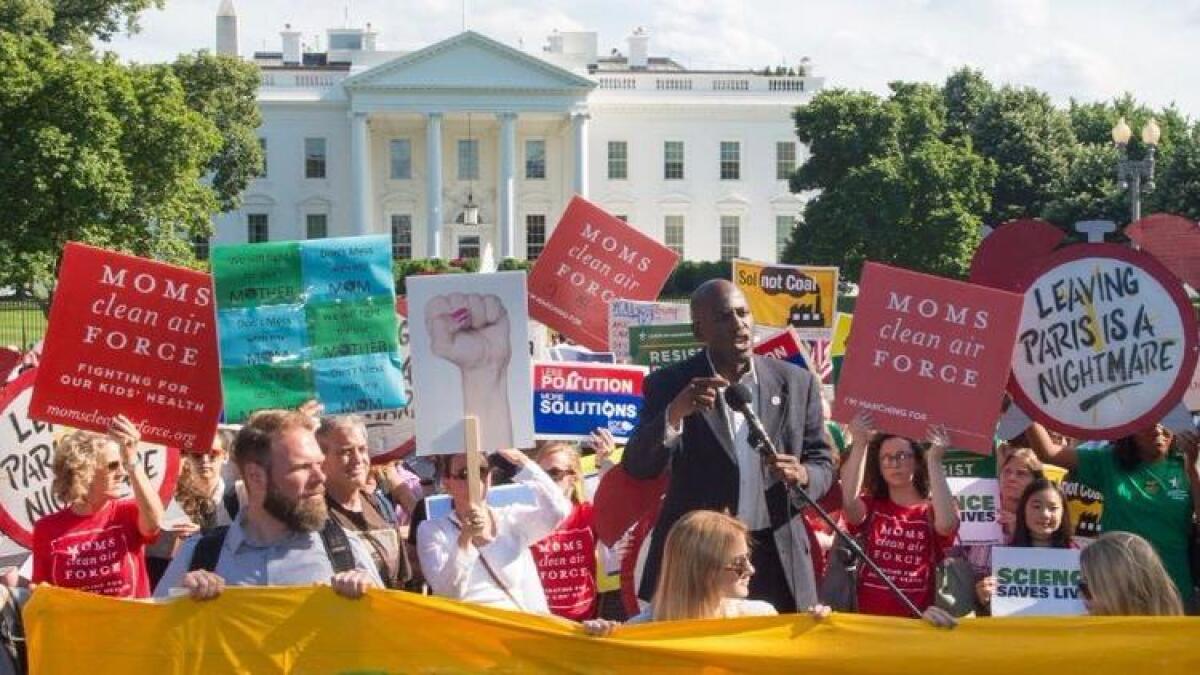
A European official said Saturday the Trump administration has softened its stance on the landmark Paris climate accord and may not completely withdraw after all.
If true, this would mark yet another reversal of a Trump campaign promise, one of the most controversial.
But the White House quickly attempted to rebut the report.
“There has been no change in the United States’ position on the Paris agreement,” said Lindsay Walters, a presidential spokeswoman. “As the president has made abundantly clear, the United States is withdrawing unless we can re-enter on terms that are more favorable to our country.”
At a ministerial summit in Montreal, where the United States participated as an observer, the European Union’s top climate official said the administration had backed away from its announcement in June that it was walking out of the historic 2015 agreement.
The U.S. “stated that they will not renegotiate the Paris accord, but they try to review the terms on which they could be engaged under this agreement,” Miguel Arias Canete said.
It was not immediately clear how far that statement would go. Trump, when announcing his decision to withdraw, was adamant about the U.S. ignoring goals on limiting greenhouse-gas emissions and other elements believed to contribute to global warming.
At the time, it was seen as another abrogation of the United States’ preeminent role as a global leader.
But Trump argued the deal was bad for U.S. businesses and that it made Washington foot too much of the bill.
Global warming is an issue with renewed political currency after Hurricane Harvey left epic floods in Houston and the Gulf Coast and Hurricane Irma devastated parts of the Caribbean and left millions in Florida without power. Scientists say warmer waters may have intensified the force of the storms.
- Share via
Popular priest’s speech at Catholic University is canceled because of protests over his support for gays
Catholic University of America has abruptly canceled a speech by a well-known, popular Jesuit priest because of protests over his support for gay and lesbian Catholics.
Father James Martin, at-large editor of the Jesuit-run America magazine and an oft-quoted commentator on Catholic affairs, was scheduled to speak at an alumni event at the university’s Theological College on Oct. 4.
The college, based in Washington, revoked the invitation following protests from conservative Catholic groups over Martin’s new book, “Building a Bridge: How the Catholic Church and the LGBT Community Can Enter into a Relationship of Respect, Compassion, and Sensitivity.”
In it, the prolific author advocates for acceptance of and dialogue with gays and lesbians.
Conservatives mounted what the university called a social-media campaign against Martin and his appearance at the school.
Father John Zuhlsdorf, who runs a blog called Father Z, repeatedly labeled Martin a “homosexualist activist” and called for Catholic institutions not to host him.
Martin has said he was planning a lecture on Jesus and his teachings, not on gay Catholics or on his book.
University President John Garvey said the school was not in agreement with the Theological College’s decision.
“Universities and their related entities should be places for the free, civil exchange of ideas,” Garvey said in a statement posted on the university’s website. “Our culture is increasingly hostile to this idea.”
Jesuits often represent the more progressive ranks of the Roman Catholic Church. Pope Francis, though socially conservative, is a Jesuit -- the first ever to be selected pontiff -- and has also advocated a more tolerant position toward gays.
Francis recently named Martin as a consultant to the Vatican’s communications department.
- Share via
Dealing with Democrats? Protecting ‘Dreamers’? That’s just fine with these Trump supporters
Donald Trump’s tough talk on illegal immigration was a big part of the reason Dave Hagstrom and many others in this booming Phoenix suburb supported him for president. “Walls make good neighbors,” Hagstrom said.
So when the president moved this week to cut a deal — with Democrats no less — to block the expulsion of 800,000 immigrants brought to the U.S. illegally as children, was Hagstrom disappointed?
Not at all.
“If you were to deport them, where would they go?” Hagstrom, 60, a car-warranty manager, asked on his way to a Bible-study dinner at an upscale shopping mall. “To send them across the border would be inhumane almost. There’s no life for them there.”
- Share via
Trump and Democrats are gambling on each other, and hoping their core supporters will trust them to cut deals
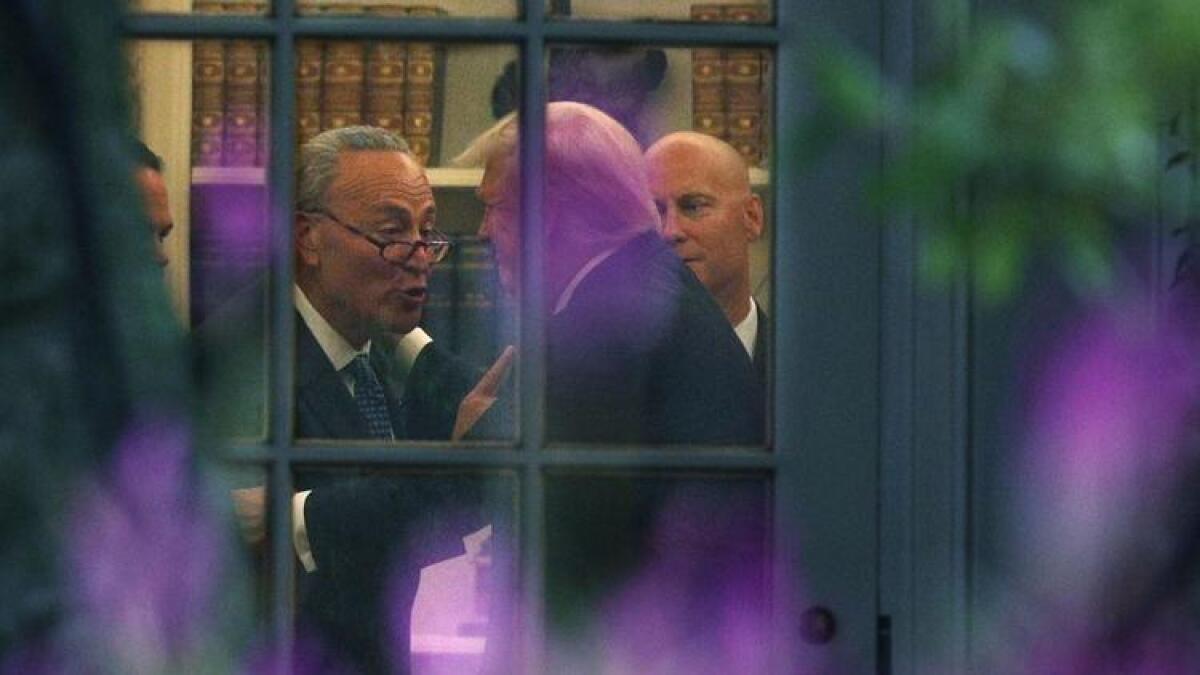
President Trump, with his second deal in as many weeks with Democratic leaders, has upended the political calculations of both of their parties: Many Republicans are left fuming of his betrayal, while some Democrats have begun cautioning party leaders against getting too cozy with a president they’ve vowed to resist.
Trump is betting that he can play the two sides against each other and finally notch some legislative achievements, in turn reassuring centrists and improving his dismal poll ratings. The risk, as the president’s nationalist allies already are warning, is that Trump will alienate some among his loyalists even as his opponents remain resolutely hostile, and he sinks further.
With the latest deal, Trump could not have chosen an issue more likely to test his core supporters. After winning election on an anti-immigration platform, he has agreed with Democrats to seek a law protecting from deportation roughly 800,000 young immigrants brought to the country illegally as children — a group of whom he formerly said flatly, “They have to go.”
- Share via
Trump says travel ban ‘should be far larger’
President Trump signaled he would like his controversial travel ban expanded, writing on Twitter on Friday that his ban on travelers from several Muslim-majority countries “should be far larger, tougher and more specific” but complaining that enlarging it would not be “politically correct.”
Trump wrote the tweet in response to news of an explosion in London on an underground train during morning rush hour. British authorities said they were treating the incident as a terrorist act.
Trump went further than British officials and said the perpetrators were “in the sights” of Scotland Yard investigators before the attack. There is no public evidence to support this claim.
In what seemed to be a response to Trump’s tweet, London Metropolitan Police said in a statement, “any speculation is extremely unhelpful at this time.”
Later Friday morning Trump called the London attack “a terrible thing,” while he was in the Rose Garden watching an 11-year-old boy from Falls Church, Va., mow the White House lawn.
“It keeps going and going, and we have to be very smart and we have to be very, very tough—perhaps we’re not nearly tough enough,” he said in response to a question from a reporter.
Trump said he had been briefed on the London attack, and said he had been told about “new risks of things happening.”
Trump has a chance to widen the travel ban later this month.
The 90-day ban is set to expire on Sept. 24, and Department of Homeland Security officials are considering whether to expand the ban to other countries, keep it the same, or take countries off the list.
Trump administration officials are also reviewing what new vetting procedures for travelers should be put into place, including requiring visa applicants from some countries to submit to checks of their social media accounts. Trump has called similar procedures “extreme vetting.”
Currently, foreign nationals are banned from six countries — Iran, Syria, Sudan, Somalia, Libya and Yemen. Iraq was dropped from the banned countries list in March in exchange for accepting Iraqi nationals being deported from the U.S.
Refugees without close ties to the U.S. are also barred entry until Oct. 24 under the ban.
Trump administration officials issued a revised travel ban in March that was designed to resolve the legal problems that had led to Trump’s original order being blocked in January. The Supreme Court is set to hear a challenge next month of the revised ban.
- Share via
Trump throws a wrench into any immigration deal, saying ‘chain migration’ can’t be included
Just over a day after agreeing with Democratic leaders to make an immigration deal, President Trump on Friday took a hard line against allowing close family members to follow new immigrants, a position that could stymie bipartisan legislation.
Trump wrote on Twitter that any immigration bill cannot include “chain migration,” a term used by advocates of limiting immigrants to criticize how new U.S. citizens can sponsor family members for legal status.
If Trump sticks to that position, it could sap Democrats’ support for Wednesday’s tentative agreement between Trump and the top two Democrats in Congress to seek a law giving legal status to roughly 800,000 so-called Dreamers. Those are mostly young people brought to the country illegally as children.
Immigration hardliners, including in the White House, are concerned that a law might allow beneficiaries to eventually become U.S. citizens, and they in turn would sponsor their parents and close relatives for lawful permanent residence, enlarging the number of legal immigrants in the country.
The surprise maneuvering follows Trump’s announcement last week that he would phase out Dreamers’ protection from deportation under the five-year-old Obama administration program known as DACA -- for Deferred Action for Childhood Arrivals. The program allows them to work and attend college after a federal background check. Beneficiaries’ two-year work permits and deportation deferrals will begin expiring in March if Congress doesn’t act.
A significant majority of Americans, including many Republicans, support and sympathize with the group, and Trump immediately sought to allay the impact of his order, reflecting a campaign promise, to end DACA.
Trump came to an agreement over dinner Wednesday night with House Minority Leader Nancy Pelosi and Senate Minority Leader Charles E. Schumer to write those DACA protections into law in exchange for increased spending on border security, though not for his promised southern wall.
Trump campaigned on cracking down on illegal immigration, ending DACA, as well as reducing legal immigration. He now faces intense pressure from his core supporters, some of whom contend he is backing off those promises.
- Share via
Trump revives his controversial claim equating white supremacists and anti-racism protesters in Charlottesville clashes
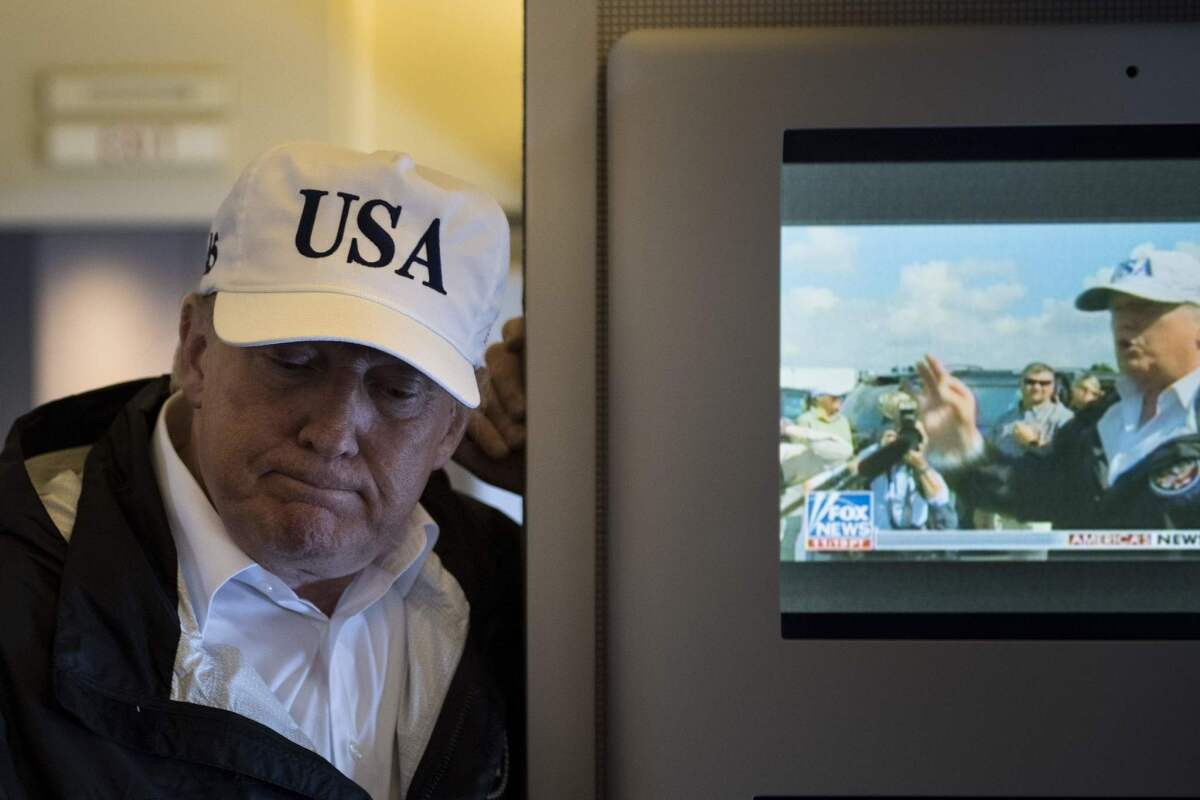
President Trump on Thursday renewed his widely condemned claim that people protesting white supremacists in Charlottesville, Va., last month shared equal blame for the violence with the neo-Nazi groups who rallied there against the town’s removal of a Confederate statue.
There are some “pretty bad dudes on the other side also,” Trump told reporters on Air Force One, referring to anti-fascist demonstrators who faced-off with white supremacists.
Trump’s revival of the controversy was all the more surprising given his context: He was describing his meeting at the White House on Wednesday with Sen. Tim Scott of South Carolina, the Senate’s only black Republican, who confronted the president about his post-Charlottesville remarks.
Scott, recounting his remarks to the president, said he disputed any such comparison equating neo-Nazis and anti-racism protesters and reviewed the brutal history of the white supremacist movement in the United States.
Scott’s message didn’t seem to have sunk in with the president, who mentioned to reporters the anti-fascist movement known as “antifa.” Some of its demonstrators have been violent.
“Especially in light of the advent of antifa, if you look at what’s going on there, you know, you have some pretty bad dudes on the other side also,” Trump said.
He added, “You look at really what’s happened since Charlottesville — a lot of people are saying, in fact a lot of people have actually written, ‘Gee, Trump might have point.’ ”
Not Scott.
He reacted to Trump’s latest remarks on Charlottesville by rebuking the president in a prepared statement: “Antifa is bad and should be condemned, yes, but white supremacists have been killing and tormenting black Americans for centuries. There’s no realistic comparison. Period.”
After the Aug. 11 and 12 protests in Charlottesville, Trump’s statements shifted widely between suggesting a moral equivalency between both sides and belatedly condemning the neo-Nazis, who marched through Charlottesville with torches and assault rifles. One anti-racism protester was killed, and 19 were injured when a car driven by an alleged white supremacist plowed into a crowd of the counter-protesters.
Trump said he had a “great talk” with Scott, who also urged him to add high-ranking African Americans to his staff.
The White House released a photo of the two men talking in the Oval Office, but its statement mistakenly identified the senator as “Tom” -- prompting much derision in social media.
- Share via
‘There for you 100%,’ Trump tells Floridians; elderly plight in spotlight after nursing home deaths
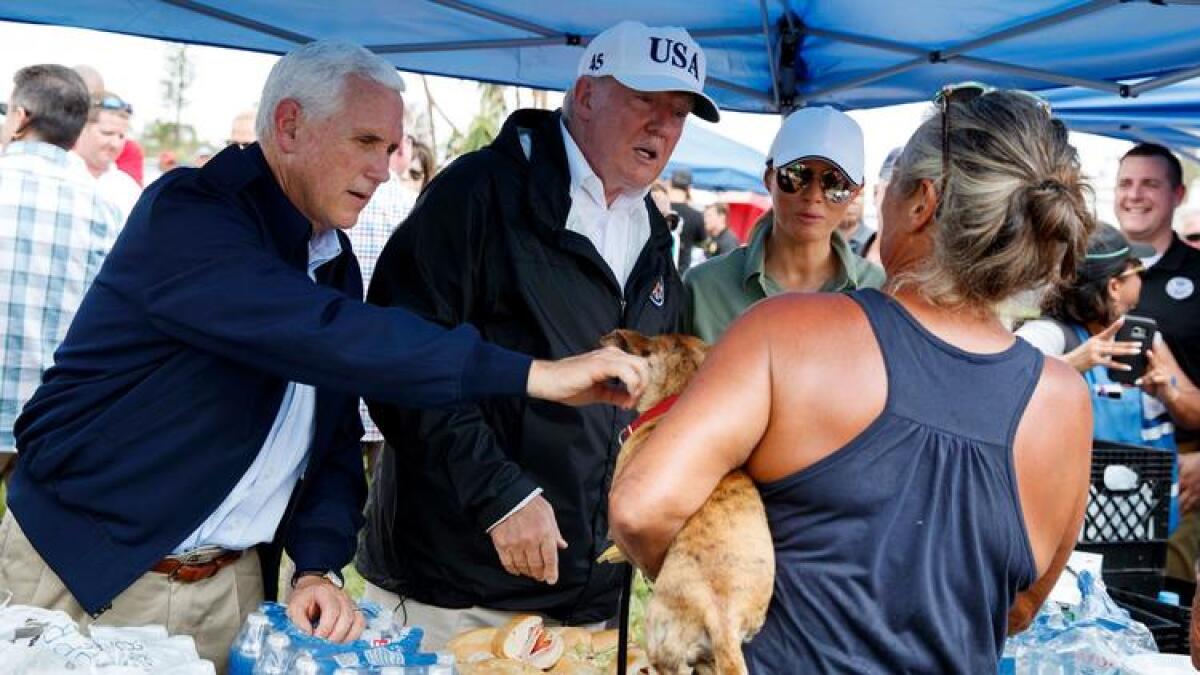
President Trump told Florida hurricane victims his administration is “there for you 100%” as officials moved urgently to safeguard the state’s vulnerable elderly and restore power to millions of homes and businesses still without electricity.
The president and First Lady Melania Trump arrived aboard Air Force One in Fort Myers on the peninsula’s southwestern Gulf coast, then traveled by helicopter to Naples, 40 miles away. It was Trump’s third disaster-zone visit in less than three weeks.
In a Naples mobile home park, not far from where then-Hurricane Irma made its second landfall in Florida, Trump shook hands with residents, quizzed people about how they were faring and joined volunteers serving lunch.
“We love the people of Florida,” he said, pledging that he would be back to monitor recovery progress. “We are there for you 100% … These are special, special people.”
- Share via
As much remains up in the air over DACA deal, Trump faces scorn from some on far right
In the last day, President Trump has alienated many conservatives — including some of his most prominent supporters — by working with Democrats and sowing confusion about where he stands on illegal immigration.
Throughout the campaign, Trump energized his base with promises that he would build a massive wall along the U.S.-Mexico border and that Mexico would pay for it.
This month, he delighted his most ardent backers by announcing that he was canceling the Deferred Action for Childhood Arrivals program, or DACA, which was created by President Obama and gives legal residence to 800,000 young people — known as “Dreamers” — who were brought to the U.S. illegally as children.
But on Wednesday night, Democrats announced they had made a deal with Trump to protect the Dreamers and improve border security without building the wall.
Trump has yet to make clear exactly where he stands. But some big-name conservatives are already weighing in.
Publications on the right were no kinder to the president. Two headlines capture the mood:
Deal or no deal for Trump on DACA – who knows? (Weekly Standard)
“For a Republican president with majorities in both houses of Congress who ran on building a border wall and repealing ‘Obama’s executive amnesty,’ there seems to be little policy upside to the burgeoning deal,” Michael Warren writes. “For a goal prized by Democrats — enshrining the Obama-era protections for these illegal immigrants — Trump and Republicans got little of what they wanted. How did this happen?”
No amnesty is a good amnesty (Breitbart)
“President Trump is the last president who will ever have a chance to make the right decision on immigration,” writes the conservative columnist Ann Coulter, who staunchly opposes DACA and has expressed deep disappointment in the president she once backed. “But if he fails, Donald Trump will go down in history as the man who killed America.”
- Share via
A week after Mexico’s magnitude 8.1 earthquake, Trump calls to send condolences
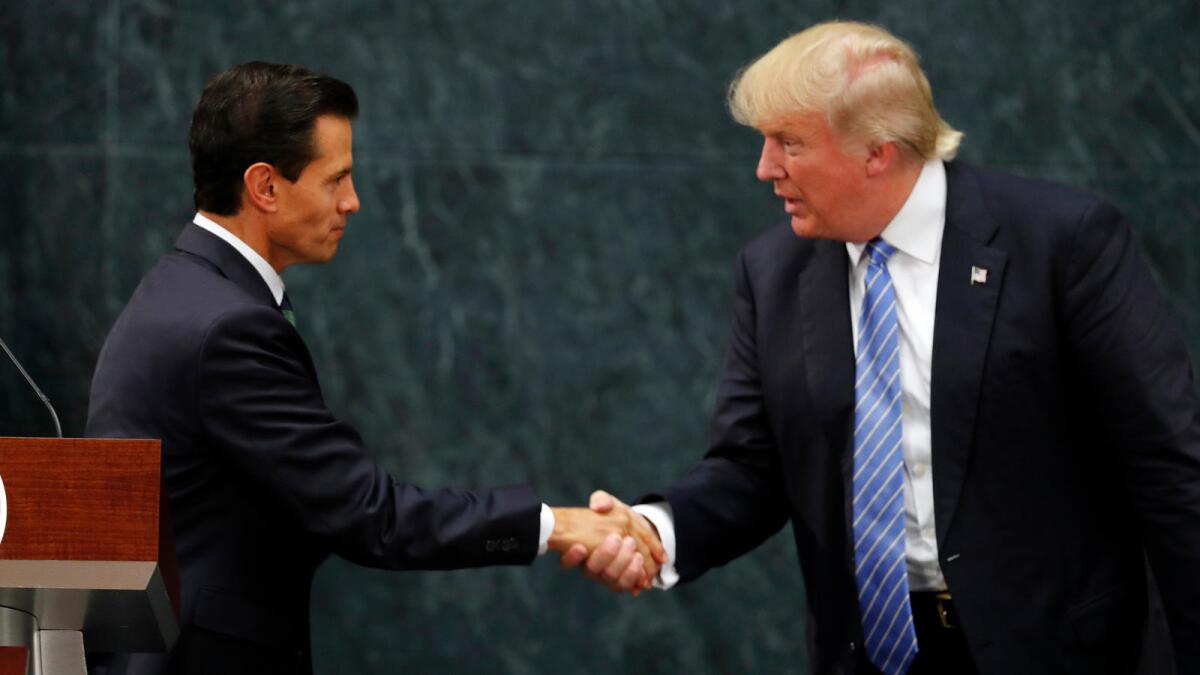
President Trump called Mexican President Enrique Peña Nieto on Thursday to offer condolences for last week’s magnitude 8.1 earthquake, which toppled hundreds of buildings and killed dozens of people in southern Mexico.
Speaking to reporters on Air Force One after surveying damage from Hurricane Irma in Florida, Trump said he had just “had a good talk” with the Mexican leader.
Trump said it had been “impossible to reach” Peña Nieto for days because the Mexican president was in a remote part of the country with a bad phone connection.
Trump’s weeklong delay in acknowledging the earthquake or sending condolences had angered many in Mexico, who hold the U.S. president in low esteem after his repeated attacks on their nation.
On Twitter on Thursday, many mocked Trump’s explanation that Peña Nieto had been difficult to reach.
Peña Nieto has traveled multiple times in recent days to the states of Oaxaca and Chiapas, where the earthquake damage was worst. But he also spent considerable time in Mexico City, including on Wednesday, when he presided over a military event.
In a statement, Peña Nieto’s office said he and Trump had a productive conversation.
It said Peña Nieto stressed the importance of finding a permanent solution for the 700,000 or so beneficiaries of the Deferred Action for Childhood Arrivals program, which protects from deportation immigrants who have been living in the U.S. illegally since they were children.
Trump announced last week that he was ending the program. But he has said in recent days that he hopes to work with Congress to pass a law that would protect so-called Dreamers.
“President Trump was optimistic that the U.S. Congress would reach a solution for the young people who are now covered by this program,” Peña Nieto’s office said.